















Sector leaders have expressed deep concern following the Government’s announcement that the Health and Care Worker visa route will be closed to new overseas applicants for adult social care roles: this decision they say risks serious consequences for a sector already under immense pressure.
In a white paper published earlier this week the government has set out how it plans to bring down historically high levels of net migration by putting an end to recruitment of overseas workers.
Those who are working on an existing visa will be able to extend their stay and care providers are being encouraged to fill vacancies from the existing pool of overseas care workers already sponsored to work legally in the UK, although
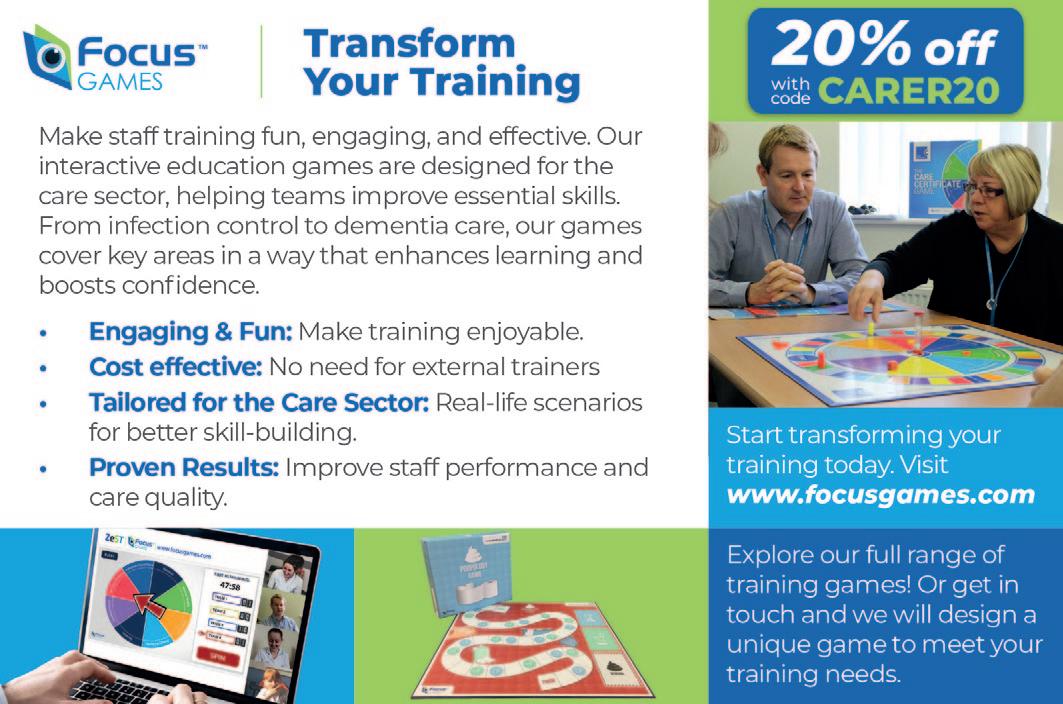
it is unclear what happens after the 2028 transition period for the new policy.
The decision has triggered an angry backlash across the sector who say adult social care is already stretched to breaking point and still relies heavily on international staff to keep services running.
Currently there are around 131,000 adult social care vacancies, and international recruitment has been a critical tool in maintaining recruitment levels.
While concerns around exploitation must be addressed, the proposed solution - ending overseas recruitment entirely – removes a vital workforce supply without establishing a viable domestic alternative.
(CONTINUED ON PAGE 3...)
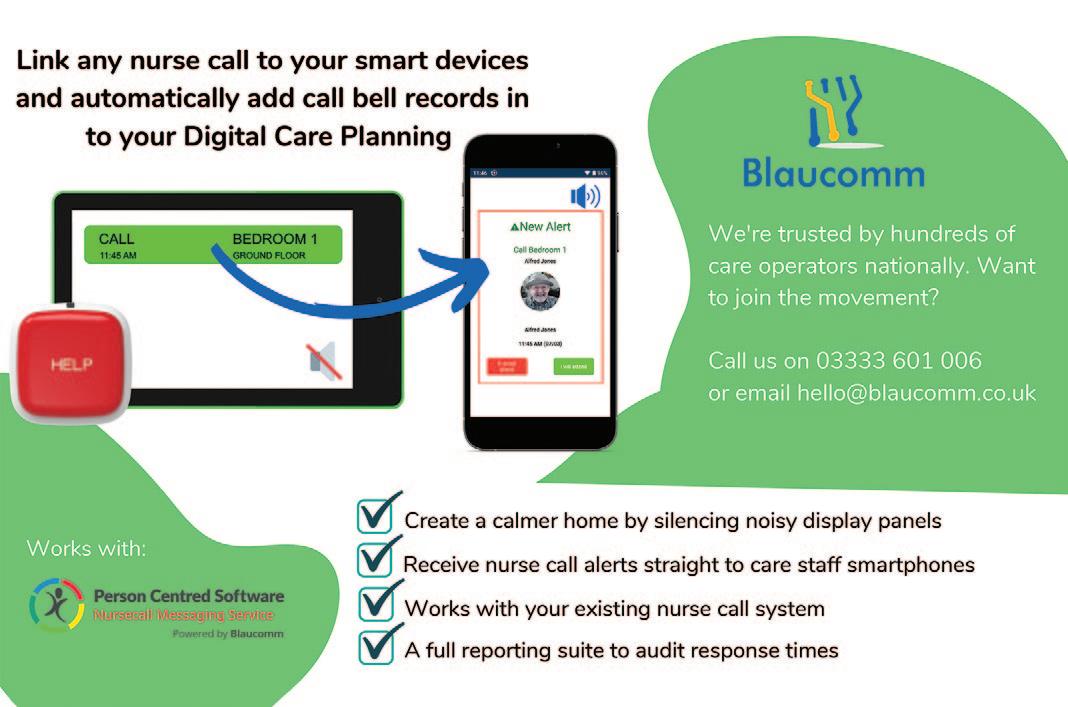
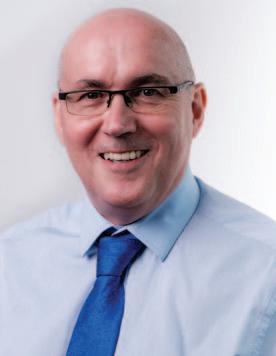
But in this reaction, it has failed to recognise the nuance and necessity of workforce support in the care sector. As the saying goes, this is “throwing the baby out with the bathwater”.
One must ask — why was there no meaningful consultation with care providers before such a seismic change?

In a move that has already sparked widespread alarm and criticism across the care sector, the government today published a white paper outlining plans to reduce net migration by ending the recruitment of overseas workers.
While political headlines may hail this as a bold immigration strategy, those of us on the ground know it as something else entirely: a threat to the future of social care.
Let us begin with language. The term “lowskilled” used to describe care workers is not only inaccurate — it is deeply insulting. As editor of The Carer, I have the privilege of regularly meeting individuals across the residential and nursing home sector at all levels.
I see first-hand the expertise, training, empathy and resilience they bring to their work every day.
These are not “low-skilled” jobs. These are highly skilled, emotionally demanding, and absolutely vital roles that support some of the most vulnerable members of our society, and am astounded this is not recognised.
To propose ending international recruitment at a time when there are approximately 131,000 vacancies in adult social care defies logic.
Overseas workers have been a lifeline for many providers, especially in the face of ongoing recruitment struggles. Removing this option with no immediate, viable alternative is nothing short of crisis management — and poorly thought-through crisis management at that.
Yes, the government has flagged future reforms such as a Fair Pay Agreement and the Employment Rights Bill. But let’s be clear: these remain vague in scope, underfunded, and years away from implementation. They are, quite simply, not an answer to the immediate staffing emergency the sector faces.
The timing of this policy shift seems more politically motivated than strategically sound, perhaps reacting to the backlash seen in recent local elections.
Carer is published by RBC Publishing Ltd, 3 Carlton Mount, 2 Cranborne Road, Bournemouth, Dorset BH2
or the
responsibility for any effects, errors or omissions therefrom. All rights reserved, reproduction is forbidden unless
Why not exempt the sector temporarily, while efforts to boost domestic recruitment and training are given time to bear fruit?
Unfortunately, this policy appears more symbolic than solution-oriented, and I strongly suspect we’ll see a reversal before long. Since October, care providers have faced increasing uncertainty due to shifting and unclear government positions and increases in operating costs. This latest development only deepens that turmoil.
On a brighter note, I want to take a moment to thank the hundreds of care homes across the UK who shared their moving stories and photographs of VE Day commemorations.
From residents who vividly remember May 1945 to the beautiful tributes held in their honour, these stories remind us of the sector’s compassion, spirit and dignity.
Our heartfelt thanks to Matt and our graphics team, whose hard work has brought the special supplement in this issue to life.
If only policymakers could see what we see — a sector not in decline but standing tall in the face of challenge. A sector worth listening to, worth investing in, and above all, worth respecting.
I would encourage our readers to sign up for our bi-weekly digital newsletter at www.thecareruk.com and follow us on social media for all the latest news.
I can always be contacted at editor@thecareruk.com
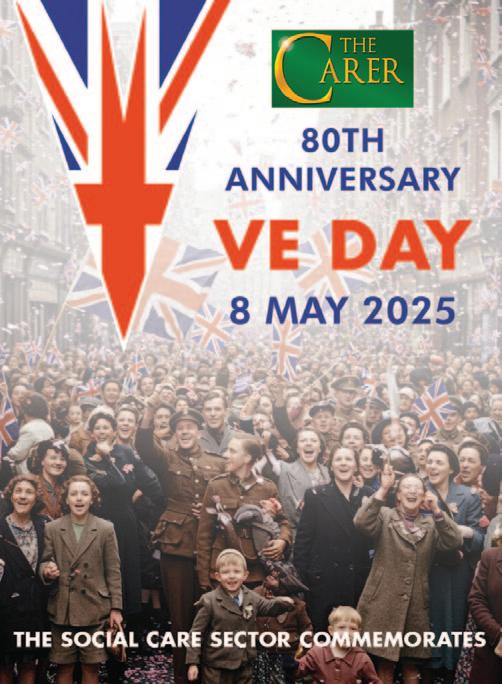

(CONTINUED FROM FRONT COVER)
The Government has cited future reforms, including the Fair Pay Agreement and the Employment Rights Bill, as long-term solutions. However, sector leaders say these initiatives remain years away from delivery and are not backed by sufficient funding. In the interim, providers are left facing an immediate and widening workforce gap, rising costs, and increased pressure on delivery.
“CART BEFORE THE HORSE”
Professor Martin Green OBE commented: “Cutting off international recruitment before a domestic solution is in place puts the cart well before the horse. The Fair Pay Agreement and the Employment Rights Bill, as outlined by Government, are years away from implementation and remain underfunded and undefined. They cannot replace what is being taken away now.”
“The decision to restrict overseas recruitment also reinforces harmful narratives around care work being “low skilled,” ignoring the expertise and dedication of both domestic and international care staff. Social care is a highly skilled, high-responsibility profession that deserves recognition and sustained investment. With this attitude, it will become harder and harder to recruit domestically, further widening the workforce gap.”
“This move will place greater pressure on providers already burdened by unsustainable agency costs and rising demand, with many at risk of exiting the market. Displaced overseas workers may be offered as a stopgap, but they represent a fraction of the workforce required and are not always suitable for frontline roles. The transition period until 2028 does not address the loss of future overseas talent, nor the escalating challenges providers face in recruiting domestically, particularly as the sector continues to struggle with retention, negative public perceptions, and financial instability.”
“Let’s be clear - this decision is not a solution. It is a political gesture that treats the symptoms but ignores the disease. Rather than investing in the sector and solving the recruitment crisis, the Government is closing the door on one of the only workforce pipelines still functioning. Social care is not low-skilled work. It is high-skill, lowpay work that deserves respect, proper recognition, and meaningful investment.”
SHORTSIGHTED
Vic Rayner, CEO of NCF said: “The plans set out in the immigration white paper published today will do little to reassure people drawing on care and support, let alone care workers and employers, that social care is a priority for this government right now. Government has a responsibility to step up to its immigration policy decision making and realise the need for urgent workforce planning and immediate improvements to care worker pay, terms and conditions to cover the shortfall that will be caused by these proposals rather than relying on references to a Fair Pay Agreement which is unlikely to come into effect for a number of years.
“This policy is shortsighted in that it overlooks the current levels of unmet care and support need. Additionally, government seems to be
ignoring recommendations made by its own Migration Advisory Committee which has called repeatedly in recent years for immediate improvements to care worker pay and workforce planning by the state to bolster the domestic workforce.”
“Whilst the current government is more clear about intent, the major gap between rhetoric and reality will do little to calm the real concerns of those who have been actively involved in strengthening their workforce through the valuable contribution of international colleagues. There also still seems to be a fundamental misunderstanding of the nature of care work with various government spokespeople using the term ‘low-skilled’ when referring to care work. We challenge the language being used here and would urge the government to improve its understanding of care work as a highly skilled profession requiring deep knowledge of a wide range of complex needs.”
Laura Chinyere-Ezeh, HR consultant in health and social care at UK and Ireland law firm Browne Jacobson, said: “The government’s intention to reduce the number of overseas workers in social care is another major headache for a sector already struggling to recruit and retain people at a time when demand for care is growing, with projections from Skills for Care’s Workforce Strategy showing another 540,000 new workers are needed by 2040.
“Social care faces intense competition from other sectors that are able to offer better pay and conditions such as flexible working, more sociable shift patterns and more structured career progression opportunities.
“It’s therefore never been more important for providers to create their own workforce strategies that remain robust amid external headwinds to develop a sustainable pipeline of talent.
“This will require them to consider how best to train future registered managers by strengthening internal development programmes, attract young people to the profession by collaborating with educational institutions to promote the sector as a great place to work, and transform workplace culture by enhancing flexible working options and childcare support.
“Social care stands at a critical juncture and, with little government support on the horizon or much headroom to raise salaries, providers must be ready to innovate their people strategies – thereby futureproofing their provision to meet an increasing demand for their services.”
Melanie Weatherley MBE, Co-Chair of the Care Association Alliance said: “While we recognise that immigration numbers should be controlled, we urge the government to implement changes in a carefully planned and managed way. If these changes are rushed through, there is a risk that social care services that are already under enormous stress will be forced to close, causing harm to the NHS and family carers.”
“We wish to challenge the notion that overseas carers are brought in as “cheap labour”. On the contrary, the many international recruits who work in our care system are highly skilled, and we are fortunate
to have been able to attract people to work here who have high levels of compassion and commitment. Care is not a low skilled job.”
“The Prime Minister says if you can work, you should work, and we support him in this. We would like to be able to employ more UKbased care workers, but at present the level of pay is unattractive following long years of under-investment in our sector.”
“To make a career in care more attractive to British workers, we need to recognise the importance of carers by giving them the right pay, conditions and training. Improving the pay of care workers will of course require an increase in funding via local authorities and the NHS.”
POLITICAL CROSSFIRE
Nuffield Trust Deputy Director of Policy Natasha Curry said: “Nobody is served well when social care is caught in the political crossfire of the immigration debate and governments keep turning the overseas recruitment taps on and off. Closing off international recruitment without properly addressing our poor domestic supply of care workers is hugely risky, but social care is rarely granted the political status it needs to be a government priority.”
“It is absolutely right to crack down on the exploitation of overseas workers, but care providers won’t be able to boost their domestic workforce overnight. Back in 2020/21 social care job vacancies peaked during Covid and it proved unsustainable, leading to a big increase in overseas recruitment, and not much has changed since then to encourage more domestic workers to join the sector. Continuing to describe care workers as ‘lower skilled’ is also unlikely to help.”
“While plans for a Fair Pay Agreement for care workers show ambitions to make the sector a more attractive workplace for UK citizens, these reforms won’t kick in for years, so there is going to be a void where social care employers will struggle even more to fill vacancies.”
“The number of people applying for health and care visas has already fallen off a cliff since rules were tightened and fell further after changes were made to stop them bringing dependants, so it remains to be seen whether new measures in the immigration white paper will make a big difference to the overall immigration figures.”
Trade union Unison also criticised the decision and called for urgent clarity on what the changes meant for those already working in the UK.
ANXIOUS WORKERS
Christina McAnea, Unison’s general secretary, said: “The NHS and the care sector would have collapsed long ago without the thousands of workers who’ve come to the UK from overseas.
“Migrant health and care staff already here will now be understandably anxious about what’s to happen to them. The government must reassure these overseas workers they’ll be allowed to stay and continue with their indispensable work.”
She urged ministers to stop describing care jobs as “low skilled” and said the government must “get on with making its fair pay agreement a reality”.
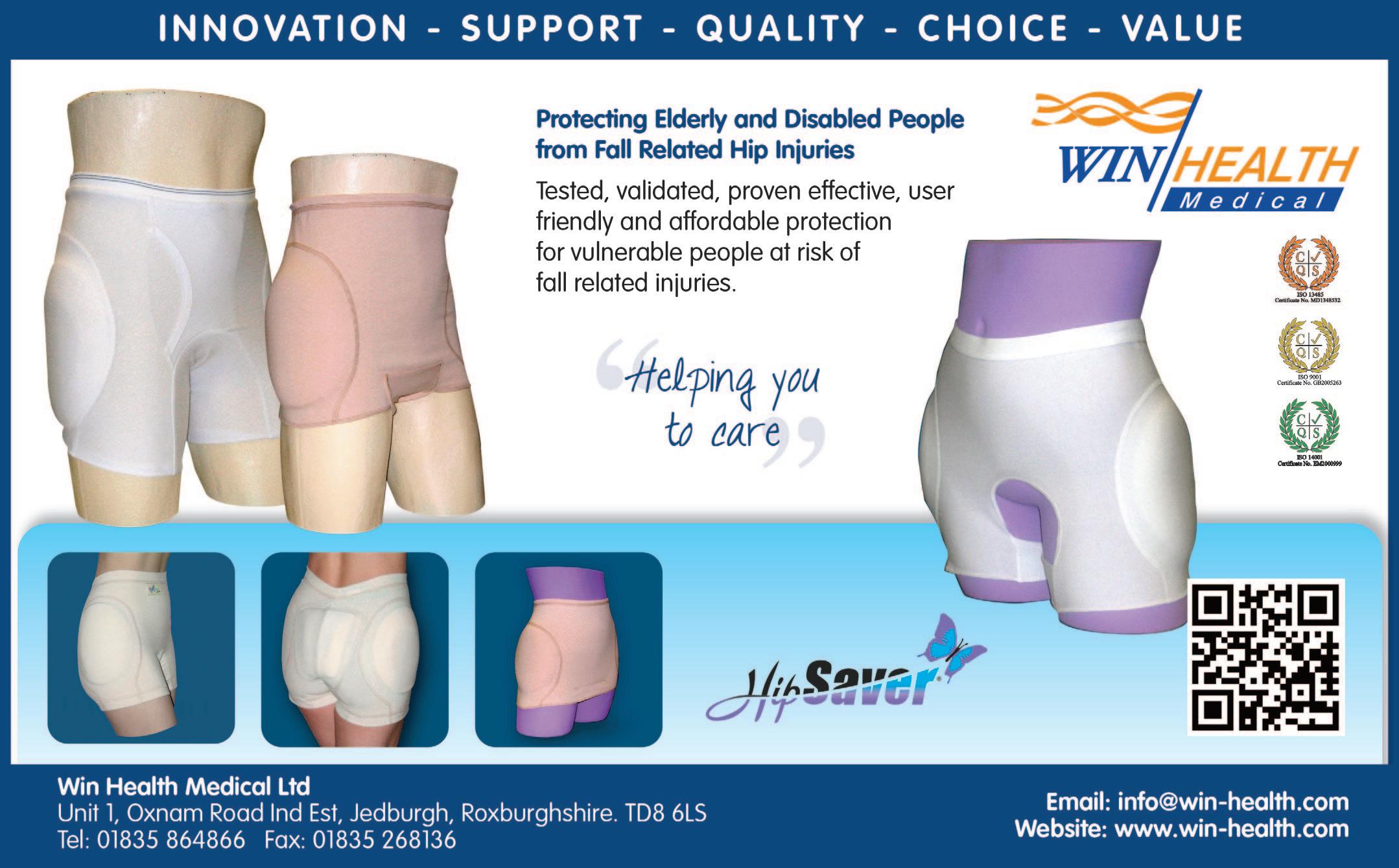
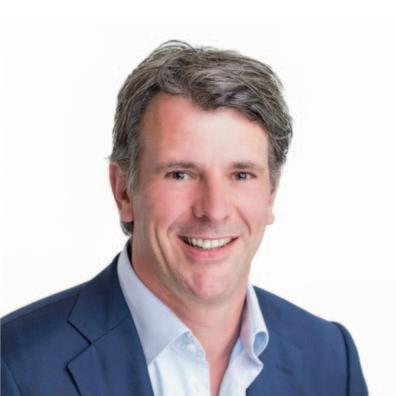
Conducting full employment screening and vetting is recognised as a fundamental element of the hiring process, particularly when working with vulnerable groups in the nursing and care market. However, these processes may be occasionally overlooked, or elements may be missed by some employers looking to quickly recruit and onboard new staff to fill critical gaps in their workforces. However, even in what remains a highly skills-short environment, failing to carry out thorough checks on people employed in any capacity could open the door to a range of risks that can have a critical impact on vulnerable populations. Perhaps more concerning is the fact that this trend is growing as more care facilities are turning to the gig workforce — a notoriously complex segment to vet and screen.
THE GROWTH OF GIG
The gig workforce has grown in parallel with seismic shifts in the nature of employment in the UK. Fewer people are seeking ‘a job for life’ than ever before, and the number of those operating on a gig basis has more than doubled in size in recent years. In fact, data suggests that an estimated 7.25 million people (around 22% of the workforce) participated in some form of gig work in the UK in 2024, and there are 1.7 million professionals who work solely in this way.
Gig models are also highly popular in the care industry, and there is evidence that the workforce in this sector may actually be the largest one across the entire market. In addition, recruitment services for the gig workforce are increasingly being delivered via digital platforms, but according to a recent UK Government report, only 41% of gig platforms require enhanced Disclosure and Barring Service (DBS) checks, and fewer still verify qualifications or conduct ongoing vetting.
While there’s no doubt that the gig model provides greater flexibility to both individuals and employers, and may help to tackle staff shortages seen in the child and social care markets, it has also opened the door to increased risks, particularly when it comes to fraud, misconduct, and exploitation if workers are not thoroughly vetted.
RISING THREATS
The rising risks in not carefully screening gig workers are only intensifying. A study from 2023 by CIFAS, the UK’s fraud prevention service, revealed a 22% rise in ‘insider threats’ and employee fraud compared to the previous year. Perhaps most alarmingly, one in five of those frauds were committed within the first three months of employment.

By Rolf Bezemer, Executive VP and General Manager International at
In the care sector especially, mitigating risk such as fraud could and should be tackled through a thorough and careful inspection of candidate backgrounds and working history. However, employers may be under significant pressure to rapidly fill workforce gaps to meet rising demands for care. At the same time, they must maintain high standards for residents and their families, which inadvertently leads to some processes being overlooked.
This would be a challenge in any working environment, but with roles in care and nursing that support vulnerable populations, this oversight could have drastic consequences. Providers that don’t fully vet or screen staff risk the wellbeing of their populations, the safety of their facilities, and may face potential for consequences (reputational damage, heightened legal liabilities, financial losses, and lost public trust).
On top of the potential damage caused by these risks, failure to prevent fraud is also likely to become a corporate offence once the Economic Crime and Corporate Transparency Act 2023 is fully enacted. And, on March 30 2025, the Home Office announced a further crackdown on illegal working in the gig economy by those without the necessary right to work status. These emerging rulings place a greater onus on the employer, meaning those that fail to vet staff — inadvertently or not — who then go on to commit fraud, could be criminally liable for their inaction and face major fines or even potential prison sentences.
The strength and quality of care provided by any home is also dependent on its employees – no matter how short or temporary their contract or assignment. Conducting the fundamental elements of screening and completing thorough background checks on gig workers, not only when an individual starts a position, but also at any point they are engaged by the facility, is critical.
The digitalisation of modern society, alongside the growth of gig working models, makes it far easier for ‘bad actors’ to slip through the net. However, tech-backed screening processes and the use of digital identities to verify information also make it easier for companies to make well-informed, confident hiring decisions. Crucially, leveraging a modern, tech-first screening provider also supports the employers with their screening needs and helps them manage their compliance requirements.
It’s undeniable that the UK is in the midst of a major staffing crisis in this sector, with speed of hiring a top concern. It’s crucial to acknowledge, however, that screening and vetting gig staff is critical, and while it’s important to hire workers quickly, it’s even more critical to hire them safely and compliantly. That means that conducting adequate DBS checks, digital identity, right to work, credit and financial checks, as well as verifying references and carrying out ongoing monitoring on all gig workers may be important considerations for hiring organisations. It can be a significant undertaking, but partnering with the right screening vendor can help the hiring organisations with their compliance requirements
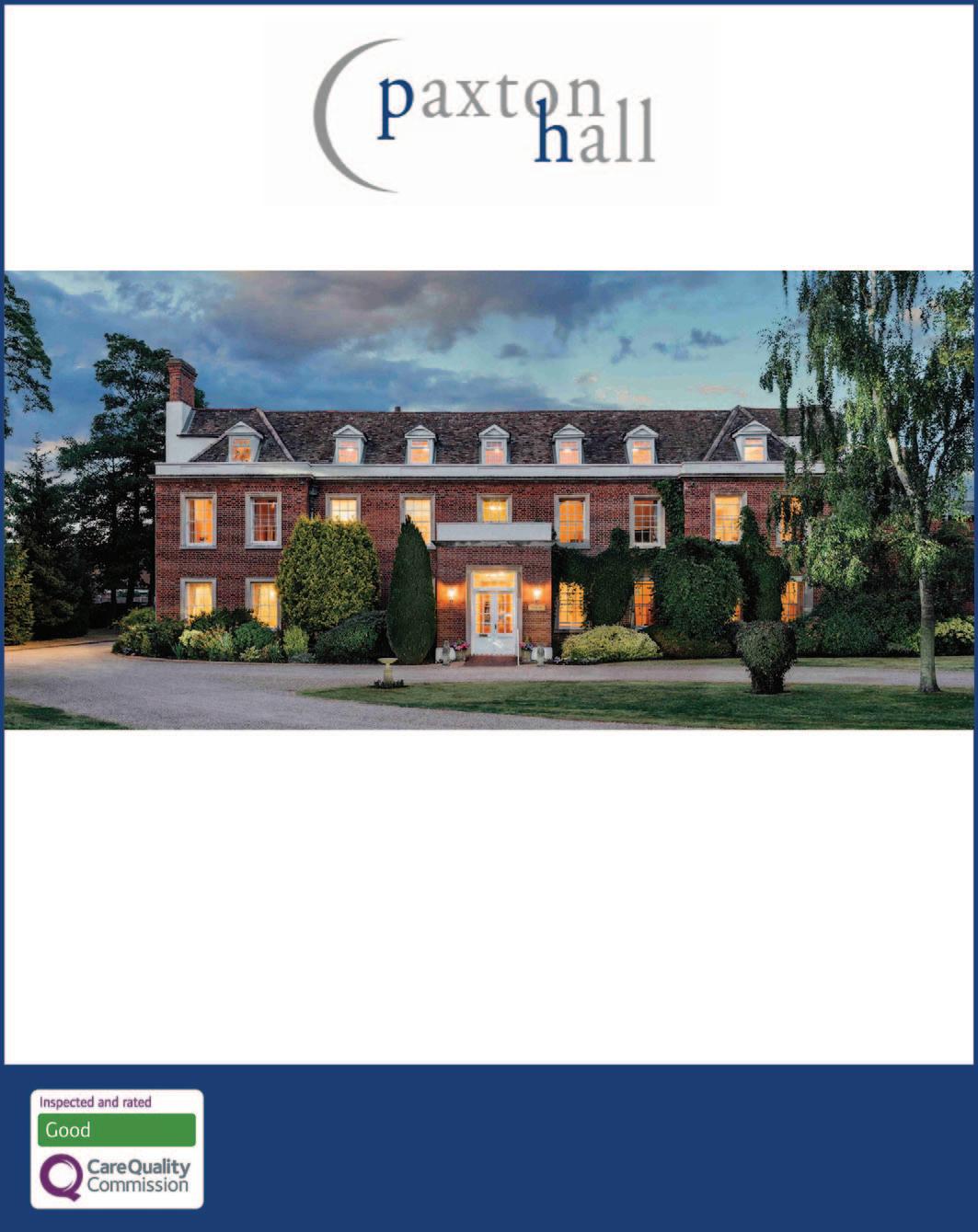
People with early-stage Alzheimer’s disease in Scotland will not be able to access the drug donanemab on the NHS, after it was rejected for use by the Scottish Medicines Consortium (SMC).
The decision follows the SMC’s rejection of another similar Alzheimer’s drug, lecanemab, earlier this year. These decisions follow that of the National Institute for Health and Care Excellence, which last year provisionally ruled that both donanemab and lecanemab should not be made available on the NHS for people in England and Wales.
Donanemab is not a cure. But clinical trials show it can slow the progression of early-stage Alzheimer’s by around a third. It works by targeting a protein called amyloid, which builds up in the brains of people with Alzheimer’s.
The SMC said evidence put forward for how well the drug works, as well as how much it would cost to be delivered by the Scottish NHS, was not strong enough.
In the US, donanemab infusions are estimated to cost around $32,000 per year, along with extra costs for scans and medical care. For now, because of decisions like the one from SMC, the medicine can only be accessed privately in the UK – putting it out of reach for many families.
David Thomas, Head of Policy and Public Affairs at Alzheimer’s Research UK, said the announcement was another disappointment for people in Scotland. There are currently more than 90,000 peo-
ple living with dementia in Scotland, and more than half of them have Alzheimer’s disease.
“No one should be priced out of the chance to slow down Alzheimer’s,” he said.
Find out more about donanemab, including how it works and who it’s for, here
The makers of these new medicines are working on alternative ways to administer the treatments. In January, the drug company that makes lecanemab asked the US medicines regulator to approve a version that people could inject themselves at home, rather than attend hospital for an infusion. A decision is expected by the end of August 2025.
But Alzheimer’s Research UK says the UK “cannot afford to sit and wait.” The charity is calling for pilot studies across all four UK nations to better understand how these new drugs work in practice – including the best course of treatment, how they affect people long-term and what resourcing hospitals and dementia services will need so these medicines – or the next generation of treatments – can be quickly rolled out across the NHS in the future.
“Governments from across the four nations, regulators, the NHS and industry must now urgently come together to create a plan to fast-track access to new treatments, so that people with Alzheimer’s aren’t left behind,” he said.

For residents at Brampton Manor Care Home in Newmarket, a recent trip to Newmarket Racecourse offered more than just an afternoon out — it brought cherished memories back to life and reconnected them with a part of the town’s cultural heartbeat. Residents, accompanied by members of the Brampton Manor team, travelled to the racecourse to enjoy a live day of racing. The idea for the trip came directly from conversations in the home, where several residents shared their lasting fondness for the sport. For many, horse racing has been part of their personal histories — whether through owning horses, working in stables, or simply enjoying it as spectators over the years. In Newmarket, the spiritual home of British racing, these memories run deep. Through Brampton Manor’s established relationship and the generosity of The British School of Racing, the team were able to
secure tickets and organise a safe, supported visit that brought those memories to life in the best way possible: surrounded by the sound of hooves on turf and the hum of the race day crowd. Barbara Harley, one of the residents who attended, said: “I love watching the racing on TV, but when I heard we were going to see it live, I really wanted to give myself the chance to experience it again. It didn’t disappoint.”
For the Brampton Manor team, the outing was part of a wider commitment to ensuring residents continue to feel connected to the people, places and experiences that have shaped their lives. The trip was made even more special by the warm weather and uplifting atmosphere, which brought a sense of joy and familiarity to the entire group.
Home Manager Akhi Goswami reflected on the importance of the day:
“What we do is about far more than care — it’s about understanding what matters most to the people who live here and finding meaningful ways to support that. For many of our residents, racing has been part of their story. Giving them the opportunity to return, to feel the excitement again, and to share that with one another, is incredibly powerful. It’s something they’ll talk about for a long time.”
Danny Harris, Admissions Manager at Brampton Manor, added: “There was a real energy throughout the day. Seeing our residents light up in that environment, talking about old times, recognising names and colours, smiling in the sunshine, those are the moments that remind us why we do what we do.”
HC-One’s Greenacres Care Home, in Meltham, celebrated a triumphant second place at the village’s annual Scarecrow Festival, with this year’s theme honouring VE Day. Led by the creative vision of Nicola Parker, Greenacres Domestic Assistant, alongside residents and colleagues, crafted an inspiring display of four scarecrows. The scarecrows depicted a reunited family of mum, dad, and two children, symbolising the joy of families coming together after VE Day.
The festival’s route through Meltham showcased an array of imaginative entries, and Greenacres’ residents and colleagues joined the community to admire the displays.

Among them was resident Freda Ibberson, who turned the walk

into a heartfelt journey down memory lane.
Born in Meltham and a resident until age five, Freda shared vivid childhood memories, guiding Greenacres colleagues Jackie and Jean to the places where she was born and visited her grandparents, aunts, and uncles.
Claire Wilson, HC-One’s Greenacres Care Home Lifestyle Manager, said: “We’re thrilled to have achieved second place in this year’s Scarecrow Festival. Nicola’s creativity and the enthusiasm of our residents and staff truly brought the VE Day theme to life.
“Seeing Freda share her memories with such joy as we explored the village was a beautiful reminder of how events
to our community and its history.”
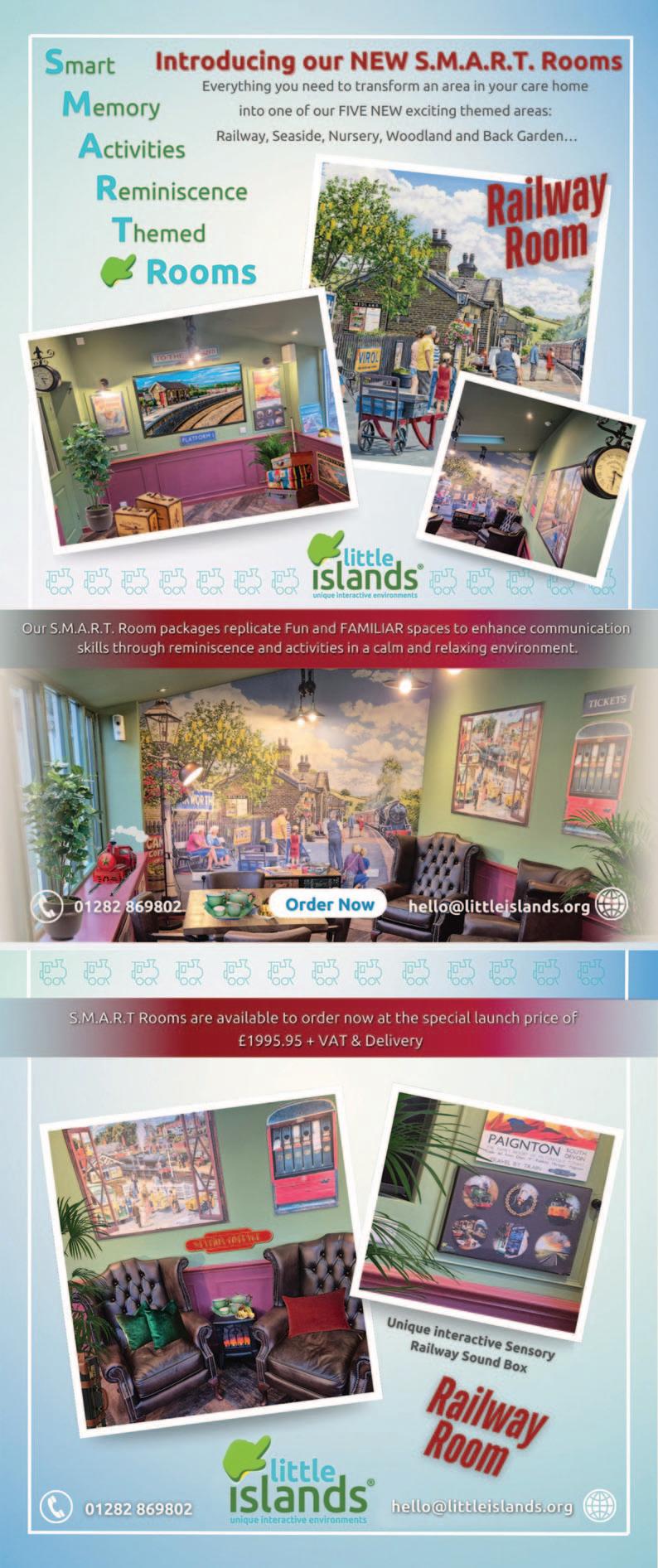
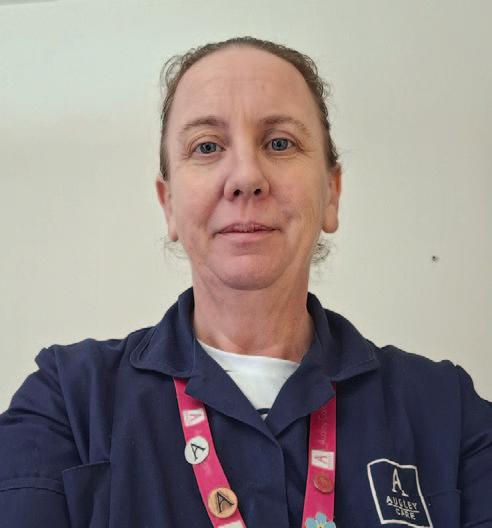
Kerry Head, a carer at Audley Inglewood*, discusses her journey to becoming a
I have worked as an Audley carer at the Inglewood village in Kintbury for over six years now and couldn’t imagine doing anything else. I initially left school wanting to work in the travel industry and did so for a number of years, until I had my children and decided to focus my attention on them.
When my youngest child started school, I began looking for a job that would work around school hours and I saw the carer position advertised with Audley Care. Whilst raising my children, I had already been caring for my granny who had unfortunately suffered with both Alzheimer's and vascular dementia. I saw how positive the move into a care home was for her, so I decided to apply to help other families and their loved ones get the support they needed.
As well as working at Audley Inglewood I also support clients in the local community. For the community visits I drive to clients homes located in Kintbury whilst at Audley Inglewood I tend to walk around the village. Day-to-day my role varies and I can do as much as assisting with personal care and medication or smaller things such as making a cup of tea and sitting with the person for half an
Social Care TV continue to fly the flag for highest quality online training for Health and Social Care, after unwavering commitment to excellence within the sector for over 25 years.
Their widely-used health and social care specific courses - produced and edited in-house - are expertly designed to make learning engaging, informative and, therefore, highly effective for learners.
Accredited by CPD, training with Social Care TV is quality assured, comprehensive and relevant.
As one of the leading online training providers in the health and social care sector in the UK, they supply training for local authorities, recruitment agencies, care home groups and other health and social care organisations.
Their feature-rich Manager platform has further been enhanced this year with the introduction of several new Manager tools designed to aid with compliance, reporting and trainee management. Features now available include:
• Compliance Dashboard with Traffic Light System
• Downloadable Trainee Matrix
• Custom Bundles
• Trainee Groups
• Bulk Uploads
• Bulk Enrolment Onto Custom Bundles
• Course Enrolment Notifications
• Course Reminders
hour or so, simply chatting. We know that we may be the only friendly face some people see in a day or even a week, so every moment spent with them counts and is important. For some of the people I care for, whose families live further away, I also spend time speaking to them via email, so they are able to stay in the loop and know how they’re loved ones are getting on.
I personally think care is a job that often gets overlooked and can even sometimes, sadly, have a stigma attached to it. I hope people recognise the hard work that carers put into their roles everyday to ensure other families have someone looking after and visiting their loved ones.
In the years to come, I would like to see carers continue to be appreciated for their hard work and with the UK’s growing ageing population, my hope would be that the sector becomes more desirable to others so we can support those who may need it.

SCTV regularly release new and updated high-quality courses. Previews for all courses can be viewed at: Courses - Social Care TV (www.social-care.tv/courses/course-details)
To enhance their learners' experience further they have created free, comprehensive subject-specific workbooks which were rolled out across all courses this year. This unique addition provides excellent value and a fully robust training package.
SCTV are delighted to have won several awards over the last 12 months including:
• Best Online Health and Social Care Learning Platform’ – Global Health & Pharma Social Care Awards 2024
• ‘CPD Provider of the Year’ – The CPD Awards
• Social Care Training Provider of the Year’ - Corporate Livewire Innovation & Excellence Awards
Gold standard customer service remains a core staple of the business, with expert support and guidance provided via telephone, email and live chat. They place great importance on the training and development of their customer services team to ensure that they continue

to provide a personal, friendly and knowledgeable service. Their much-loved ‘Care Worker of the Month’ award recognises and rewards the selfless dedication shown by care workers across the UK and they proudly support the Care Workers Charity who aim to advance the financial, professional and mental wellbeing of social care workers.
SCTV believe that high quality training should be accessible to all and offer regular, free courses which include a digital certificate accessible via their website.
The company stands behind a clear mission and set of values which define their ethos and their dedication to both the Care Sector and those within it. These can be viewed at: Mission Statement and Core Values - Social Care TV (www.social-care.tv/about/mission-statement-and-core-values)
Social Care TV are a responsible business, committed to ensuring that their actions have a positive impact on their employees, customers, the wider health and social care community and the environment.
Above all, SCTV consistently strive to make a meaningful contribution to the wellbeing of those being cared for.
For more information please see: Homepage - Social Care TV (www.social-care.tv) and see advert on the facing page.

a delicious snack/pastry trolley or even a drinks trolley for that afternoon tipple?


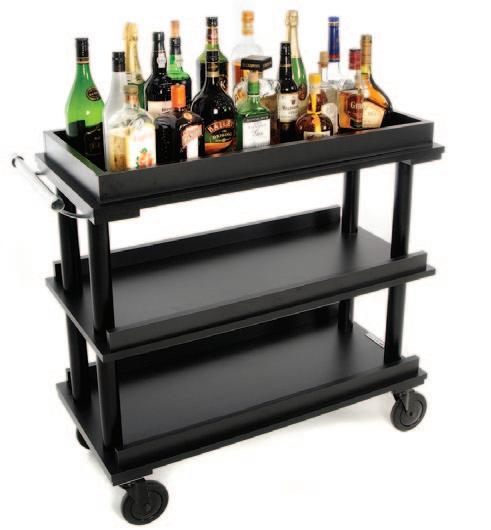
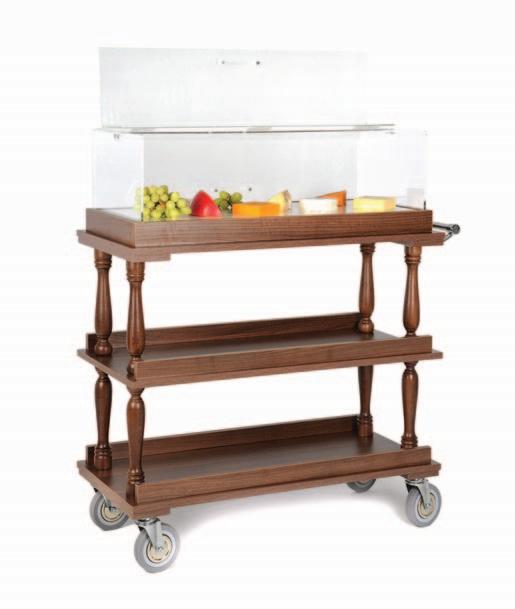
Kim Leadbeater MP has confirmed she will support an amendment to the Terminally Ill Adults (End of Life) Bill which would require an assessment of current palliative and end of life care provision within 12 months of the Bill passing.
Marie Curie, the UK’s largest charitable provider of palliative and end of life care, suggested the amendment which would require the government to publish an assessment of the current availability, quality and distribution of palliative and end of life care services.
The amendment—put forward by Liberal Democrat MP Munira Wilson and supported by over 20 MPs—aims to reflect the concerns of those who worry that any move toward legalising assisted dying must not come at the expense of compassionate and high-quality care for the terminally ill.
Yesterday, Kim Leadbeater MP met with and wrote to Marie Curie’s Chief Executive Matthew Reed to confirm her support for the amendment (amendment 21).
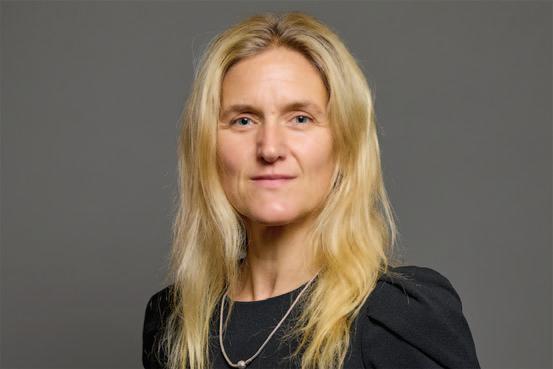
Marie Curie Chief Executive, Matthew Reed, said: “Major funding issues, workforce shortages, a postcode lottery for access to services, huge gaps in out of hours care and an aging population – palliative and end of life care in the UK is in crisis.
“We are grateful to Munira Wilson MP for working with us and tabling this amendment to require an assessment of existing end of life care provision, and to Kim Leadbeater MP for confirming that she too will now support it.
“Marie Curie is firmly neutral on the matter of assisted dying, but we are far from neutral on the urgent need to improve palliative and end of life care.”
“And while on its own, this amendment would not guarantee any improvements to palliative and end of life care, understanding what provision is currently available, and where, is a crucial step towards the UK and Welsh governments taking action to ensure everyone who needs palliative care is able to access it.”
“As the UK Government prepares to publish its 10 Year Health Plan for England next month, Marie Curie will continue to call for a national palliative care strategy, supported by minimum quality standards, and funding that will enable the transformation of end of life care services across our country –regardless of whether or not the Bill progresses.”
Although legislation on assisted dying in England and Wales is a matter for the UK parliament, if the Bill becomes law it will affect public services in Wales, including end of life care, which is the responsibility of the Senedd and the Welsh Government.
Jon Antoniazzi, Marie Curie Associate Director Policy & Public Affairs Wales, added: “End of life care in Wales is at breaking point and we need urgent action from the Welsh Government to transform the system. As this Bill progresses through parliament, further work should be undertaken to make sure any assessment of palliative care takes account of devolution and the appropriate responsibilities of the UK and Welsh governments.”
Ms Leadbeater said: “I am fully committed to ensuring that people who are at the end of their lives receive the care, dignity and support they deserve,” she said. “I share Marie Curie’s view that high-quality palliative care and discussions around assisted dying are not mutually exclusive.”
The Assisted Dying Bill passed an earlier stage in Parliament with a modest majority and remains a subject of open debate, with MPs allowed a free vote.
Several changes have already been made to the draft legislation, including the replacement of judicial approval with a panel of clinical experts for certain decisions.
Health Secretary Wes Streeting has previously expressed concerns about the readiness of the NHS to accommodate such changes, highlighting the importance of ensuring that any policy shift is supported by a health service that can meet the needs of vulnerable individuals.
St Helens Hall Care Home has proudly sponsored the Clock Face Miners Junior Football Club Under-6 team by providing brand new winter jackets for the young players.
Clock Face Miners JFC is a dynamic and inclusive club, dedicated to nurturing a love of the beautiful game across all ages.
To show their appreciation, members of the Under-6 team recently paid a special visit to St Helens Hall, where they met residents, shared stories, and posed for photographs in their new jackets. The visit was filled with laughter, smiles, and a true sense of community spirit.
Ian Roach, chairman of Clock Face Miners JFC, said: "We’re incredibly
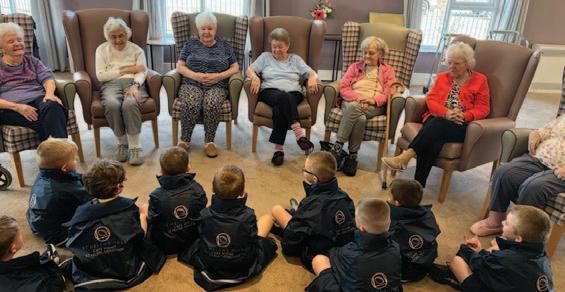
grateful to St Helens Hall Care Home for their generous support. The winter jackets will make a real difference to our young players, keeping them warm during training and matches. It was wonderful to visit the home and see the joy it brought to both the team and the residents."
Jackie Smith, senior activities coordinator at St Helens Hall Care Home, added: "We were delighted to welcome the children to St Helens Hall. The residents loved meeting them, and it was heartwarming to see different generations coming together and sharing such a special moment. We are proud to support a club that plays such a positive role in our local community."


Digitising NHS and adult social care services across the UK will require an estimated £21 billion over the next 5 years, according to new research published by the Health Foundation. Of this total figure, £14.75bn is for England.
The independent charity commissioned PA Consulting to assess the investment needed to achieve existing ambitions for digitisation. These include putting in place infrastructure such as electronic patient records, cloud storage, cyber security and Wi-Fi, along with the skills and capabilities to use it effectively.
This research is published ahead of the forthcoming Spending Review and the 10 Year Health Plan which will set out the government’s plans to shift the NHS from ‘analogue to digital’.
In the absence of a publicly available official figure for the cost of existing commitments to digitise the NHS and adult social care, this research is the first evidence-based attempt to provide such an estimate.
Debates about digitisation often assume the resources required will be capital spending on hardware and infrastructure costs. But these findings highlight the importance of revenue spending to support implementation, pay for software subscriptions, maintenance, optimisation and other ongoing costs, and, crucially, invest in training and development for the staff using it. And it is important to note that recurring costs will
be ongoing beyond the 5-year period that was the focus of this research.
The research also highlights important gaps in publicly available information on the costs and benefits of digitisation.

As part of this research, the Health Foundation has set out three key actions for government and policymakers across the UK, to ensure the NHS and social care services can meet ambitions for digitisation:
1. Set a clear, transformative and durable vision for digitisation in health and social care
2. Support the vision for digitisation with the required funding
3. Develop a plan for realising the benefits of digitisation – including higher quality care, better patient experience, better staff experience and improved productivity.
Director of Innovation and Improvement at the Health Foundation, Dr Malte Gerhold, said: “Ministers have repeatedly stressed the need for health and care services to move from analogue to digital. Our independently commissioned research finds that to achieve the government’s ambitions to digitise health and social care, significant spending will be needed over the next 5 years and beyond.”
“But direct investment in technology alone is not sufficient. The government must fund the change not just the tech. This means investing in and planning for implementation and change to genuinely realise the benefits of digitisation for patients and staff.”
A Care Assistant at Station Court Care Home in Ashington has received a prestigious 15 Year Service Award in celebration of working at Barchester Healthcare for 15 years.
Angela Amory, Care assistant, started at Barchester in May 2010 providing the highest quality care for residents at Station Court care home since. “It has been a real pleasure to receive my 15 year award and gifts, I can’t believe it has been 15 years already.
I have met and cared for so many wonderful people over the years.’’ Adele Keenan, Employee Services Director at Barchester said: “I’m always pleased
to hear stories about the long service of Barchester staff and am delighted Angela Amory has achieved this milestone. It is dedication like this that ensures our residents are provided with a happy place to live.”
Sarah Kelly, General Manager of Station Court said: “We’re delighted to be celebrating 15 years of loyal service with Angela. She has demonstrated her dedication and loyalty to this home and our residents year after year.
I speak for all of us here at Station Court when I say that I’m looking forward to many more years of working with Angela!”
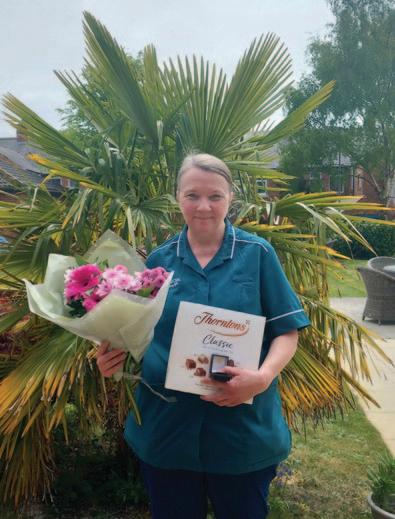
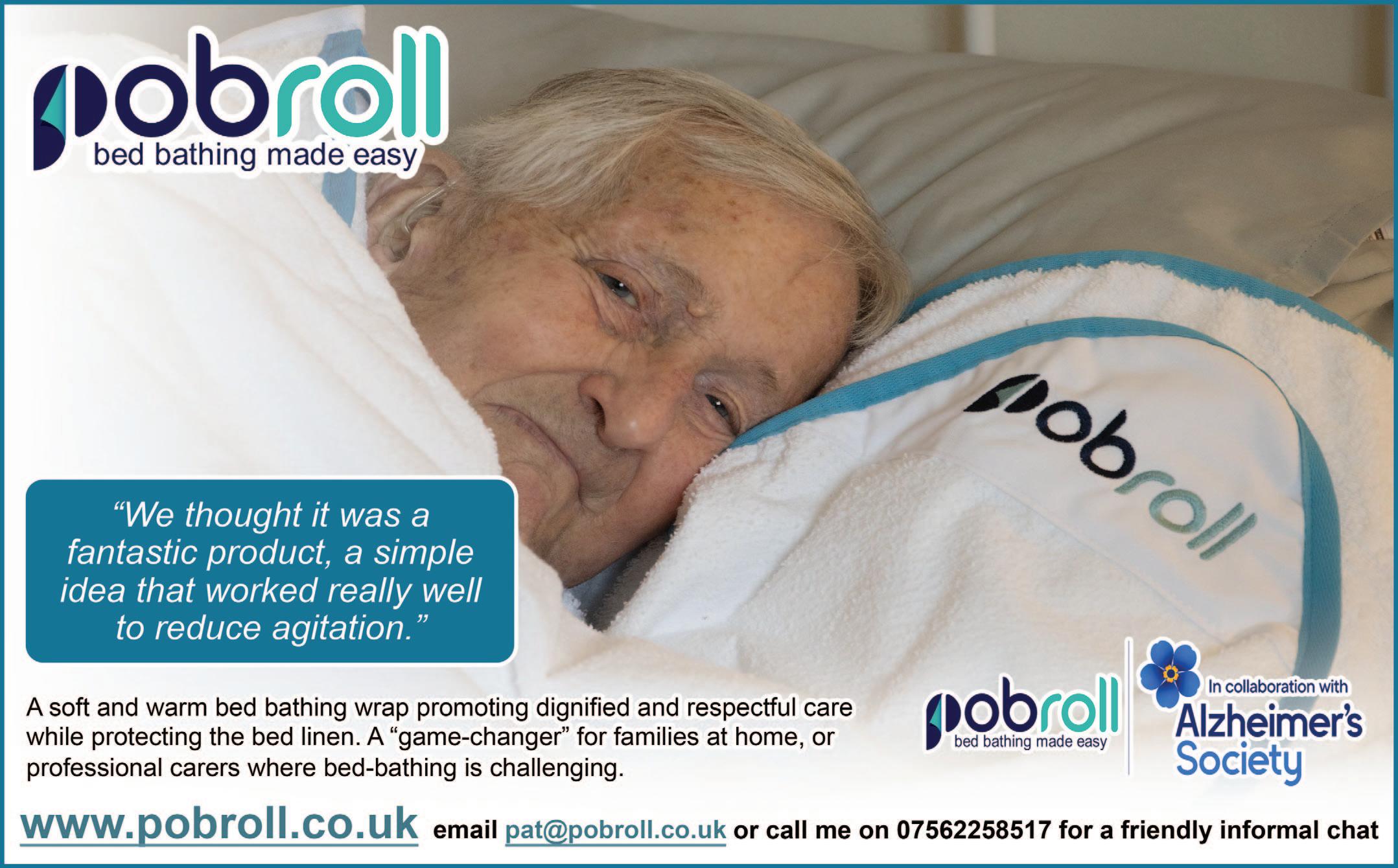
HC-One Nursing colleagues across the UK have been sharing their inspirational stories to encourage others to consider a nursing career in social care to mark International Nurses’ Day on May 12, 2025.
The theme for this year’s International Nurses’ Day is ‘Our Nurses. Our future. Caring for Nurses strengthens economies’ which emphasises the critical role Nurses play not only in healthcare but also in the broader economic wellbeing of societies. It highlights the importance of investing in the nursing workforce to ensure resilient health systems and sustainable development.
International Nurses’ Day is an annual event which honours the invaluable contribution of Nurses across the world and coincides with the birthday of Florence Nightingale, the founder of modern nursing.
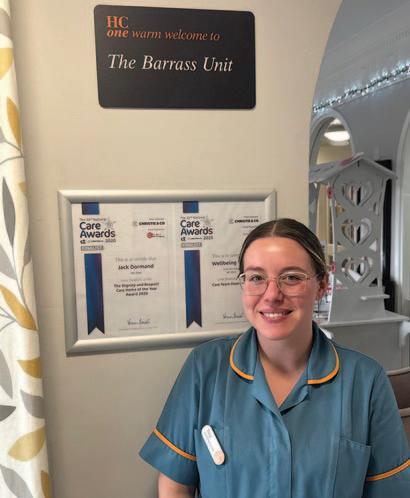
Letizia, also known as ‘Tizzy’, Taylor, aged 28, a Nurse Associate at Jack Dormand Care Home in Horden, Peterlee, County Durham, began her career with a Diploma in Animal Management before entering social care in 2015 as a Domiciliary Care Assistant.
Joining HC-One’s Grampian Court Care Home in 2018, she progressed to Senior Care Assistant after completing a Level 3 Health and Social Care NVQ apprenticeship.
In 2021, Letizia transferred to HC-One’s Jack Dormand care home where she pursued clinical training through HC-One’s Care Assistant Development Programme and a Level 3 Lead Adult Care Worker apprenticeship.
In 2023, Letizia embarked on a Nurse Associate Apprenticeship (NAA) with the Open University, appreciating the affordability, flexibility and practical experience of the two-year foundation degree. Letizia completed the Nurse Associate Apprenticeship and is now working as a Nurse Associate at Jack Dormand Care Home. She plans to continue in her nursing journey and go on to complete her Registered Nurse Bachelor’s Degree in the near future.
Letizia Taylor, Nursing Associate at Jack Dormand Care Home, commented:
“I have always had a passion for learning and developing my skills. I had an interest in the clinical side to health care, and I enjoy spending as much time as I could with the Nurses to gain insight into different clinical procedures.
“There are lots of progression and development opportunities available through completing an apprenticeship. Choosing to do an apprenticeship has helped me to improve my skills and knowledge, and to allow me to provide high quality care by understanding the theory behind it.”
Daniel Tabe, aged 60, a Senior Carer and Registered Nurse Degree Apprentice at Silverwood Care Home in Beeston, Nottingham, was inspired to enter social care by his parents’ work as whilst he was still at school and during the holidays, Daniel would accompany his mother to a hospital where she used to work as a midwife and his father as an Administrator. . As a teenager, he served meals to hospital patients which fostered his compassion and empathy.
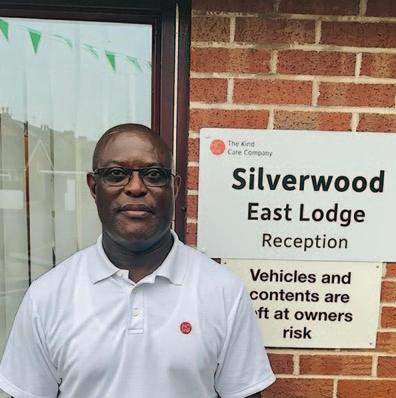
Joining HC-One in 2019, Daniel advanced from Carer to Night Senior Carer, earning a Level 2 Adult Care Worker Apprenticeship (Merit) and Level 3 Lead Adult Care Worker Apprenticeship (Distinction). In 2023, he began a Registered Nurse Degree Apprenticeship with the Open University, aiming to join Silverwood’s nursing team.
Daniel Tabe, Senior Carer and Registered Nurse Degree Apprentice at Silverwood Care Home, said:
“Reflecting on my career journey, every day comes with new challenges but the smiles of those vulnerable individuals in my care remind me of why I chose to follow this career path.
“I would encourage anyone considering a nursing career in social care to go for it including anyone thinking about completing an apprenticeship. The decision to complete an apprenticeship will open many doors for you on your way to excellence in your career.”

Priscillah Musenga, aged 56, Home Manager at HC-One Scotland’s Drummohr Care Home in Wallyford, Musselburgh, East Lothian, started her career in Zambia as a General Registered Nurse. She later became a Nursing Matron at 27-years-old.
After moving to the UK in 2005, she worked in a Jewish care home, embracing its culturally rich approach to care. Priscillah advanced from Charge Nurse to Senior Clinical Lead before joining HC-One in 2022, as Deputy Manager at Drummohr Care Home. She completed a master’s in Dementia Studies, a bachelor’s in Adult Nursing and a Diploma in Leadership and Management, earning her promotion to Home Manager.
Priscillah Musenga, Home Manager at HC-One Scotland’s Drummohr Care Home, commented:
“My experiences have helped me develop my practice including meeting a lot of people in the community where I live. I am actively involved in assessing people’s needs prior to moving to the care home, listening to families fears and anxieties that they encounter when making decisions to move their loved ones into care, and I enjoy being part of the team involved in providing care.
“Building trust as a Nurse, with empathy and receiving feedback about care you have provided is extremely rewarding. You’re make a difference to people’s lives and that is an experience that enhances my approach to care and my practice.”
Anna Selby, Executive Director of Quality & Nominated Individual at HC-One, commented:
“I was proud to call myself a Nurse for 30 years, but I am even more proud of the work our Nurses do in HC-One, flying the flag for Adult Social Care Nursing and showing up with kindness and integrity in often challenging circumstances.
“We are really excited to be able to further progress the reputation of our Nurses and support their continued professional development.

“You hold a unique role in the world of nursing, supporting others to ensure outcomes for our residents, most notably with a quality of life build around the special relationships you form and the technical skill you demonstrate. Happy International Nurses’ Day to all our Nurses and carers.”
A TEAM of experts have come together to disrupt the expensive and complex social care system by launching an ‘app’ to bring care homes/providers and carers together using AI.
AgoraStaff, a temporary staffing app for the social care sector, is the brainchild of Richard Williams-Pears, a longstanding Cornwall councillor and former mayor of St Austell, who saw firsthand the rising costs and inefficiencies in social care.
He teamed up with his wife Jolene, AgoraStaff’s Director of Outstanding Compliance, who has an extensive background in operating theatres, and Janet Shreeve, who brings hands-on care sector experience from running Shreeve Care Services, based in Wiltshire.
Together, they partnered with tech experts Ben Grave and Simon Wetherell —creators of the UK’s leading asbestos management system - to bring the app to life.
Richard said: “Providing care is expensive and it’s even more expensive if a care home, local authority, or other care provider has to pay an agency to find carers, particularly at the last minute. The carer gets minimum wage, or just above and the agency takes a hefty cut on

average around 30% of the fee from the provider.
“We felt there had to be a better way, using modern technology, to speed up this process leaving more money available for carers and providers. So much money is lost on agencies sitting in the middle between providers and carers, our app is designed to cut through this inefficiency.
“We have therefore combined deep sector knowledge with smart tech.”
Janet Shreeve is the Chief Business Development Officer

for AgoraStaff. She said:
“Many carers throughout the UK are self-employed and rely upon agencies to find them suitable shifts. Our marketplace gives them the opportunity to not only register for free but have complete control over the shifts they apply for and undertake.
“We are committed to ensuring the carers within our marketplace are the best professionals for individual roles. We achieve this with a vetting process to ensure they are legally entitled to work in the UK (if relevant) and must register their relevant training. They will also have the option to undertake more training to enhance their rolesa concept not commonly found within traditional agencies.”
AgoraStaff goes live week commencing May 19th in Somerset and the surrounding counties.
Care providers can sign up for the app for a monthly fee of £34.99 per location (plus five per cent from the agreed daily shift fee) and trained carers sign up FREE once they have completed the vetting process.


The National Care Association (NCA) welcomes the publication of both the Terms of Reference of the Casey Commission and the Health and Social Care Committee’s report, which powerfully conveys on the first page why these matters to millions; ‘The NHS undoubtedly saved my life, but social care helps me live it.’
We commend Baroness Casey’s decision to begin this important work by convening a roundtable with people receiving care and unpaid carers prior to the announcements. We believe this was the right place to start, and we hope this commitment to learning from those with direct experience of care and support, their families, care professionals and providers will be the defining feature of the Commission’s work.
Surprisingly, the need for reform and its urgency has been denigrated in our view. The timescales will leave too much uncertainty in the sector. As Lord Darzi’s illustrated in his independent report on the NHS (Nov 2024) the system is under immense strain, with rising human costs caused by persistent delays and underinvestment:
‘Waiting lists for community services and mental health have surged to critical levels.
As of June 2024, more than 1 million people were waiting for community services, including over 50,000 individuals who had been waiting for more than a year, 80% of whom are children and young people. Meanwhile, by April 2024, around 1 million people were also waiting for mental health services.’
The Health and Social Care Committee’s report (May 2025) presented the cost of this inaction as £1.89 billion, and more alarmingly ‘2 million people aged 65+ and 1.5 million people of working age are not getting the care they need, leading to lives led at the bare minimum rather than to their fullest.’
The tragic delay of defining a pathway to address these challenges will have a human cost as well as financial instability for a sector which supports people when they need it. Despite its broad remit, the Casey Commission’s terms of reference appear not to offer sufficiently detailed consideration of the critical interface between all parts of the social care and support sector working with our NHS partners. While we note that the Commission’s focus includes supporting the delivery of the health mission particularly in the context of ongoing reforms and aims to deliver tangible improvements in adult social care, disappointingly, there remains a lack of clarity on how this vital interface will be fully reviewed.
We believe it is essential to expediate social care reform to prevent the total collapse of the system, which would have serious consequences for those who rely on it. Social care affects both younger people as well as the elderly, many of whom will have diverse and complex health and care conditions (Mental Health, Learning Disabilities etc.) that require ongoing support.
Without a comprehensive and explicit review of how social care, housing, criminal justice, social work,
local authorities, and the NHS work together at every level, the Commission risks overlooking the most powerful levers for system wide improvement a missed opportunity that could undermine the long-term success of its mission.
NCA calls on the Government to act decisively now. While the Casey Commission charts a course for future reform, the sector cannot afford to wait another year or more, for tangible solutions. Decisive and sustainable support is needed immediately to ensure services can protect those in need and that the broader health and care system remains functional.
Nadra Ahmed CBE Executive Co-Chairman of National Care Association said:
‘Having said that they would ‘hit the ground running’, the announcement by the government about another Commission at the start of the year was disappointing. It is obvious that this will inevitably delay any real change in social care in the short term which clearly indicate that there was never a ‘plan in place’, despite the promises made that there was already a plan in place.

Baroness Cassey has a reputation for getting things done so that is some consolation, however the narrative which has followed feels like she is starting with both hands tied behind her back as it is clear that any recommendations must be within the existing financial envelopes, when we know that is one of the primary issues!
There is compelling evidence that the sector has been severely damaged by the actions of the government thus far, especially the small to medium sized provider – 85% of the sector! The recent introduction of the ENIC is already causing serious strain, creating cracks that many providers may not recover from. Additionally, Local Authority settlements remain woefully inadequate, which means that the increases required are never covered to support those we care for.
We are deeply concerned about the human impact of these decisions and delays. People are without care now and they are being promised action, which they may not live to see. A decade is far too long to act; we need this government to truly understand the consequences and dig deep into their consciences to deliver where others have failed.‘

Elizabeth Finn Homes marked their first Founder’s Day on 5th May, with special celebrations and fundraising events to honour the life and legacy of Elizabeth Finn.
Born in 1824 Elizabeth became a social entrepreneur and passionate humanitarian who devoted her life to supporting older people and those in financial hardship.
Her legacy lives on in the compassionate care delivered across the portfolio of Elizabeth Finn Homes and through their continued connection with Turn2us, the national charity which owns the care homes.
Staff and residents at the homes celebrated in a variety of ways with Founders Day garden parties, special menus, raffles and the sharing of the Elizabeth Finn story and the long history that precedes the care provision.
As part of the celebrations, three staff members, Steve Paris, Maintenance Manager at Rush Court in Wallingford, Sonia Evans, Social Engagement Lead at The Cotswold Home, and Demi Hope a Care Assistant at Rashwood in Droitwich, took on charity skydives to raise funds for Turn2us.
Residents at the homes especially enjoyed watching the skydives on video and cheering them on from the comfort of their lounges. Between them, the daring trio raised over £4,000.
Claire Lubbock, Community Fundraising Manager at Turn2us, said:“We are so grateful to Steve, Sonia, Demi, and all the Elizabeth Finn Homes teams for their fantastic support. Fundraisers like these truly make a difference, helping us reach more people when they need it most.”

Growing training specialist Realise has formed a new partnership with one of the country’s largest independent care providers and developed a bespoke Level 3 apprenticeship for its staff.
Realise’s Health and Social Care division has been appointed by Barchester Healthcare to deliver the Senior Healthcare Support Worker apprenticeship.
Barchester is one of the most respected care providers in the country, with more than 250 care homes from Inverness to Falmouth.
Realise will provide the apprenticeship to colleagues working within Barchester’s complex care and hospital care division, which covers 14 settings.
Realise will also offer other apprenticeship opportunities from Level 2 right through to Level 5.
Angela Kaine, Director of Health and Social Care at Realise, said the collaboration came after the training provider was able to demonstrate how it could adapt the programme for Barchester’s specific needs.
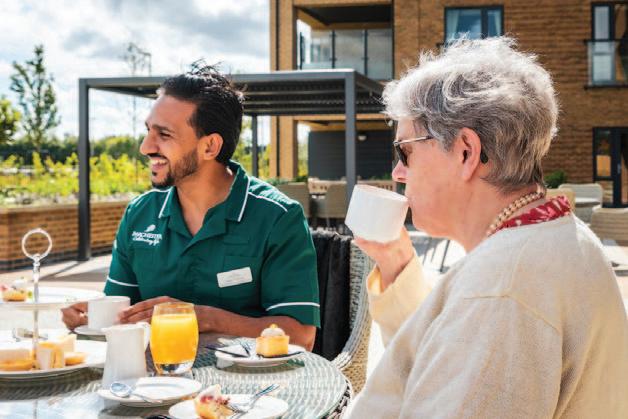
She said: “We are delighted to be entering into a new relationship with a care provider of Barchester’s calibre and reputation.
“The agreement follows in-depth discussions with Barchester’s leadership team where we were able to demonstrate our agility and ability to adapt the programme so that it best serves their employees within the complex care and hospital care division.
“This has meant us working alongside Barchester to create a bespoke curriculum that aligns with the company’s needs, values, language and behaviours.
“Consequently, the programme will have a significantly heightened focus on the mental health pathway,
including crisis intervention, mental capacity and de-escalation techniques.
“We are excited to begin work with Barchester and to be helping the business effectively to address its apprenticeship challenges.”
Realise will offer flexible solutions to accommodate off-the-job training and mentoring within varied shift patterns, including evenings and weekends.
A dedicated operations team from Realise will work on the partnership to ensure high standards of provision and good outcomes.
Other apprenticeships from Level 2 to Level 5 will also be adapted with specific pathways to meet Barchester’s needs.
Members of the Realise management team recently attended Barchester’s Quality First Conference to reinforce the new relationship, understand the business better and allow employees to sign up to the course.
A total of 33 staff are set to enrol on the 18-month Senior Healthcare Support Worker apprenticeship in the coming weeks, with more to follow soon after.
Sarah Clifford, Head of Apprenticeships for Barchester Healthcare said: “From initial meetings and introductions, Realise showed their professionalism from day one.
“They listened to our current challenges, taking them away and sharing a bespoke apprenticeship design to support our career development specifically for our Hospitals and Complex Care division.
“This included a modern innovated style of delivery which was fit for purpose and role specific, with the golden thread of embedding the curriculum in the Barchester way of working.”
For more information, visit www.realisetraining.com
New analysis from the Health Foundation estimates that an additional £3.4 billion a year would be needed by 2028/29 to avoid adult social care services from declining.
Ahead of the government’s forthcoming Spending Review, the Foundation says that this is the bare minimum required to prevent a further deterioration in services and to signal the government’s commitment to improving social care.
Anything less than this risks more people going without the care they need, a decline in the quality of care or a higher burden on unpaid carers. This new analysis comes as the Casey Commission begins its review of adult social care, which aims to set out recommendations for longer-term reform.
The government’s terms of reference state that the Commission’s interim recommendations must work ‘within the fiscal constraints of Spending Review settlements’. The Health Foundation is therefore calling on the government to use the Spending Review to signal its commitment to improving adult social care by providing enough funding to shore up services.

The analysis estimates the funding required to meet social care needs over the next decade as we live longer and to improve people’s care.
It estimates additional funding that would be needed under three scenarios:
• £3.4 billion to meet the growing demand for social care and cover rising costs to employers in 2028/29. By 2034/35 this rises to £9.1bn
• £6.4 billion to meet demand, cover rising costs, and improve access to care in 2028/29. By 2034/35 this
rises to £12.7bn
• £8.7 billion to meet demand, cover rising costs, improve access, and boost pay in 2028/29. By 2034/35 this rises to £15.4bn
Beyond investing in the current system, more fundamental reform is needed, including funding reform to provide people with fairer and more generous state protection against care costs.
The Foundation has also published new analysis of current and historical spending on adult social care. It finds that social care has seen a funding boost since the pandemic, following a decade of cuts and stagnation. Despite this, real terms spending per person on social care was 2.6% lower in 2023/24 than in 2009/10, after adjusting for population ageing.
Hugh Alderwick, Director of Policy at the Health Foundation, said; “The fiscal outlook means tough decisions for the Chancellor at the forthcoming Spending Review. Decades of political neglect mean the social care system is a threadbare safety-net, with too many people falling through the gaps.”
“The Casey Commission aims to set out a plan for social care reform, but the government’s timeline for the Commission risks more fundamental changes being ducked or delayed, despite problems in the sector being well known, so we encourage the Commission to bring forward proposals for reform as soon as possible.”
“The Spending Review is a chance for the government to signal its commitment to improving social care by providing a down payment on the investment needed for reform. This would help people get the support they need, ease the burden on unpaid carers, provide a fair wage to care workers, and support the NHS.”
This Spring, Recreo VR is offering care homes an exciting opportunity to enhance resident wellbeing through the power of Virtual Reality (VR). By signing up for one of our 24-month Recreo Theatres packages, you’ll receive a free VR headset and staff training.
Our platform provides person-centred, budget-friendly activities that are fun, engaging, and accessible, especially for residents who are bedbound or socially isolated. Co-created with Alzheimer’s Society and individuals with dementia, our service empowers staff to deliver personalised reminiscence and one-to-one sessions that promote memory recall and connection.
Our VR headsets have been recognised as good practice by the Care Quality
Commission (CQC), further validating their impact on care. Regular use of Recreo VR has a proven positive effect on wellbeing, with residents reporting increased activity, engagement, and social connection, often leading to a reduction in the need for PRN medication.
Whether combating loneliness, promoting relaxation, or enhancing cognitive health, VR offers a non-pharmacological solution to enrich care and elevate quality of life. Don’t miss out! Take advantage of this exclusive offer and see how VR can transform your care home experience.
For more information, visit recreovr.co.uk. Or contact us at info@recreovr.co.uk or 01482 526940.

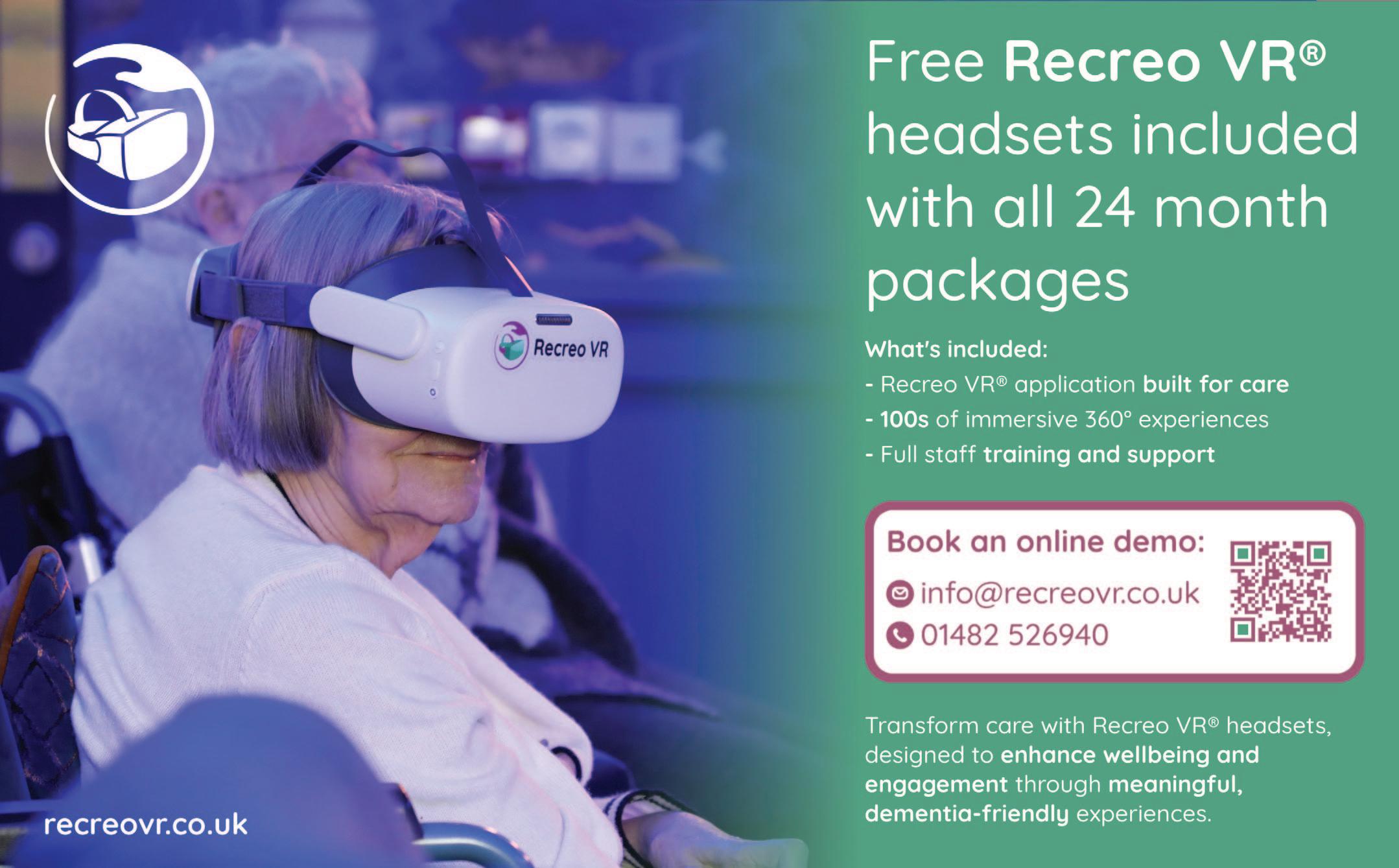
Jennifer Moore, Director
at Leonard Curtis Legal (www.leonardcurtis.co.uk) discusses the growing number of care home businesses choosing Employee Ownership Trusts and explores the benefits for founders within the care industry.

Succession is one of the most pressing and personal decisions a care business owner will make. For many founders, particularly those who have built a service rooted in compassion, community and quality of care, handing over the reins is far more than a financial transaction. It’s also about legacy.
Increasingly, owners in the care sector are choosing to exit through Employee Ownership Trust (EOT); a structure that avoids the disruption that can often accompany third party sales, while simultaneously safeguarding their values, rewarding their team and securing long-term continuity.
At Leonard Curtis Legal, we’ve supported a growing number of businesses through the transition to employee ownership. In our experience, it’s not just a legal process, it’s a cultural shift that is transforming how businesses plan for the future.
An EOT is a government-backed ownership model that allows a business owner to sell a controlling interest (more than 50%) of their company to a trust set up for the benefit of all employees. If certain conditions are met, the sale is then exempt from Capital Gains Tax (CGT), which is an obvious benefit for those planning retirement or succession.
While the trust doesn’t run the business, it does own it on behalf of the workforce. Decisions continue to be made by a management team, but under a new structure where the staff are the ultimate beneficiaries. In an industry where staff retention, engagement and continuity of care are vital, EOTs offer a compelling alternative to trade sales or private equity investment.
The values behind employee ownership align closely with the realities of social care. Businesses succeed here because of their people – the carers who turn up day after day to deliver life-changing support. Yet many of these same staff face limited recognition or reward. EOTs done well can help to rebalance that.
Businesses adopting the EOT model often benefit from improved staff retention and morale, a stronger sense of shared purpose and an increased perception of trust and credibility both internally and externally.
EOT-owned companies can also pay staff annual tax-free bonuses of up to £3,600, providing a meaningful benefit in a sector struggling to compete on wages alone.
It’s important to remember that this is a legal transaction and one that must be carefully structured. To qualify for CGT relief, several conditions must be met. The EOT must acquire more than 50% of shares and voting rights, and the company must be a trading business and not an investment vehicle. It must also benefit all employees on equal terms and the former owners must not retain control.
Once established, the trust is governed by a board of trustees usually including independent members and employee representatives. It’s vital that the governance structure reflects both the legal requirements and operational needs of a care provider.
However, in the care industry it’s not only about meeting technical criteria, we must also think about designing governance models that work for regulated services. That means considering CQC implications, continuity of leadership and long-term financial planning.
A common concern is whether a care business can afford to buy itself. In most cases, the purchase is funded through future profits of the company with the outgoing owner receiving deferred payments over time. Some providers also access third-party lending to accelerate the process.
Robust cash flow forecasting is key. Margins in the sector are often tight, so careful modelling is essential to ensure the business remains stable while making repayments. We work alongside accountants and lenders to manage this risk.
What sets EOTs apart is the ability to exit and secure a fair financial return while keeping the culture and purpose of the business intact. In a sector increasingly shaped by scale and commercial pressure, that’s a powerful proposition.
For owners who have built care services with love and long hours and who want to leave something meaningful behind, employee ownership is more than a tax-efficient exit. It’s a legacy model.
Residents of Astune Rise Care Home in Eston are set to enjoy a delightful river cruise on the Teesside Princess, thanks to the marathon fundraising efforts of their manager, Caroline Bowstead.
Caroline raised £1,500 by participating in the Middlesbrough half marathon, and the donations have been added to the home’s Residents’ Fund, which pays for extra trips, entertainers, and special treats.
The Teesside Princess will offer Astune Rise’s residents a scenic cruise along the River Tees, complete with afternoon tea and a glass of fizz. The residents will embark on a three-hour return trip from Stockton to Yarm, taking in the beautiful landscapes and wildlife along the way.
Caroline, who has been with Astune Rise for more than a decade, said: We took some residents on the Teesside Princess last year and it was great fun. Everyone dressed to the nines in gowns and tuxedos and had an amazing time with their friends and family.
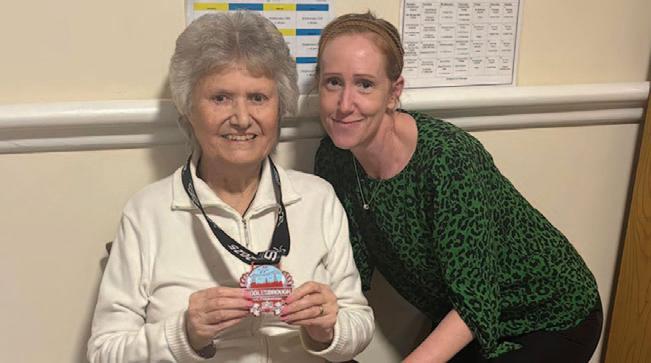
“We knew we wanted to do it again, but because of various travel requirements it can be expensive to get them all there, so we needed to raise some extra money. I laced up my running shoes and hit the
streets of Eston to train for the Middlesbrough half marathon!”
“I am overwhelmed by the generosity of the Middlesbrough community who have helped me to raise this money, which will help make the lives of Astune Rise’s residents even better and give them, and their families, amazing memories on the Teesside Princess.”
“I had amazing encouragement and support from the company, family, friends and colleagues during my training, which was really needed, especially at the start when I started thinking to myself ‘what on earth am I doing’!”
Steve Massey, Operations Manager for Popular Care, praised Caroline’s efforts. “Caroline’s dedication to the residents is truly inspiring. She lives to make their lives better and is always working on something to put a smile on their faces – even at the cost of her own happiness while training hard for this run!”
“I can’t wait to hear all about their river cruise and the fun they get up to on board. She certainly keeps our residents at Astune Rise busy!”
Lancashire Fire and Rescue Service (LFRS) has recently concluded their prosecution case against a fire alarm engineer company for their failure to comply with the Regulatory Reform (Fire Safety) Order 2005, which subsequently put the lives and safety of residents and employees of a care home at risk.
On 1 December 2020, Fire Safety Officers inspected a care home in Thornton-Cleveleys.
The fire safety breaches posed a serious threat to the life and safety of all residents and staff of the care home. Resulting in the issuing of a Prohibition Notice on the premises.
At the time of the inspection, the care home was occupied by 45 elderly and vulnerable residents, as well as the staff employed by the care home. Over the following two weeks, a co-ordinated multi-agency approach was followed to relocate the residents into other available care facilities.

As a result, Lancashire Fire and Rescue Service prosecuted Fylde Fire Systems Limited for their failure to comply with the Regulatory Reform (Fire Safety) Order 2005 (FSO), which they pleaded guilty to on 15 October 2024.
THE THREE OFFENCES TO WHICH FYLDE FIRE SYSTEMS LIMITED PLEADED GUILTY TO WERE:
• Failure to ensure the premises were equipped with appropriate fire detectors and alarms. Article 13(1)(a) FSO.
• Failure to safeguard the safety of relevant persons by ensuring that any facilities, equipment and devices provided in respect of the premises were subject to a suitable system of maintenance and were maintained in an efficient state and in an efficient working order. Article 17(1) FSO.
• Failure to co-operate with other responsible persons, so far as was necessary to enable compliance with the requirements placed upon them. Article 22(1)(a) FSO.
FYLDE FIRE SYSTEMS LIMITED WERE SENTENCED AND RECEIVED THE FOLLOWING SANCTIONS: • A fine of £30,000, and a £2,000 victim surcharge for failure to comply with the above articles of the Fire Safety Order.
• Fylde Fire Systems Limited was also ordered to pay £18,725 in costs to Lancashire Fire and Rescue Service.
Ian Armistead, Protection Department Group Manager for Lancashire Fire and Rescue Service, said: “This Prosecution sends a clear message that any company or individual that has a responsibility for undertaking fire safety duties or works, must do so competently and adequately.”
“Fire safety and protecting those that occupy any regulated premises must always be a priority. In this instance Fylde Fire Systems Limited failed to protect those people that were reliant upon them for helping to keep them safe from the risk of fire and ultimately left Lancashire Fire and Rescue Service with no other option than to take regulatory action against them.”
“This outcome sends a strong message to all fire alarm companies and fire safety professionals alike, that you must be competent to perform any type of fire safety duties, especially when you are working in complex, high risk premises types where those that occupy the premises are reliant on you to help keep them safe.”
“It is also important that anyone who is deemed as a responsible person(s) under the Fire Safety Order 2005, ensures that they engage and employ only suitably qualified and competent persons to undertake works.”
Exemplar Health Care, a leading provider of nursing care for adults living with complex needs, celebrated International Nurses Day with a creative travelling photo exhibition.
The ‘What my Nurse means to me’ exhibition, hosted at Sheffield’s Meadowhall and Birmingham’s NEC, featured a collection of photographs of Exemplar Health Care’s residents and their Nurses. The pictures, which included posed portraits as well as playful, candid images, offered a glimpse into life at Exemplar Health Care’s homes and the impact of its nurses.
The exhibition also showcased personal testimonials from the people they support throughout, each exploring what the Nurses at their homes mean to them.
Adam, a resident at Greenside Court in Rotherham, reflected on his relationship with the home’s Clinical Nurse Manager, Caroline:
“I was in hospital when Caroline came to assess me. I was terrified, but the welcome I got was unbelievable. Every day Caroline has a smile and is easy to talk to about anything. She’s helped me believe again, which means everything. Thank you so much. You're a brilliant Nurse!”
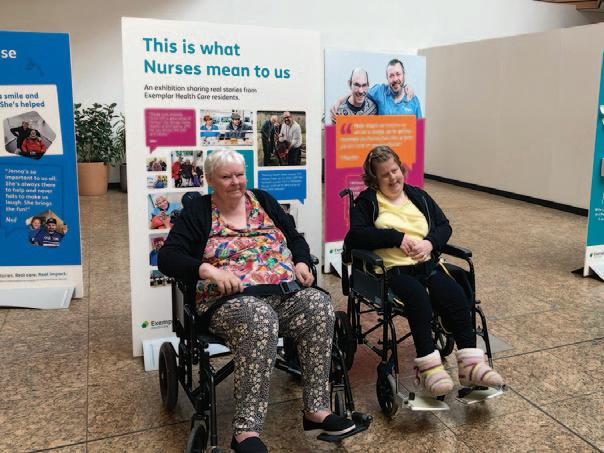
The quotes reflected the compassionate, person-centred care delivered by dedicated Nurses across the organisation.
Dave, a resident at Willowbeck in Sheffield, commented on his appreciation for his Nurse, Kajal: “Having incredible Nurses means I can join in celebrations – including St Patrick’s Day! I appreciate Guinness, but I appreciate our Nurses more! Thank you all.”
The displays were a warming tribute to Exemplar Health Care’s Nurses, honouring their invaluable com-
mitment to making every day better for the people they support.
Alongside photographs, the exhibition featured an interactive area, where visitors could leave heartfelt thank you messages for the Nurses they know or who have helped them.
One visitor noted:
“Thanks to the incredible Nurses that looked after my Nana. We’ll never forget you!”
As well as providing an opportunity for Nurses and the people they support to reflect and celebrate, it also gave the public a chance to learn more about nursing careers.
A soon-to-be-qualified Nurse attending the exhibition left a message of encouragement:
“To my fellow ‘about to qualify’ Nurses, thank you, you’re amazing and keep going. We’ve got this!”
Lianne Ford, Head of Nursing at Exemplar Health Care, said:
"We wanted to do something a little different to mark International Nurses Day this year – something that not only celebrated our Nurses but also gave the people we support the opportunity to express just how much of a difference Nurses make in their daily lives. The response has been overwhelming, and it’s been incredibly moving to see the beautiful messages and photos shared throughout the exhibition. Our Nurses are at the heart of everything we do, and this has been a wonderful way to showcase their impact."
Beyond the exhibition, homes have continued to celebrate Nurses online, sharing heartfelt videos on social media featuring messages of thanks from colleagues, the people they support, and their families.
A Newcastle community has come together to plant nearly 300 trees to improve biodiversity, promote green environments and protect against flooding.
More than 250 trees of various species, were planted at Kenton Dene with the assistance of community groups including Kenton Manor Care Home, Friends of Kenton Dene, local Scouts groups, and Kenton Park Sports Centre, with support from the North East Community Forest initiative led by Newcastle City Council and facilitated by Northumberland Wildlife Trust.
The species chosen for this project were specifically selected to provide biodiversity and provide seasonal interest, such as autumn colours and spring blossom, as well as their wildlife value, providing berries for birds and other native species. They include Sweetgum, Mountain Ash, Birch, Cherry, Weeping Willow, Lebanese Cedar, Beech, and Oaks.
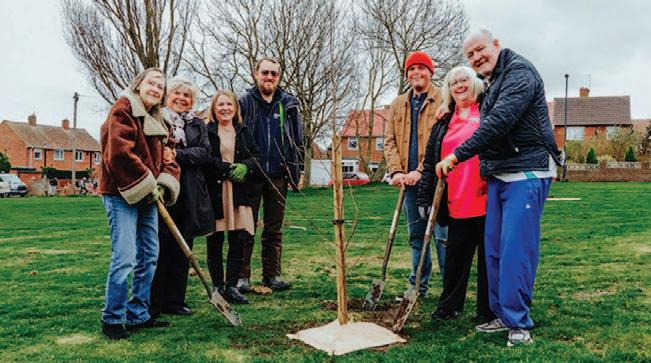
The tree planting event at Kenton Dene is part of a broader effort to create a sustainable and resilient environment in Newcastle. The North East Community Forest initiative, operating in the southern parts of Northumberland, the entire geographical boundaries of Newcastle, North and South Tyneside, Gateshead, and Sunderland, plus the urban parts of Durham, have a long-term goaltoincrease tree canopy coveracross their areafrom a baseline of 13% to 30% – almost double the current national average.
Kellie Brown, Home Manager at Kenton Manor, part of Solehawk Care, said: “We are thrilled to be part of this wonderful initiative that is going to brighten our area and provide a lovely environment for local people to enjoy. It’s a fantastic opportunity for our residents to engage with the community and contribute to the environment. Some of residents love to sit by the window which overlooks the Dene and this will really enhance the view, which will be truly beautiful when the blossoms arrive.”
Cllr Alex Hay, Deputy Leader and Cabinet Member for Neighbourhood Services, Newcastle City Council said: “This tree planting event is a testament to the power of community action in tackling climate change and enhancing biodiversity. Each tree we plant today contributes to a greener, more resilient city, and the enthusiasm and support from everyone involved is both heartening and essential.”
Callum Williams, Community Forest Officer from Northumberland Wildlife Trust also shared his thoughts: “The involvement of Kenton Manor and other community groups in this project is crucial. By involving people in the tree planting process, they gain a connection to nature in their local area, and will help in keeping an eye on the trees. Trees play a vital role in our ecosystem, and their benefits extend far beyond aesthetics. They provide shade, manage flood risk, and provide habitats for various species.”
Following the British Dietetic Association’s (BDA) rollout of the Care Home Digest last year, Bidfood, one of the UK’s leading wholesalers, has produced an industryleading, four-weekly menu cycle, aligned with the Care Home Digest.
Designed to support care operators in implementing the guidelines, the menu cycle offers unrivalled inspiration for Bidfood’s care customers, featuring over 300 Care Home Digest-aligned recipes available for download.
Until last year, healthcare foodservice guidelines were mainly aimed at hospitals, leaving care operators, many of which don’t have access to a dietitian, without tailored resource to support with menu planning.
However, using the new Digest, Bidfood’s expert chef and nutrition team have collaborated to develop this extensive bank of recipes and four-week menu cycle.
The cycle demonstrates how operators can align their menus to meet the unique needs and preferences of their individual residents, incorporating food waste tips and a variety of dish types to suit a range of kitchen skill levels.
The menu plan features a balance of food groups including both animal and plant-based proteins, higher-fibre carbohydrates, “healthy” fats and plenty of fruit and vegetables, maximising levels of key nutrients such as protein, fibre and essential vitamins and minerals. The team have also worked hard to reduce sources of saturated fat, free sugars and salt where possible.

What’s more, every recipe has been nutritionally analysed and adjusted, tweaking both the ingredients used and the quantities, to ensure that nutrition is prioritised whilst also balancing taste, cost and other factors.
Nutrition Manager, Heather Dolan said “At Bidfood we pride ourselves on an evidence-based approach to nutrition, so we were delighted when the BDA’s Care Home Digest was released. We’ve been working on this menu ever since, with the aim of helping care homes to implement the Digest, and ultimately, supporting them in meeting residents’ nutrition and hydration needs.
“It’s been a pleasure collaborating with our healthcare chefs on this project. They’ve brought a wealth of culinary expertise and creative flair to the project. Together, I believe we’ve struck the perfect balance of classic dishes and fresh, innovative concepts.”
To view the four week menu cycle, please visit https://view.bidfood.co.uk/bidfoods-four-weekly-menu-cycle/?page=1
The British Dietetic Association’s Care Home Digest was created to support care homes in developing varied and balanced menus that will tempt residents to eat and drink well, whilst being designed as a toolkit that makes it easy for care operators to dip in and out of chapters as needed. For more information on the Care Home Digest, visit here

Interactive entertainment in care settings is becoming far more than a pleasant pastime - it’s vital for mood, cognitive, and mental health. Studies show that older adults who regularly participate in activities offering mental stimulation and social engagement experience cognitive decline approximately 15 percent slower than those who don’t.
What was once considered purely recreational is turning into something essential; a powerful tool for preserving cognitive function and enhancing quality of life. Memory games, learning new skills, and interactive experiences that bring joy to residents offer more than just fun; they provide vital mental exercise and create the social connections we all need to thrive.
Research shows that providing sensory care and environments is crucial for supporting the well-being of people living with mild to moderate dementia. Thanks to a grant from the Veterans’ Foundation in late 2024, we introduced a specialised sensory room at our Belvedere House nursing home in Banstead. This space, designed for residents living with dementia, incorporates a variety of sensory therapies to encourage cognitive engagement and enhance overall mood.
We’ve also recently introduced an interactive screen for residents. It offers a wide range of features, including games, artistic activities, and video communication tools. These applications go far beyond entertainment – they offer valuable opportunities for mental stimulation while also helping loved ones stay connected, even when they can’t visit in person. Digital quizzes and games provide a fun and meaningful way for residents to engage their minds and enjoy shared experiences with peers.
We’ve learnt that technology in the care sector serves both educational and recreational purposes. Activities can be tailored to match individual capabilities and interests, allowing for independent use or group participation. Clinical staff have noted that the technology sometimes serves as an entry point for more hesitant residents, who may engage individually before feeling comfortable joining group activities. These shared digital experiences spark social bonds, encourage collaboration, and help residents feel connected to life beyond the home.
As digital technology becomes increasingly integrated into daily life, care environments benefit from thoughtful adoption of these tools. Many of today's older adults have witnessed significant technological change throughout their lives and easily adapt to new systems when introduced in the right way.
By David Dominy, CEO at The Royal Alfred Seafarers' Society (www.royalalfredseafarers.co.uk)
Additionally, access to current technology can help residents maintain a sense of connection to the broader world beyond the care home.
OTHER FORMS OF ENTERTAINMENT
Beyond technological innovations, we’ve seen firsthand how offering a variety of entertainment options addresses residents' various social, emotional, and cognitive needs. We host regular live concerts featuring local musicians, seasonal pantomimes, and structured music and seated dance sessions - all carefully organised to resonate with residents' preferences and abilities.
These musical experiences serve multiple therapeutic functions. For many residents, familiar melodies act as powerful memory triggers, often prompting spontaneous recollections of significant life events. Staff observe that even residents who struggle with verbal communication frequently respond to music, sometimes singing along to lyrics they haven't spoken in years. This is especially true for residents living with dementia, for whom verbal communication can be a challenge. These musical moments help reduce feelings of stress and isolation while providing an outlet for emotional expression.
Animal therapy is also a significant component of our engagement programme. In December, Belvedere House welcomed therapy ponies from Kingswood Shetlands and Friends as part of an animal therapy initiative. These visits create unique opportunities for sensory engagement, with residents able to touch, observe, and interact with the animals in a homely environment.
The benefits of such animal interactions are well-documented. The mental health charity Mind notes that spending time with animals can significantly reduce stress levels and elevate mood. For residents with dementia, these benefits can be particularly meaningful. According to the Alzheimer's Society, interacting with animals often enhances self-esteem and confidence, promoting quality of life and supporting independence.
Activities and entertainment that aren't just about filling time - they make a real difference in residents' lives. Whether trying new technology in the sensory room, enjoying a concert, connecting with therapy animals, or sharing stories from their past, these experiences help keep minds active and spirits high. Such entertainment brings genuine joy and connection to daily life within care homes.
Interactive entertainment plays a vital role in the care sector, supporting emotional wellbeing, cognitive engagement, and social connection - all of which are just as important as physical health. Recreation shouldn't be one-size-fits-all; the most effective activities are tailored to reflect residents' individual interests, backgrounds, and abilities. At Royal Alfred, we see this in practice through a varied and personalised programme, reinforcing the broader commitment across the sector to delivering exceptional person-centred care.
Residents and staff from Lower Meadow Care Home, part of the Runwood Homes Group, enjoyed an unforgettable day out on Saturday 3rd May, attending the vibrant Stratford-Upon-Avon Music Festival – with one very special performance stealing the show: an ABBA tribute band that brought lifelong dreams to life.
The visit was inspired by the residents’ very own 'bucket list,' where attending a music festival and seeing ABBA in concert were top wishes. Seven residents, accompanied by Home Manager Rachel, three dedicated staff members, and two wonderful volunteers, made their way to the festival where they danced, sang, and shared special moments with the local community.

Resident Sheila reflected on the experience, saying, "It was marvellous. I’ve always wanted to go to a music festival, so tick that one off the list."
The atmosphere was electric, with residents dancing alongside festivalgoers. Many members of the public stopped to chat and even offered to visit Lower Meadow to perform. One particularly touching highlight came when resident Randy, who is living with dementia, had the chance to step back into a cherished part of his past. Having once worked on fairgrounds, Randy was invited to assist the ticket collector at the Waltzer ride. With joy in his eyes, he shared, "Some of the best days of my life were spent in a Gypsy caravan, working on the fair."
The day featured performances by tribute acts including Luke Combs, Arctic Monkeys, and the much-loved ABBA band. The residents were overjoyed to also receive a special shoutout from the MC on stage, adding additional excitement to the outing. This heartwarming day truly embodied the spirit of community, inclusion, and living life to the fullest—no matter your age.
PASS by everyLIFE has today (Wednesday, 30th April) announced the launch of PASSgenius™, a powerful new suite of data, AI and automation tools built into its award-winning care management software – marking a major step forward in digital innovation for social care.
Designed to turn complex data into clear, actionable insight, PASSgenius™ helps care providers make faster decisions, plan smarter rotas, reduce admin and stay ahead of risk – using the information they already collect.
As providers continue to face rising pressures - from tighter regulation to financial strain and staff shortages - the new innovative technology empowers care teams do more with less, improving quality, compliance and operational performance.

Commenting on the launch, Robin Batchelor, CEO of PASS by everyLIFE, said: “Care providers are under more pressure than ever. With PASSgenius™, we’re giving them the tools to unlock the power of the data they already hold, helping them make better decisions, deliver safer care and free up time for what really matters.”
One of the standout features of PASSgenius™ is its AI-powered care note summaries – a tool that can scan weeks of care logs in seconds and highlights key changes in behaviour, health or mobility, helping teams identify risks earlier and provide more responsive, person-centred support. Instead of reviewing long records manually, users receive concise summaries and recommendations that surface what’s changed and what needs attention, improving both care quality and continuity across shifts.
At the heart of the new suite is the PASSgenius™ Dashboard – a fully interactive, customisable dashboard that provides real-time oversight across key performance areas, such as:
• Required hours: Spot gaps in care hours early and plan ahead
• Pending hours: See unassigned visits and fill them faster
• Travel time: Flag long journeys and improve routing
• Punctuality: Track lateness trends and take action sooner
• Cancelled hours: See costly cancellations and reduce repeat offenders
• Missed and overdue visits: Catch missed visits fast and protect care quality
With live data in one view, managers can quickly spot where hours are missing, identify risks, and take action without digging through spreadsheets or switching between systems.
A full suite of automation tools has also been brought together under the PASSgenius™ banner, helping services streamline day-to-day tasks like timesheet verification, payroll calculations and invoicing. In-built reminders and alerts help keep teams on top of compliance, while automated workflows reduce paperwork and improve consistency across the board.
There is no need for bolt-ons or third-party software as all tools work seamlessly within PASS, and the suite will continue to expand throughout 2025, with planned updates including additional dashboard modules and exciting new AI tools.
Duncan Campbell, Commercial Director, PASS by everyLIFE, added: “This launch is more than a feature update. It’s a step change in how care services use technology. By bringing together live data, automation and AI, PASSgenius™ gives care teams the oversight and support they need to run stronger, more efficient services.”
is available now at no extra cost to All-in-one

We offer high-quality residential, nursing, dementia and respite care in a welcoming and engaging environment. Arrange a visit to discover comfort, companionship, and expert care.
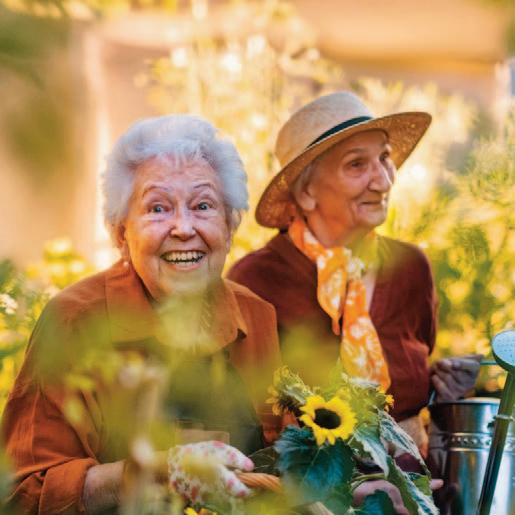
In a recent episode of Eastenders, Nigel, who has been diagnosed with young onset dementia – where a person develops dementia before the age of 65 - believes he’s in 1995 witnessing the 50th Victory in Europe Day (VE Day) celebrations, not the 80th VE celebrations in 2025, as a result of experiencing a symptom of dementia called time-shifting.
Over 70,800 people in the UK are living with young-onset dementia. Here, Alzheimer’s Society provides an overview on what time-shifting is and how to support someone who is experiencing time-shifting.
WHAT IS TIME SHIFTING?
Time-shifting is when a person with dementia may seem to be experiencing a different reality to you. This could present itself as not understanding what recent technology is or does, not recognising family or friends, or thinking someone who has died is still alive. They may not even recognise their own reflection.
HOW TO SUPPORT SOMEONE WHO IS TIME SHIFTING
Angelo Makri, Senior Knowledge Officer at Alzheimer’s Society, offers advice on how to support someone who is time-shifting.

“I would advise the carer to stay calm, open and friendly. It can be very upsetting for person with dementia if you try to correct them. So, if they are happy and content, it is best to just focus on what would make them feel most comfortable. Often you won’t be able to convince them to recognise their current situation or that time-shifting is not logical. Below are some tips on how best to manage the situation.”
• Try to remember that what the person perceives is as real to them as your reality is to you. Time-shifting is
due to damage to the brain and it’s not a choice.
• When you enter the room, let them know who you are. This helps prevent confusion and them mistaking you for someone from their past.
• Try and understand their reality and acknowledge their worries.
• Try not to contradict their experience. They shouldn’t be told what is true in a confrontational manner.
• The person with dementia doesn’t need to fully understand your reality for them to feel happy, so continue to try and do what makes them feel content.
WHAT ARE THE SIGNS AND SYMPTOMS OF DEMENTIA?
Each person experiences dementia in their own individual way.
Different types of dementia also affect people differently, especially in the early stages. There are, however, some common early signs and symptoms of dementia, including:
• Memory Loss
• Difficulty concentrating, planning or organising
• Problems with language and communication
• Misunderstanding what is being seen
• Being confused about time or place
• Mood changes or difficulty controlling emotions
It may be upsetting to witness someone you love no longer recognising themselves or getting easily confused. If you need support, please contact our Dementia Support Line on 0333 150 3456, or visit www.alzheimers.org.uk
For many seasons Dave faithfully filmed Wimborne’s football club’s games, home and away, in all weather conditions. Dave videoed every game and would set up cameras in all four corners of the pitch. The club’s board of directors decided to honour Dave for his dedication and commitment over the years when he retired by naming the splendid new media tower “The Dave Briggs Memorial Tower”. Yesterday, the Upton Bay care home community gathered to bid a heartfelt farewell to our dear late friend, David Briggs, at a touching memorial during the Wimborne Town vs Basingstoke football match. Residents watched the game and enjoyed a delicious lunch of fish and chips in his memory. Upton Bay is based in Hamworthy and cared for Dave in his final years.
Sponsored by David's family, the event was a beautiful tribute to a cherished member of our community. David, a former member of the team, holds a special place in our hearts, with the media box now proudly bearing his name.
Jeff Robbins (Kit Man) said “I knew Dave for most of my time at the club as Kit man. Dave would have to clime up a rickety old ladder tied to the scaffolding with robe and clamber on the platform to take his video footage. Sometimes it would be howling with wind and rain but this never deterred his dedication and commitment to the Magpies”.
Mevin Sohorye, General Manager, Upton Bay care home remarked “It was a day filled with memories, love, and unity as we celebrated the life of a remarkable individual who will forever remain in our thoughts”.
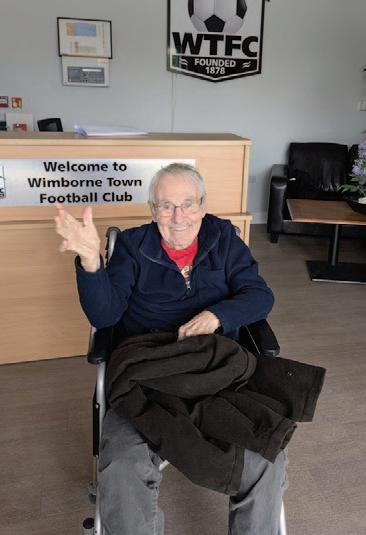
A Middlesbrough home is appealing to its community to help find some “Aycliffe Angles” and invite them to visit the home.
MHA Montpellier Manor is home to Jo Allan, one of the 17,000 women employed at the ROF munitions factory in Aycliffe.
They were known as “the Aycliffe Angels” after Nazi propagandist Lord Haw-Haw threatened “Those little angels in Aycliffe will never get away with it.”
After Jo’s memories in relation to the World War and VE DAY were converted into a press release, the story got picked up by the local press.
This led to the home receiving some information regarding another Aycliffe Angel, who is hoping to visit the home and spend some time with Jo.
The home then decided to try and reach as many of these angels as possible and are urging them or their family members to come forward and visit them on the 29th of May from 11am, to have a coffee and a chat.

Kelly Deane, deputy home manager said: “The idea came off the back of Jo’s story and it led us to think there will still be some Aycliffe Angels out there.
“We have received a request from one family, who would like to bring their mum in to visit Jo.
“Jo’s family are also very keen and will be attending on the day.
“It’s an open event, and we encourage family members of the angels to also attend
“We would like visitors to bring with them any pictures or memories they have from their time of working at the factory, and we will create a memory board from that.
“These job roles or factories are unheard of in the current climate, so it will be interesting to see what we can learn from them and what type of jobs they did.
“We are hoping to see plenty of these angels and look forward to welcoming them into MHA Montpellier Manor.”
Jangro’s Soft Dry Wipes set the standard in personal care, offering a trusted solution for both comfort and hygiene. Designed for everyday use in healthcare environments and care facilities, these wipes provide an effortless way to cleanse while being exceptionally gentle on even the most delicate skin.
Made from 100% non-woven cellulosic material, the wipes offer a softness that’s kind to fragile skin, ideal for patients with skin conditions or heightened sensitivity. Whether used in hospitals, care homes or in domiciliary care, they ensure reliable hygiene without causing irritation.
Supporting both daily hygiene routines and specialist skincare needs, these wipes are an essential part of providing dignified, effective patient support. Their generous size and high absorbency make them particularly suitable for full-body cleansing, helping caregivers maintain comfort and cleanliness with minimal effort.

Jangro’s Soft Dry Wipes are distinguished by their perfect balance of softness and durability. Expertly
designed as cleansing wipes, they offer superior strength while maintaining an incredibly gentle feel on the skin. The high-quality construction ensures they won’t tear during use, delivering consistent reliability with every wipe. Perfect for daily patient care, these wipes provide the ideal combination of comfort and effectiveness for every hygiene routine.
Manufactured in the UK under ISO 9001, 13485, and 14001 certifications, these wipes meet rigorous standards for quality, medical-grade safety, and environmental responsibility. Each pack is conveniently dispensed from a waterproof packet, maintaining hygiene and ease of access in busy care environments.
Whether you’re aiming to elevate patient care or streamline hygiene routines, Jangro’s Soft Dry Wipes are the trusted choice. Choose Jangro for a product that prioritises comfort, performance and sustainability. Discover how Jangro can support your cleaning needs by visiting www.jangro.net
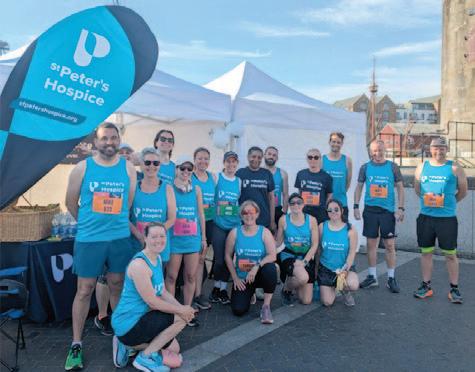
for the cause. They joined thousands of others to complete the scenic 10k challenge around the streets of Bristol. The event also has a half marathon option for more seasoned runners.
Made up of staff from the fundraising, marketing and clinical teams, the group battled the heat to complete the course.
St Peter’s Hospice Legacy Manager, Matt Crother, said: "The money that we and other runners raise for the Hospice means that our Nurses can continue to support people in their homes and at our Inpatient Unit. There's something special about running in our home city to raise money for the local community!"
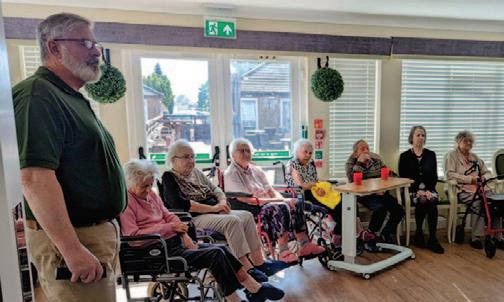
Staff and residents at Hickathrift House Care Home in Marshland St James, Wisbech, welcomed Andrew Callaghan, Community Development Worker of the Fenland Orchards Project for an educational talk on the history of the project, their current workshops and future plans for the orchard.
Residents and staff all gathered for Andrew to share his passion for the project and learn all about the current work they do for the community. The

residents were captivated by the design and the traction the project has received since starting 4 years ago. The detailed informative talk, sparked memories and conversations between the attendees and brought back fond experiences of growing fruit.
General Manager of the home, Paula Melerski said: “This has been very educational for all of us. Both residents and staff have thoroughly enjoyed learning more about the Fenland Orchards Project and the importance this project has had in our community. At our monthly speaker events we welcome any opportunities to learn about the area and the passions of locals”.
Dorothy, a resident at Hickathrift said, “It was just fascinating to hear about this local project and the good it is doing for the community. I remember when Fenland was full of orchards and having this specific place is just wonderful. What an amazing job Andrew and others are doing”.

• We specialise in the sale and purchase of quality used wheelchair accessible vehicles and ambulances.
• They can be bought as seen or refurbished and sign-written to your own requirements.
• Fully serviced, new mot & warranty
• Engineers inspection supplied if required.
• Free delivery service available
• All buses comply with new legislation
•
• Lease hire and purchase


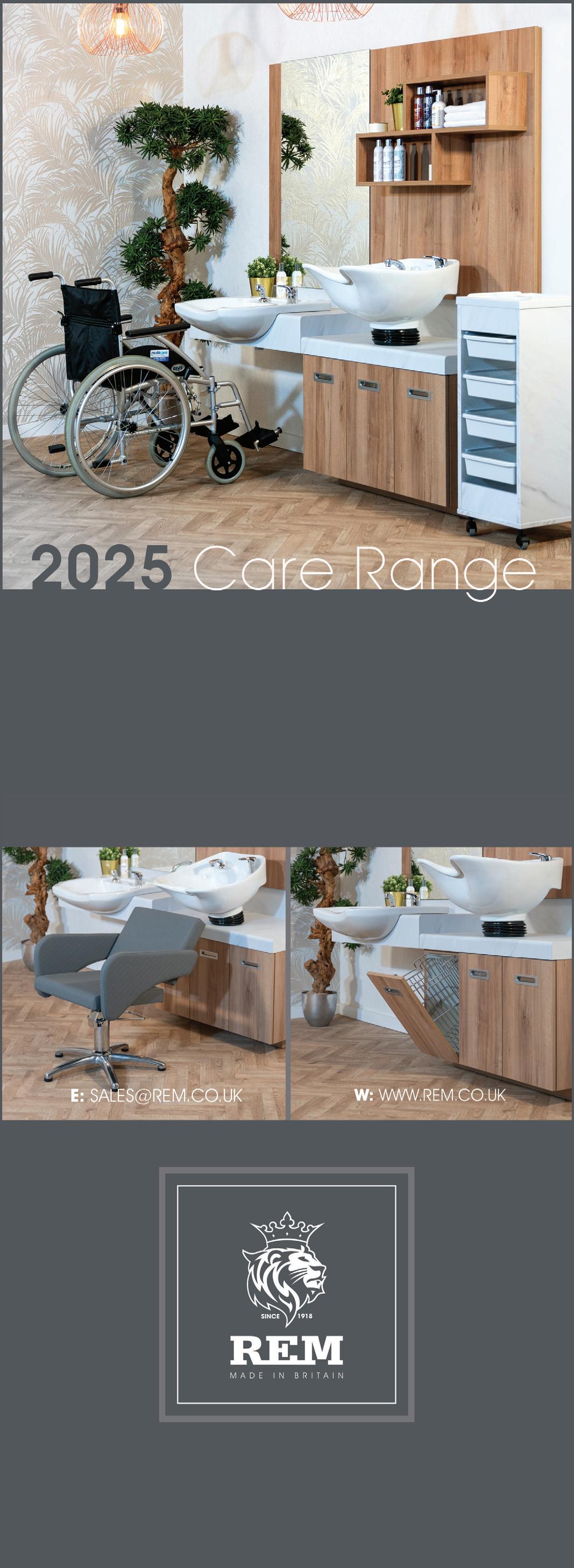
REM have been manufacturing furniture for the Hair & Beauty Sector for over 100 years and are now considered to be one of the largest manufacturers in both the UK & Europe. Understanding the growing requirement for Care & Residential Home Salons, REM’s Design Team have produced the Pendle Care Range for the Small, Compact Care Home Salon.
A new publication by the International Longevity Centre UK (ILC), supported by the Alzheimer’s Society and the Peter Sowerby Foundation, warns that the nearly one million people living with dementia in the UK are woefully under-supported, with care and support patchy, unequal and under-resourced across the country.
The report – Living well with dementia through care and support: it’s not rocket science – uses the latest facts and figures available to argue that better post-diagnostic support, greater investment in prevention and a shift to community-based care could help people live better for longer with dementia, while easing pressure on hospitals, carers and overstretched services.
Currently, more than one in three people with dementia in the UK remain undiagnosed. Without a diagnosis, people are less likely to access support, more likely to end up in A&E, and often left to manage alone. Even after diagnosis, many receive no formal care plan and limited follow-up. In England, just over two in three people with a recorded diagnosis have any kind of care plan in place, and just one in two in Scotland. Across the UK, dementia support remains a postcode lottery.

The report spotlights interventions including the PriDem model – a practical, evidence-informed approach that integrates primary care, personal care planning, and community-based support. In pilot areas, PriDem has already increased the proportion of people with tailored care plans from 37% to nearly 65%.
COST OF DEMENTIA
The cost of dementia in the UK has already reached £42 billion – and is projected to more than double to £90–£95 billion by 2040. Much of this cost is borne by families and unpaid carers, the majority of whom are women. ILC argues that better dementia care is not only the right thing to do – it also makes economic sense. Previous ILC research finds that adapting high streets and local services to be more dementia-friendly could unlock an additional £948 million a year in consumer spending.
THE REPORT CALLS FOR:
• Universal personalised care plans for everyone diagnosed with dementia
• Investment in prevention, including midlife brain health checks that improve education and ultimately early diagnosis rates
• Support for family carers, including scaling up piloted interventions like PriDem.
• Better dementia training for care workers and healthcare professionals
• More dementia-inclusive services, from the high street to the GP surgery
As Andy Burnham, Mayor of Greater Manchester, reflected at ILC’s Future of Ageing conference: “You can live well with dementia. But right now, too many people are left in a dark place – without the support or practical help they need when the journey begins.”
Professor Dame Louise Robinson, who led the PriDem research at Newcastle University, said: “Living better with dementia is not rocket science. We don’t yet have a cure – but we do know how to help people live well. What we need now is investment and political will to make that support universally available.”
David Sinclair, ILC Chief Executive, added: “We’re facing a dementia emergency – but also an opportunity. With simple, practical steps, we can help people live better for longer, reduce hospital admissions and support family carers. This isn’t a distant ambition – it’s something we can do now. It just needs action.”
Dr Richard Oakley, Associate Director of Research and Innovation at Alzheimer’s Society, said: “Dementia is the biggest health and social care challenge of our time and the devastating impact is enormous – on the lives of those it affects, on the healthcare system and on the economy, which is why we are proud to fund the evidenced-based PriDem model alongside the Peter Sowerby foundation that could radically improve the quality of post-diagnostic care.”
“This model demonstrates the value of research in developing evidence-based care, significantly boosting the number of people with tailored care plans in the pilot areas and critically this work supports not only the person living with dementia but their families and carers.”
“Urgent action is needed to improve post-diagnostic care to help people manage dementia symptoms and avoid ending up in crisis.”
“Research will beat dementia, but it needs investment and commitment from government to provide evidence-based care for everyone affected by dementia across the UK, no matter where they are.”
HC-One’s Hambleton Grange Care Home, in Thirsk, North Yorkshire, erupted in cheers and applause after carer Dawn Parker-Eland and senior carer Alan Richardson faced off in an inspiring press-up challenge to raise over £500 for the home’s residents.
The event, born from Dawn’s personal journey through grief, transformed a heartbreaking loss into a triumphant celebration of community spirit. In January, Dawn was devastated by the loss of her beloved family horse.
Determined to channel her grief into something positive, she threw down the gauntlet to Alan, challenging him to a test of strength and endurance. This led a personal goal to quickly grow into a sponsored event to fund enriching activities for Hambleton Grange residents.

After four months of preparation, the challenge culminated in a lively evening that capped off a week of sporty activities and screenings for residents. The event kicked off at 7pm with a special appearance by local celebrity and veterinarian Julian Norton,
who delighted the crowd with his own press-up performance and officiated the challenge.
Dawn shared a moving speech about how the event helped her cope with her loss, setting an emotional tone for the evening. With a packed room of residents, relatives, and supporters cheering them on, Dawn powered through an astonishing 60 press-ups, while Alan delivered a valiant 34.
Sponsors who guessed the closest to the competitors’ press-up totals were awarded prizes, with two relatives of residents and work experience student Lavinia emerging as the lucky winners. The funds raised –£630 – will directly support Hambleton Grange residents, enhancing their quality of life through new activities and experiences.
Dawn Parker-Eland, HC-One’s Hambleton Grange Carer, said: “The support has been phenomenal. This challenge not only helped me heal from the loss of my horse but brought our entire community together for a cause that means so much to us all.”
Epsom’s Linden House Care Home has appointed a new senior management team as it looks to enhance the lives of its residents.
Lucy Perry has taken the helm as the new care home manager, with Claire Arney stepping in as deputy care home manager. This change marks an exciting new chapter for Linden House, part of Wren Retirement Living, renowned for its warm and welcoming atmosphere, and diverse calendar of resident activities.
Lucy, a seasoned professional with more than 15 years of experience in the care sector, brings a wealth of knowledge and a deeply personal commitment to her role. Hailing from Carshalton, Lucy’s journey into care began when her grandfather was diagnosed with cancer. Witnessing the lack of person-centred care he received, she was inspired to make a difference and embarked on a career in care.
Lucy, who has a Diploma in Health and Social Care Management, has extensive hands-on experience having risen through the ranks from starting as a carer, progressing into management positions. She is passionate about providing residents with a fulfilling life and is keen to introduce more musical, intergenerational, and animal therapy activities to Linden House.

She said: “Working in care should be a passion, and not just a job. I came into this industry because I wanted to provide people with the kind of care that I would want my own family members to have. Just because someone lives in a care home, it doesn’t mean they can’t have a happy and fulfilling life, and it’s
really important that we give members of our community all kinds of experiences and keep them busy.
“I am a huge animal lover and I’m looking forward to bringing my pets – a snake, a tortoise, four dogs, a cat, and koi – to interact with the residents.”
Lucy is supported by a new deputy care home manager, Claire Arney, who returns to the care sector after a six-month break to work at a local safety company, supporting carers and other publicfacing professions. She has eight years of care experience, having been inspired by her sister’s passion for the industry to seek a career in the sector.
Claire said: “I missed the job and the residents. Helping them is a part of who I am. Being away from the care sector made me realise how much I value the strong relationships that as a carer you build with residents, their families, and colleagues. I am committed to creating a happy and supportive environment at Linden House, where everyone feels valued and cared for. My goal is to ensure that our residents not only receive the best care but also enjoy a vibrant and engaging community life.”
Alison Boote, operations director of Wren Retirement Living, said: “We are thrilled to welcome Lucy and Claire to Linden House. Their combined experience and passion for care will undoubtedly enhance the quality of life for our residents. We look forward to seeing the positive impact they will make.”
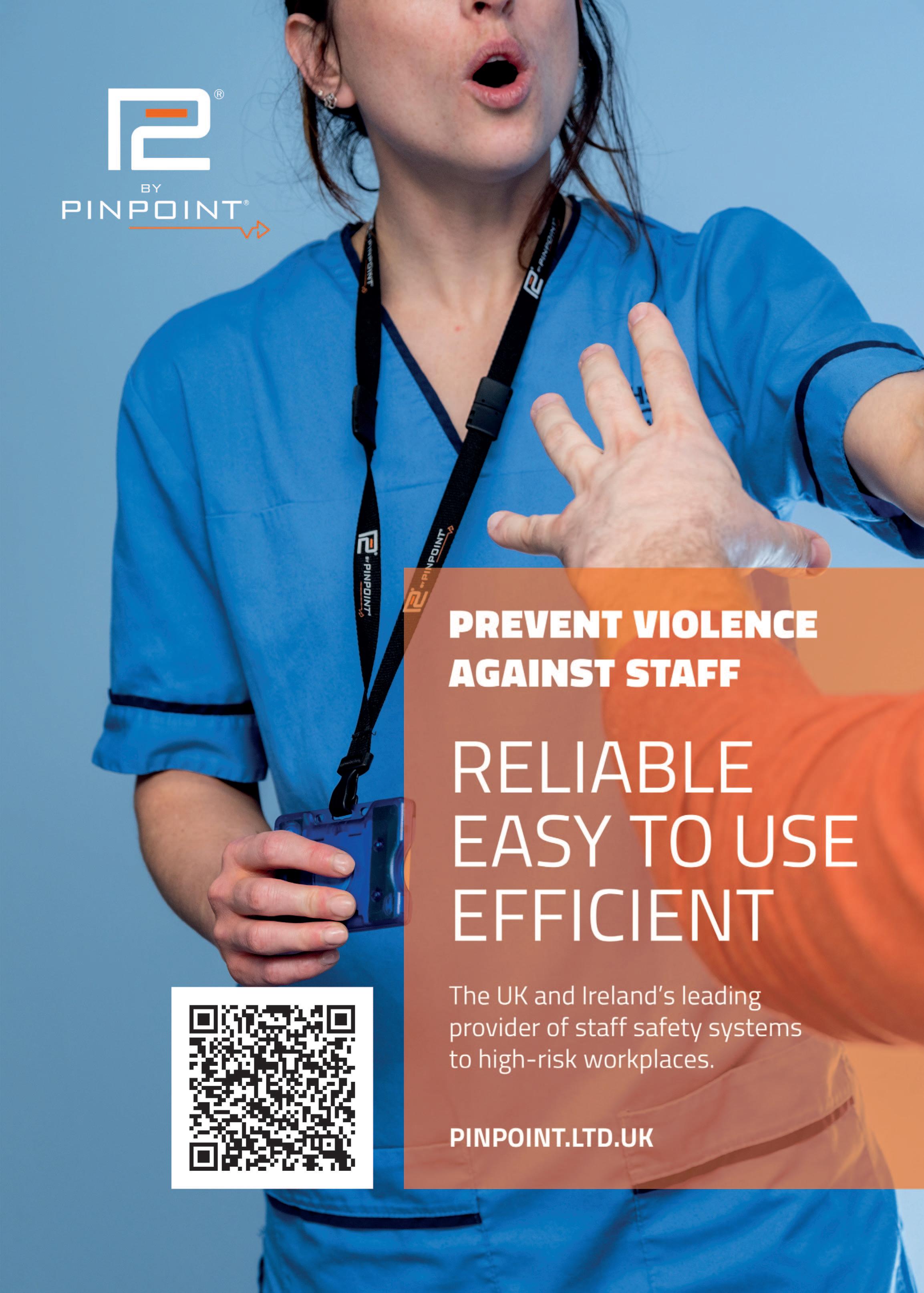
Skills for Care has published their latest findings from the Social Care Workforce Race Equality Standard (SC-WRES).
The SC-WRES improvement programme is designed to support social care organisations to achieve anti-racist workplaces. It requires participating local authorities to report data on nine indicators which compare the experiences of people from minoritised ethnic backgrounds to white staff. The improvement programme also requires participants to develop action plans based on the findings and produce their own local authority report. 76 local authorities participated in the improvement programme in 2024. The data from the responding local authorities represents 97,900 staff: 58,600 staff working in adult social care and 39,300 in children’s social care.
The findings of the report suggest minoritised ethnic staff are significantly more likely to experience a disadvantage across most of the SCWRES indicators compared to their white colleagues.

THE DATA SHOWED THAT STAFF FROM A BLACK, ASIAN AND MINORITISED ETHNIC BACKGROUND WERE:
• less represented in the highest pay bands than their white colleagues, with just 14% in the higher pay band of ‘£70,000 and over’ compared to the ‘less than £30,000’ lower and ‘£30,000 to £69,000’ middle pay bands (18% and 22% respectively)
• 48% less likely to be appointed from shortlist than staff with a white ethnic background
• 37% more likely to enter a formal disciplinary process than staff with a white ethnic background
• 8% more likely to enter the fitness to practise process than staff from a white ethnic background
• 21% more likely to leave during the last 12 months than staff with a white ethnic background
• 45% less likely to be in senior manager roles than staff with a white ethnic background.
Oonagh Smyth, Skills for Care CEO, said: “The social care workforce is one of the most ethnically diverse in England, yet we still see such poor representation in leadership roles and in higher pay bands, as is highlighted by this latest SC-WRES report.”
“The SC-WRES improvement programme is a crucial step towards enabling us to address these issues and build truly equitable workplaces. The programme creates a space and framework to help have honest conversations that create meaningful change and support genuinely antiracist workplaces.”
“Each year, as the number of organisations participating in the SCWRES grows, we’re able get a clearer understanding of the inequality present in our sector. As the programme continues, we’ll see even more comprehensive action plans being developed and implemented that lead to better experiences and outcomes for people from minoritised backgrounds.”
Beverley Tarka, Skills for Care Board Member, said: “The SC-WRES data is a critical source of insight for our sector that helps support evidence-based decisions, making our sector a fairer place to work.”
“As the latest report shows, adult and children’s social care still has a long way to go before it could be considered equal or anti-racist. People from Black, Asian and minoritised ethnic backgrounds are not only significantly less likely to be shortlisted for opportunities or receive higher salaries but are also considerably more likely to experience disciplinary and other negative processes during employment.”
“What I find really useful about the SC-WRES, is that it is a continuous improvement programme that encourages staff engagement, leadership action, sharing and supporting peer to peer learning and implementation of change through action plans.”
Swallowcourt hosted its annual conference and employee awards ceremony at the Penventon Hotel in Redruth, Cornwall.
The ‘Heroes Awards Ceremony’ is an annual event held to celebrate all staff and colleagues and the dedication and hard work that goes into making the Swallowcourt care homes better places for all residents.
Based in Cornwall, Swallowcourt Care Homes operates six homes for the elder care and those with learning difficulties, located in picturesque settings across the county.
Over 110 nominations were received for the six award categories that included Newcomer of the Year, Frontline Care Giver, Best Supporting Role, Inspirational Leader, Demonstrating Excellence and Outstanding Contribution.

“It was a fabulous event and an opportunity to celebrate the dedication, compassion and excellence shown by our team members,” commented Alex Davies, Group Marketing Manager. “Congratulations to all our winners and finalists, you are an inspiration to us all!”
Nominations were made by employees, residents and their friends and family and nominees were shortlisted based their demonstration of values, overall performance and conduct. The highest scoring nominees were then invited to a final round of interviews with the judging panel. The awards event was attended by over 60 colleagues from across the Swallowcourt group, including members of the Senior Management Team and representatives from Support Services.
Winners of the awards were Donna Mullikin (Newcomer of the Year), Leticia Palmer (Frontline Care Giver), Gilly Taylor (Best Supporting Role), Phaedra Gridley (Inspirational Leader), Julie Whitaker (Demonstrating Excellence) and Cora Wherry (Outstanding Contribution).
Phaedra Gridley, who won the Inspirational Leader award said: “I was so surprised to win the award. It is a great feeling to be recognised for the job I love doing. I work with an amazing team who all work hard to help our residents live full and happy lives.”
A host of health and social care courses delivered by leading training provider Realise have received the new Quality Assurance Care Learning Services (QACLS) endorsement.
The Department of Health and Social Care (DHSC) has taken on responsibility for reviewing the quality of individual courses and qualifications delivered by training providers within the sector.
Realise submitted 11 of its health and social care programmes to be quality assured – and all received the stamp of approval, including the Level 2 Adult Social Care Certificate.
Funding for health and social care qualifications is now provided through the Government’s Learning and Development Support Scheme (LDSS), which has replaced the Workforce Development Fund.
From April this year, only courses and qualifications delivered by training providers that have been QACLS endorsed will be identified as preferred options by LDSS. And from next year onwards, employers will only be able to claim LDSS funding for courses that have been quality assured.
Care providers currently have to replace almost a third of their workers each year due to staff leaving their jobs. This high turnover has a negative impact on the quality of care - and the DHSC hopes the QACLS endorsement will help boost retention.
Lesley O’Connor, Head of Strategic Development at Realise, said: “We are absolutely delighted to be one of the first training providers to achieve endorsements across a wide range of courses.

“This new system marks a step-change for the industry as it means, for the first time, individual courses are being reviewed rather than the training provider as a whole in an attempt to drive up standards.
“The approval process was thorough, looking at evidence of quality of delivery, testimonials, achievement rates and policies.
“Being QACLS endorsed is very important as it demonstrates quality and also allows employers to continue to claim LDSS funding. Soon employers will have to pay the full price for programmes that are not endorsed.
“We look forward to working with employers who can benefit from quality assured training.”
The QACLS endorsement lasts for three years, with regular monitoring every six to nine months.
Realise will strive to have all its health and social care programmes approved through QACLS during phase two and three of the process. Phase two runs from now until the end of the 2025-26 financial year, and phase three follows immediately after.
The Government says it is "fully committed to a professional, well supported social care workforce" with learning, development and training that is "of outstanding quality, relevant and accessible".
The full list of Realise’s 11 quality assured courses are: Level 2 Certificate in Understanding Autism, Level 3 Certificate in Understanding Autism, Level 2 Adult Social Care Certificate, Level 2 Certificate in Understanding the Care and Management of Diabetes, Level 2 Certificate in Falls Prevention Awareness, Level 2 Certificate in Understanding Nutrition and Health, Level 3
As Dementia Action Week approaches, we’re supporting professional carers, looking after increasing numbers of people with dementia. Day in, day out, we provide emotional advice and practical support to family carers, as they cope with the challenges of dementia care. Those challenges don’t stop when a loved one moves to a care home. They change.
And what many families tell us is, they would like better support from the professional carers they meet.
In fact, of the 1,300 family dementia carers who responded to our 2023 survey, only one third agreed that paid carers understood their needs. This is worrying, given the best possible person-centred care is only possible through working in partnership with families
With estimates of the number of professional carers receiving dementia training as low as 29%1, it could be that some carers just don’t have the training or practical experience to support families well. But most care homes invest in regular dementia training, and a host of other professional requirements. Despite this, many families are not confident about paid carers’ understanding of dementia. Only around a quarter (27%) of our 2024 survey respondents said that paid carers had a ‘good understanding of dementia and dementia care2
So, what could you do differently to ensure your busy, committed and hard-working team have everything they need to support residents and families with the care and compassion you’d want?
Well, whilst you’re busy arranging shift patterns, cover, inspections, visits and the rest, it’s easy to overlook problems with the current basic
By Satya Cashman, Partnerships Manager for national charity Dementia

1. Dementia has so many presentations, and no one prognosis, affecting every person differently. To provide high-quality, person-centred care for people with dementia, you need a wide range of knowledge from a broad practice base.
2. Staff churn is challenging for any care business. But all too often, staff move on because they don't feel confident or supported by low-quality training, when they do face those challenging situations.
3. It’s tough getting carers together for a whole or half day of training. Arranging shift patterns and cover, transport from other sites, or managing sickness and emergencies.
At Dementia Carers Count, we understand the pressures you face and the genuine commitment you have to your residents. As a dedicated charity, our mission is to improve support for anyone caring for someone with dementia. That’s why we’ve developed short, regular interventions, delivered live by trainers with experience and insight, to help your staff understand all the dimensions of expert dementia care for your clients and their families.
Our 90-minute format minimises disruption to your schedules, while maximising learning outcomes. These focused sessions share genuinely useful knowledge in an accessible and engaging way. And as all our CPD accredited training comes from years of experience supporting carers, you can feel confident you’re your staff will learn from the very best.
What’s more, proceeds from our training go to our work for family carers across the UK. When you work with us, you're supporting your team and your local community.
To speak to Satya and find out more about training– and receive a 30% discount when you enquire before Dementia Action Week – visit www.dementiacarers.org.uk/DAW
The Social Care Institute for Excellence (SCIE) is proud to announce that its Chief Executive, Kathryn Smith, has today, 13 May 2025, received her Officer of the Order of the British Empire (OBE) medal at a prestigious investiture ceremony held at Windsor Castle.
Kathryn was awarded the honour for Services to Social Care in His Majesty The King’s New Year Honours List 2025, recognising her long-standing dedication and leadership in social care since 1989.
Kathryn attended today’s ceremony with her family, where she was formally presented with the OBE medal in recognition of her outstanding contribution to social care over three decades, including roles in both the voluntary and statutory sectors.
Since joining SCIE as Chief Executive in 2020, Kathryn has led the organisation through a period of transformation, advocating for innovation, co-production, and

evidence-based practice in the improvement of care and support services.
Reflecting on the ceremony, Kathryn said: “It was a privilege to attend Windsor Castle today and receive this honour. I joined the sector to make a difference, confident that I had something valuable to contribute. Over that time, I have worked in a range of roles all connected by a common purpose: to improve lives.”
“While the OBE is awarded to me personally, I see it as a tribute to everyone who works tirelessly in social care, especially the people who draw on care and support, their families, carers, and the dedicated workforce.
I feel incredibly proud to be part of a sector that, despite immense challenges, continues to be driven by compassion, resilience, and determination.”
“This recognition only deepens my commitment to working collaboratively across the sector to ensure social care is not only respected and understood but properly resourced and prioritised for the future.”
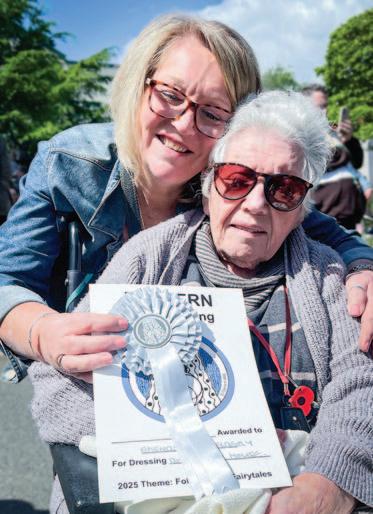
Charity’s Care Homes Win Silver Honouring C.S. Lewis At The Malvern Water and Well Dressing Festival
For this year’s Malvern Waters and Well Dressing Festival, the care teams at Friends of the Elderly’s Malvern-based Davenham, Perrins House and Bradbury Court, the residential, nursing and dementia care homes which are collectively known as Friends of the Elderly Malvern, have been awarded Silver for all their hard work transforming the historic Davenham ‘St. John’s’ Well in to an enchanted, mystical fairytale vista.
“In keeping with this year’s Festival theme of Folklore and Fairytales, we decided to honour C.S. Lewis’ world famous book The Lion, The Witch and The Wardrobe in our Well display,” said Jo Bennett, the General Manager at Friends of the Elderly Malvern.
“C.S. Lewis, who was, evidently, known as ‘Jack’, had a strong link to Malvern as he attended Cherbourg House Preparatory School and then Malvern College. Legend has it that the Victorian gas lamps in Malvern, especially those in Great Malvern, are what inspired the famous lamp post references in ‘The Lion, the Witch and the Wardrobe’," continued Jo. “So we thought it only fitting that our display this year should make reference to his world famous 1950 fantasy novel.” Friends of the Elderly’s Activity Coordinators, Tina Ellenton, Laura Smith and Selena Whittaker, kept their creative green fingers busy with this year’s display and also revitalised last year’s stunning Lady Davenham floral statue who features in the Well showcase. “Given this year’s link to Narnia, we called Lady Davenham ‘The White Witch’ as she fits so well with our overall fairytale display,” said Tina Ellenton, the Activity Coordinator at Davenham.
From 3rd to 11th May, Friends of the Elderly Malvern is opening its iconic iron gates and welcoming visitors in so they can see the care homes’ beautiful grounds and the beautifully decorated famous Davenham Well, which is also known as St. John’s Well. “The Well is located at the front of Davenham Residential Care Home and is instantly visible to visitors as they pass through the early 20th Century Art Nouveau style gates and walk past The Gate House,” continued Laura Smith, the Activity Coordinator at Bradbury Court. “Visitors will also be able to see our very own dragon, which is on top of The Gate House who will be welcoming everyone into our very own fantasy Narnia-land.”
“All the visitors will also be able to see the English Heritage Blue Plaque on Davenham’s gate dedicated to Charles Dyson Perrins of the famed Worcestershire Sauce - Lea & Perrins - which celebrates the historical link between Friends of the Elderly Malvern, a notable figure of the past and the building where he lived,” added Selena Whittaker, the Activity Coordinator at Perrins House.
“Creating ‘The Lion, The Witch and The Wardrobe’ Well display has been a big a Friends of the Elderly Malvern family affair,” added Jo. “The residents, their relatives, clients from Malvern Day Care Service and our care teams all got crafty and creative, designing and making lovely sustainable bunting as well as environmentally friendly intricate leaves and beautiful flowers which adorn the Well.”
“The Well is quite unique,” continued Laura. “It has an ornamental bronze well head, with a spout and basin, and the beautiful Well Festival decorations have turned it into a sight that even Mr Tomus and Aslan would be proud of.”

Friends of the Elderly Malvern also has two hidden secrets – a sunken water garden and grotto which are also located on the grounds. “Both the sunken water garden and grotto date back to the first decade of the 20th Century when Charles Dyson Perrins lived here and he engaged Gardener, James Pulham, to landscape the grounds,” added Tina.
This is the fifth time Friends of the Elderly Malvern has entered the Festival and, in the past, the decorated Well has won Silver and Bronze awards. “This year, we have another Silver award to add to our collection,” continued Jo. “The residents, clients from Malvern Day Care and the care teams worked so hard, meticulously and diligently on the decorations, it’s wonderful to receive a Silver award as it’s a lovely thank you and ‘Well’ done to everyone for all that they have done and achieved.”
The Malvern Waters and Well Dressing Festival runs from 3rd to 11th May and visitors will also be able to enjoy a variety of tasty refreshments which will be available to any visitors who wish to explore the grounds.
“Everyone at Friends of the Elderly Malvern is excited to be part of this year’s Festival and we are looking forward to welcome visitors and friends – both old and new – to see our beautiful and tranquil grounds, The Narnia inspired Well and historic buildings,” Jo concluded.
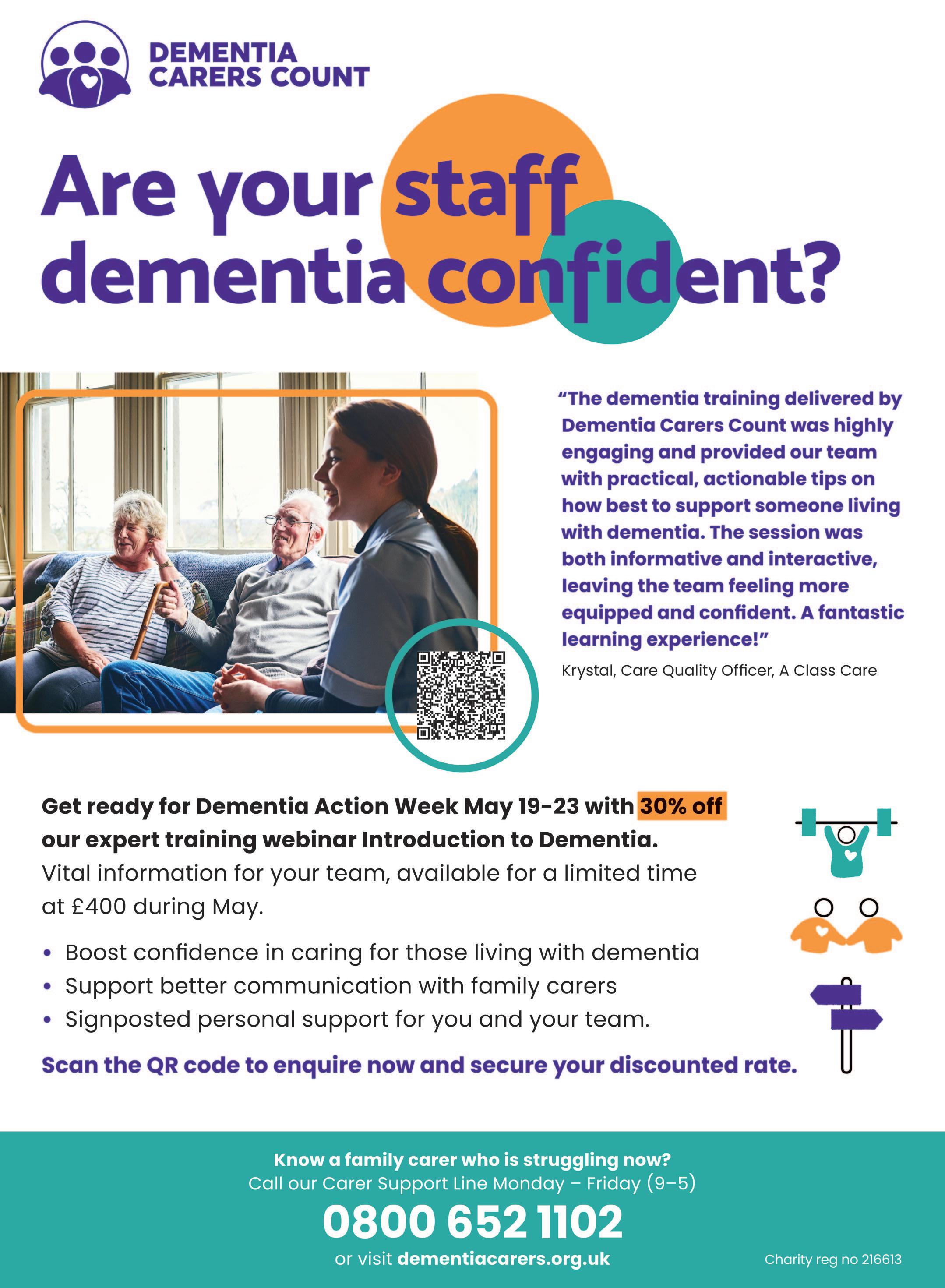

Unlike many healthcare solutions that require expensive subscriptions or complicated apps, MiCode has been designed to be:
• Affordable: At just £2 per month or £20 annually, MiCode is accessible to individuals, families, and care organisations.
• Easy to use: No apps, logins, or complicated passwords—just a simple scan with any smartphone.
• Practical for real-world emergencies: Whether at home, in a care facility, or traveling, medical and emergency details are always accessible.
MiCode can be seamlessly integrated into daily life, making it a 昀exible and convenient tool for those receiving care, their families, and professional caregivers.
• Wearable options: MiCode can be worn as a bracelet, pendant, or keyring, ensuring it is always available in an emergency.
• Mobile integration: MiCode can be displayed on a mobile phone screen for instant access.
• Cards and stickers: Ideal for placement in wallets, on mobility aids, or in homes, ensuring carers and emergency responders can retrieve information immediately.
• Clothing and pre-printed items: MiCodes can be integrated into uniforms, lanyards, and ID badges, making them particularly bene昀cial for care home residents and individuals prone to wandering or confusion.
Unlike many digital health systems that require Wi-Fi, apps, or login credentials, MiCode is designed to work instantly with any smartphone camera. This makes it particularly useful for those who may not be comfortable with technology or who need a reliable, always-accessible solution.
For family carers, MiCode provides invaluable peace of mind. If something happens and you are not present, you can trust that 昀rst responders will have all the necessary information to provide the best possible care and contact you immediately.
For professional carers and care companies, MiCode ensures:
• Faster emergency response – Information is available instantly, without the need to search through 昀les or records.
• Improved communication between care teams – Every carer and responder has access to the same critical information, ensuring consistency in care.
• Reduced risk of medication errors – MiCode provides real-time medication details, preventing dangerous mistakes.
• Lower operational costs – At just £20 per year per person, MiCode is an affordable alternative to complex digital health record systems.
MiCode is already being adopted by care homes, assisted living providers, and NHS services, contributing to a safer and more ef昀cient care environment.

MiCode Can Save Lives
Emergencies happen when least expected. Being prepared can mean the difference between life and death.
For families, MiCode offers reassurance that their loved ones are protected, even when they are not around.
For carers, it is a simple, affordable, and lifesaving tool that ensures 昀rst responders and healthcare providers have immediate access to accurate medical information.
For care companies, it is a scalale, costeffective solution that enhances patient safety, reduces risk, and improves communication between care teams.
And for those who rely on care, MiCode is a lifeline—ensuring that in any emergency, help arrives quickly, accurately, and ef昀ciently.
MiCode isn’t just technology; it’s a way to empower you, the carer, and protect the ones you love.
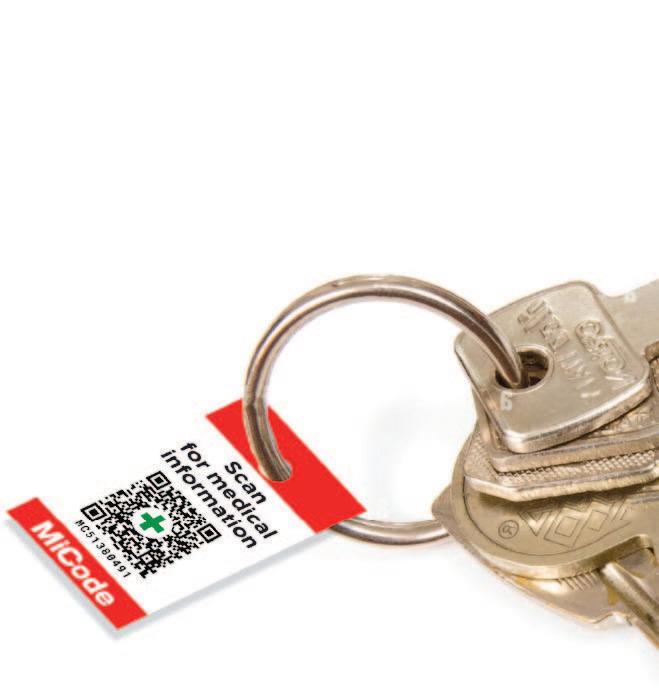
Learn more and 昀nd out how MiCode can bring peace of mind to your caring journey at micode.uk.
View an Explainer video for Carers at https://tinyurl.com/cr6mu8cd
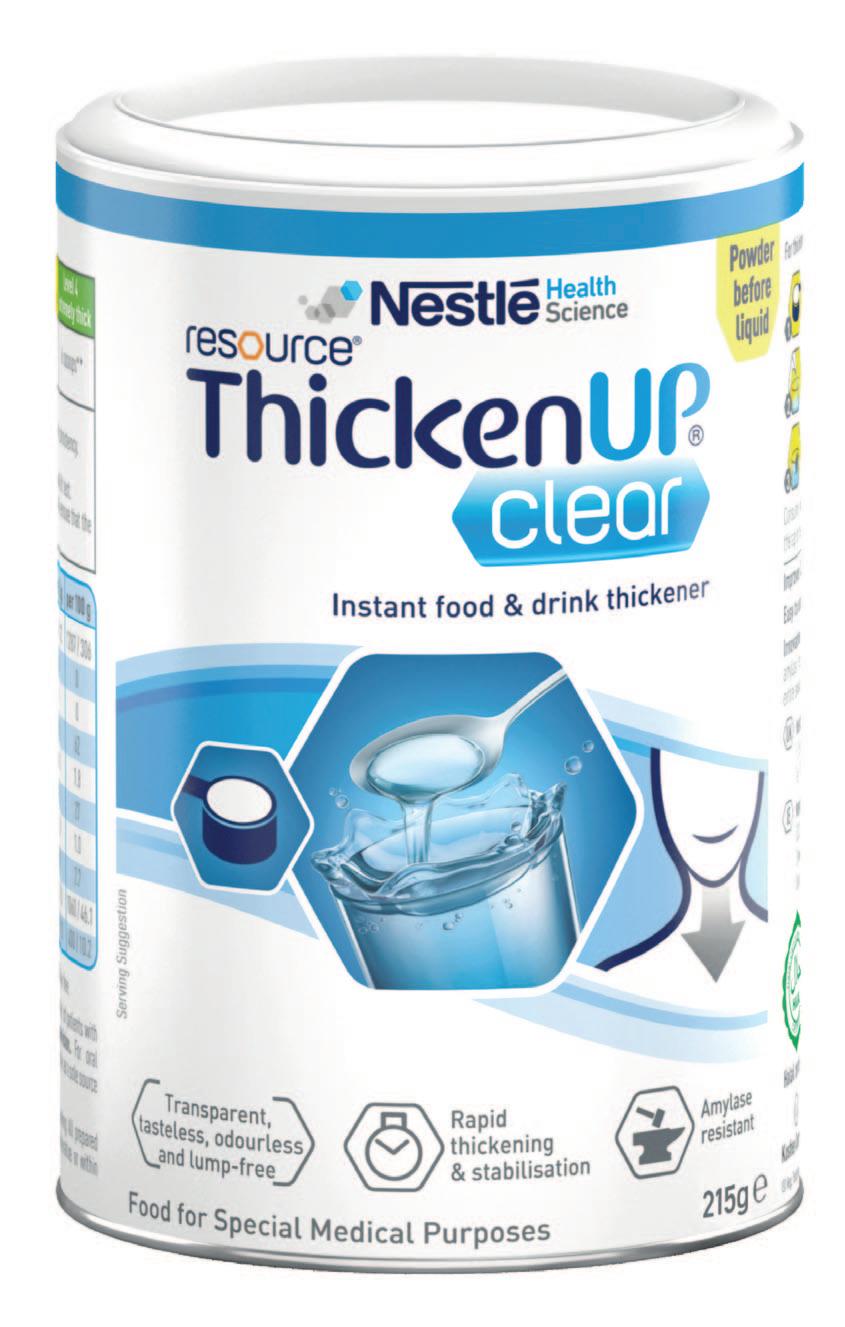


A family business has launched the UK’s first frozen nutritional supplement, ideal for care home residents who may be struggling to eat or drink.
icesupp are 100% plant-based frozen supplements, enriched with key vitamins, minerals, protein and calories, delivered in ice lolly formats to provide an easy-to-consume source of nutrition.

Amy Smith and her partner Robert Upton got the idea when they realised the lack of options for Amy’s father Ray as he struggled to build and maintain his weight during bowel cancer treatment.
Managing a conventional diet was very difficult, and the nutritional supplements available on prescription were unpalatable - too thick and sickly. However, Ray did discover that ice lollies were soothing and easier to consume.
“We were frustrated that the ice lollies Dad was having were just filled with sugar and water, and didn’t provide the nutrition and quality calories that he needed to keep his weight and strength up,” says Amy.
“The idea for icesupp was born – and it became our mission to create something that would combine the nutritional elements of a supplement shake with the more palatable form of a soothing iced refreshment.”
BAPEN’s Malnutrition and Nutritional Care Survey (2023) highlighted that nearly well over half (48%) of adults screened across UK health and care settings were at risk of disease-related malnutrition. This was particularly high amongst individuals with cancer, gastrointestinal conditions respiratory conditions, frailty and neurological diseases – so this is a very real issue for carers and families across the UK.
Following two funding rounds, Amy and Rob worked Reading University’s Food Science Department and a team of specialist advisors including top dietitians, an oncologist and a GP to create their unique, first-tomarket products, which come in two flavours – Mango & Passionfruit and Mixed Berries. 100% plant-based, each 86ml supplement pouch contains 5g of protein, 2.5g of fibre and 150 calories -
helping those who are struggling to eat to build strength and energy. A box of 12 products costs £23.75 from icesupp or Amazon. The products are shipped in ambient liquid form to be conveniently frozen then deliver the soothing sorbet-like iced consistency.
Nick Dutton, of Primrose Bank Care Home, says: "Helping those we care for to maintain and increase their nutritional intake is no easy task, made even more challenging when coupled with other dietary requirements, palliative care needs and the general challenges the care sector faces.
“When we came across icesuspp we were interested straight away. Having seen our own relatives struggling to eat well during palliative care and facing malnutrition and knowing the difficulties faced with different nutritional supplements and changing taste, we knew that a different way to deliver nutrients and flavour was a great idea.
“icesupps taste really good and we have had brilliant feedback from everyone in the home, residents, families and staff alike. We love that they are easy to store and also easy to eat without needing lots of preparation to make them enjoyable like some ONS.
“It’s great to have another tool for our team to use to improve our residents’ lives."


Amy concludes: “We have created an iced supplement that soothes and nourishes, helping to provide a moment of refreshing relief for those in need. Our goal is to help families like ours, who have experienced the devastating effects of dramatic weight loss and malnutrition, which can impact anyone, however those that are particularly at risk include those with an illness like our Dad such as cancer, and those aged over the age of 65, especially if they are in a care home or have been recently admitted to hospital.”
Dietitian Corrine Toyn says: “Malnutrition can be caused by range of factors. In the case of Ray, it was the side effects of the illness and his treatment, which is very common – but we know it is a real issue in care homes, along with dehydration. Oral nutrition supplements have been part of the solution to malnutrition for a while, as long as patients find them palatable and are compliant, but the majority of the ‘ready to drink’ supplements are highly concentrated, with a thick consistency that can be difficult to consume. Improving the flavour, mouth-feel and variety is vital to prevent patients’ taste fatigue, provide choice, and ultimately improve their quality of life. icesupp is such a brilliant idea, created with love and expertise, to respond to a real problem. It’s been incredible to see the reviews from customers, saying that icesupp tastes great and is easy to consume.”
For further information, email info@icesupp.com or visit the website at www.icesupp.com
Heathcare professionals can access the sample service at www.icesupp.com/pages/the-healthcare-professionals-hub
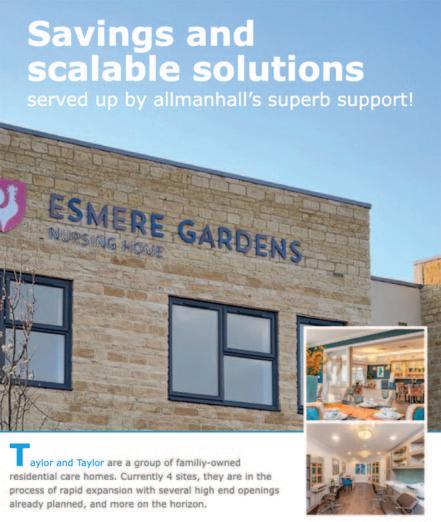
Taylor & Taylor, a group of family-owned residential care homes approached food procurement experts, allmanhall to achieve scalable cost savings and efficiencies to support their growth plans. They needed to ensure no detrimental impact to the excellent quality of their food offering and their residents’ dining pleasure.
Their desire was to achieve a 5% food cost saving and to ensure ongoing effective management of catering budgets and invoicing. Operationally, access to reports and insights were key, as was ease of ordering and management of stock and deliveries.
allmanhall undertook a like-for-like benchmark and identified achievable food cost savings of 11.4% - more than double the initial objective!
allmanhall delivered tech demos of the catering control platform for Taylor and Taylor, ensuring it met their needs and provided training for the team. As well as providing useful operational functionality like stock taking and standing orders, the catering control platform proposed would also give access to management reports and facilitate central billing and conversion of all supplier invoices in to 1 per month. Samples and on-site supplier meetings were also arranged on behalf of the homes, to confirm that the quality was to the required standard.
allmanhall have also supported Taylor and Taylor with the launch of a community engagement event for one of their newest homes.
A few months into the contract, the actual results were found to be an 18% food cost saving! You can watch this short video on You Tube to find out more… www.youtube.com/watch?v=e2QrrmaiG1Y
“From day 1, the care and attention provided by allmanhall has been exceptional. The team truly listen to us, to what our challenges are and are always willing to help in any way they can. Their approach is thorough and responsive, meaning we feel fully supported. Everyone we’ve met from allmanhall has been hands-on, down to earth, genuine and considerate.
We’ve been impressed by the savings we’ve already seen, the flexibility regarding suppliers and by the excellent quality. The consolidation of invoices into 1 per month is a huge win.
We have relationships and contact with people across the allmanhall team – all there to help and to advise or resolve depending on what we need. With challenges around labour shortages and food inflation, this is hugely valued. It frees up the team and gives us peace of mind.
We would wholeheartedly recommend allmanhall’s services to others in the care sector and look forward to continuing to grow our offering and provide outstanding food for our residents, with allmanhall as our trusted partners.”
allmanhall is an owner-managed, award-winning and trusted food procurement partner for care organisations across the UK. We help clients with a range of needs, including cost savings, administrative efficiencies, supplier management, dietetics and nutrition support, and sustainability goals. Get in touch to find out more:
Email: hello@allmanhall.co.uk
Telephone: 01225 745520
Website: allmanhall.co.uk
LinkedIn: @allmanhall



Ensuring strict hygiene standards in care homes is a complex yet essential task, particularly when it comes to laundry processes. With infection control a top priority, operators must comply with stringent regulations, including CQC guidelines and WRAS Category 5 requirements. The latter classifies care environments as high risk due to the potential contamination of water supplies, necessitating specialist equipment and backflow prevention measures to safeguard residents and staff. Failure to meet these standards can not only compromise infection control but also lead to regulatory penalties and reputational damage.
Laundry plays a critical role in infection prevention, yet many care homes still rely on domestic machines that are not fit for purpose. Unlike commercial alternatives, these machines do not achieve the necessary wash temperatures, cycle durations, or thermal disinfection standards required to remove harmful pathogens effectively. This not only increases infection risks but also puts facilities at risk of non-compliance. Furthermore, improper segregation of laundry—such as mixing soiled items with general loads—can accelerate the spread of infections, a concern that has only intensified in recent

years. Best practice guidance advises that care homes implement a clear separation of clean and contaminated laundry, supported by colour-coded processes to avoid cross-contamination.
Forbes Professional, an expert in commercial laundry solutions, advises care home operators to invest in WRAS-approved, commercial-grade washing machines and sluice systems designed specifically for healthcare environments. Miele’s hygiene-specific functionality, for example, ensures that thermal disinfection is achieved within every cycle, offering protection against bacteria and viruses. Additionally, hot water feeds, appropriate drainage, and compliance with Category 5 backflow prevention are crucial in preventing contamination. With evolving compliance requirements and the ever-present risk of infection outbreaks, care homes need to ensure that their laundry operations are fully up to standard. Forbes provides expert guidance and tailored site surveys to help care operators navigate these challenges, ensuring their facilities remain both compliant and safe for residents and staff alike.
We have recently set up a specialist facility in St. Neots, near Cambridge, in which we are going ahead with this specialist refurbishment programme. This programme involves purchasing existing machines, and replacing the parts on them, so that they are as good as new, whilst retaining the look and feel that existed before, but with a massively increased lifespan, and a warranty on the machines that’s as good as a warranty on a new machine to go with the refurbishment too.
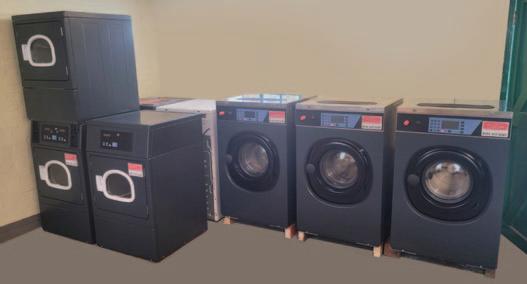
Our refurbishment programme in our specialist facility includes stripping down the machines, and giving them a check-over, to see which parts, if any, can be carried over the refurbishment. Lavamac will only carry over the highest-quality parts from the machine from pre to post
info@laundrytec.com www.lavamac.eu
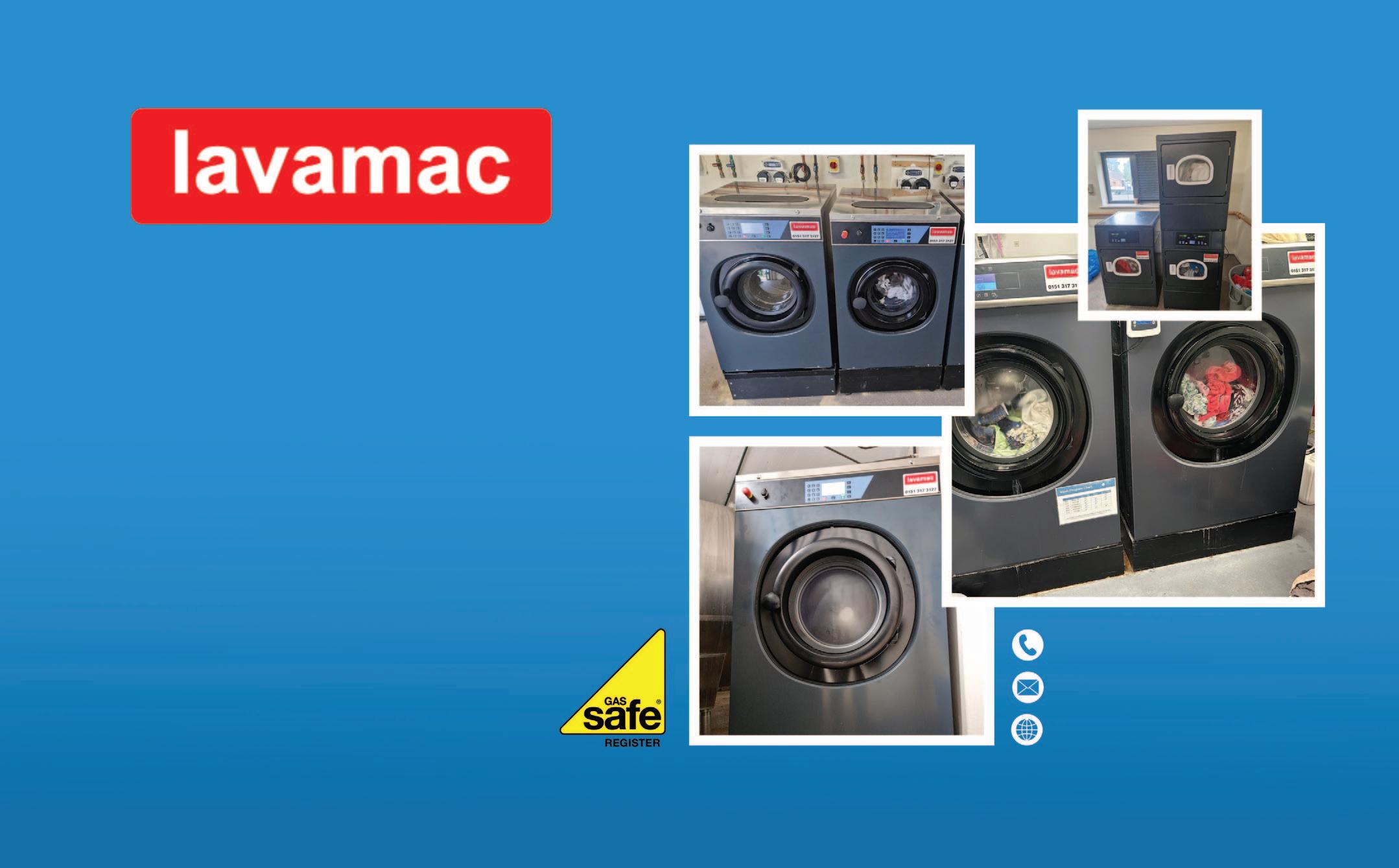

At Little Islands, we understand the power of nostalgia in bringing comfort and joy to care home residents. Familiar surroundings, evocative sights, and meaningful sensory experiences can unlock treasured memories, sparking conversation and connection. For years, we have been crafting bespoke themed rooms and areas that do exactly that—transporting residents back to fond moments in their lives. However, bespoke designs often come at a premium, making them inaccessible for some care homes.
That’s why we have developed a range of standard themed packages, making it easier than ever for care homes to create high-quality, engaging spaces that foster reminiscence. Many homes have the capability to build themed areas themselves but sourcing appropriate and authentic content can be a challenge. Too often, well-intentioned efforts result in spaces that feel more like children’s play areas rather than immersive environments tailored for adults.

Our themed packages take the guesswork out of the process. Each package includes everything needed to transform a space, allowing your maintenance and care staff to set it up with ease. Most homes already have suitable furniture and decorative items to complement the theme, but we also offer optional extras to enhance and expand each setting as required.
Whether it’s a traditional British high street, a 1950s tearoom, or a classic seaside retreat, Little Islands’ thoughtfully designed themes ensure that your residents can enjoy a truly meaningful and immersive
Since our founding in 2010, Activities to Share has been dedicated to enhancing the lives of those in care by providing thoughtfully designed activity products. Our mission is to support activity coordinators in delivering uplifting, engaging experiences that foster connection, joy, and well-being.
We achieve this by listening closely to your feedback and evolving with your needs. Whether over the phone, via email, WhatsApp, or Live Chat on our website, our team is always ready to offer advice and help you find just the right products to bring your ideas to life.
While we embrace the convenience of technology to expand our resources and share knowledge, we remain firm believers in the irreplaceable power of sensory
experience. By stimulating multiple senses in a focused direction, these environments help trigger happy memories, encourage social interaction, and improve overall well-being.
With our themed packages, creating an engaging reminiscence space has never been easier or more affordable. Let’s bring back those cherished moments—together.
Our S.M.A.R.T. Room packages include:
Unique
• Traditional flame effect stove (For H&S the heat element is
• Double sided railway wall clock
• Themed Railway game and jigsaw puzzle
• Interior design Specification sheet
Contact us today on 01282 869802 or via hello@littleislands.org to discuss how we can help transform your care home.
See the advert on page 5 for more information.


engagement. That’s why we continue to make our Reminiscence Kits and Sensory Bags with real, tactile items that stimulate the senses. Some experiences—like popping bubbles for the splash, breathing in a familiar scent, or piecing together a puzzle with others—simply can’t be replicated on a screen. These sensory moments are invaluable in encouraging storytelling, sparking memories, and fostering conversation.
Our values remain rooted in this commitment to meaningful connection. We’re here to partner with you—the professionals on the front lines of care—to create a sense of structure, well-being, and fun for those who need it most.
Are you longing for your activity diary to be full? Look no further www.activitiestoshare.co.uk are here for you! See the advert on page 21 or: customers@activitiestoshare.co.uk
0117 966 6761 07900 6751 50
MOWOOT II – proven solution to chronic constipation without medication
Developed by a team of doctors and other healthcare professionals, MOWOOT II performs gentle abdominal massage to speed up intestinal passage in people experiencing chronic constipation.

Clinically proven, safe and effective, relaxing and side-effects free, MOWOOT II Abdominal Massage Therapy System combats constipation and provides soothing relief to affected people. Easy to use and comfortable, the MOWOOT II treats and manages constipation in people with spinal cord injuries, multiple sclerosis sufferers, Parkinson’s Disease patients and people with constipation related to prescription medication. MOWOOT II also helps to relieve idiopathic constipation experienced by menopausal and post-
menopausal women and older and elderly people. In clinical studies MOWOOT II increased evacuation frequency, softened stools, improved regularity, reduced gasses, relieved bloating and eased off abdominal discomfort. 10 to 20 minutes daily of relaxing abdominal massage with MOWOOT II rapidly reduces symptoms of constipation.
Evident results are experienced only a few days after the first treatment. Regular abdominal massage with MOOWOOT II ensures lasting health benefits and better quality of life.
MOWOOT II – effective solution to chronic constipation for better quality of life!
Supplied by Win Health Medical Ltd - 01835 864866 - www.win-health.com See page 3 of this issue for other Win Health products. MOWOOT II for Constipation Free Life
REM have been manufacturing furniture for the Hair & Beauty Sector for over 100 years and are now considered to be one of the largest manufacturers in both the UK & Europe. Our exclusive designs and meticulous British workmanship offer customers a wide range of furniture for every conceivable Salon environment. Understanding the growing requirement for Care & Residential Home Salons the REM Design Team have produced the Pendle Care range for the small, compact Care Home Salon. This new range includes ergonomically designed, height adjustable styling chairs and

the Pendle Easy Wash Unit with two ceramic basins allowing frontwash with wheelchair access and a tilting backwash basin for the more able clientele. Should the need arise, our experienced Design Team can help you create a stimulating Salon environment for your clients. The REM Salon Interior Design Package which includes 2D and 3D AutoCad plans and visuals can be ordered for only £295 +VAT and is fully refundable on an order placement of £3000 or more. Contact us on 01282 619977 or email sales@rem.co.uk See the advert on page 17 for details.
The Oxford Up is an active manual stand aid, supporting assisted standing, seated transfers, and patient rehabilitation. Suitable for clients who require some assistance when standing but are able to participate and contribute effort to the process, the Up can also be deployed as a useful rehabilitation aid.
With a safe working load rating of 200kg (31st), the Up quickly disassembles into three separate components, significantly easing storage requirements and onward transportation. Reassembly takes a matter of seconds, and its ready for use again.

A large multi-point push handle aids manoeuvrability for the caregiver, and the foot push pad pro-
vides a means of generating forward momentum when moving a patient. Optimum positioning of the swing-away seat pads and knee support help ensure comfort for the patient. Adjustable leg opening allows closer access around furniture, promoting improved patient positioning and general ease of use. Additionally, the enclosed footplate ensures no accidental foot or toe entrapment associated with mechanical components.
Where additional seated support is required, the Oxford Deluxe Standing sling (With Clips) is fully compatible with the Up and available in three standard sizes: small, medium, and large. For more information including how and where to purchase, please contact the Oxford customer services team on 0344 811 1158 send an email to info@joerns.co.uk or visit our website at www.joerns.co.uk
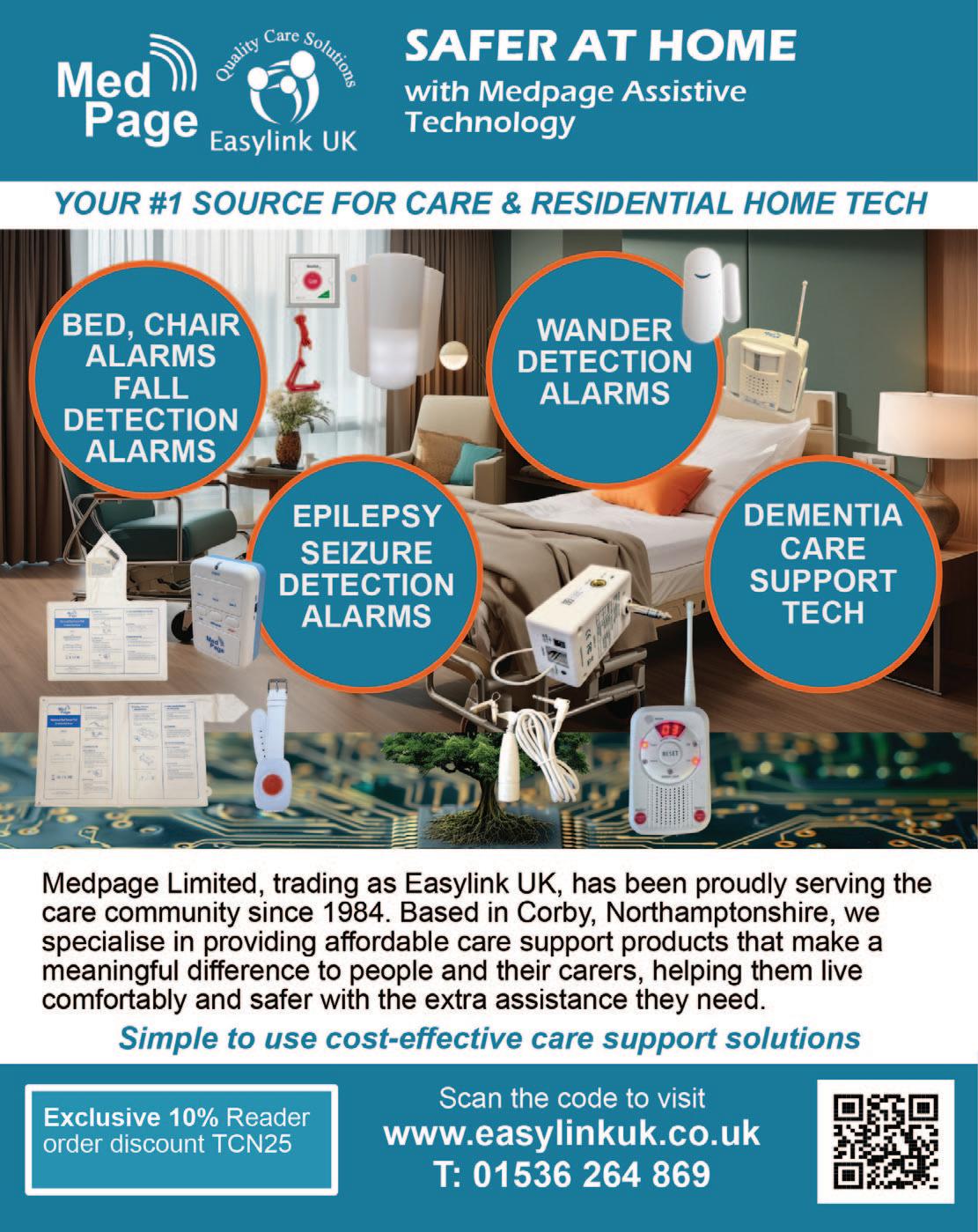
Falls are a significant concern for vulnerable individuals, especially seniors and patients at risk. Medpage, a leader in assistive technology, offers a range of cuttingedge products designed to enhance safety and provide peace of mind for caregivers and families. Here’s an indepth look at some of their standout solutions: MPRCG1 (2023) BED LEAVING DETECTION ALARM WITH CAREGIVER RADIO PAGER

The MPRCG1 is a comprehensive system tailored for fall prevention in domestic, commercial, and NHS care settings. This all-inclusive kit includes a bed pressure mat sensor, a BTX21-MP alarm sensor transmitter, and an MP-PAG31 radio pager. The system is designed to alert caregivers when a patient leaves their bed, reducing the risk of falls. Key features include: Wireless Alerts: Notifications are sent to the caregiver’s pager via tone or vibration.
Customizable Alarm Delays: Options for instant, 15-minute, or 30-minute delays.
Durable Design: Antimicrobial and disinfectantresistant materials ensure longevity.
• Ease of Use: Minimal installation required, making it user-friendly and portable.
HDKMB2 HOSPITAL DISCHARGE KIT FOR FALLS RISK PATIENTS
The HDKMB2 is a thoughtfully curated kit aimed at supporting patients transitioning from hospital to home care. It includes essential tools to mitigate fall risks and promote recovery. This kit is ideal for caregivers seeking a comprehensive solution to enhance patient safety during the critical post-discharge period.
CMEX-21 MULTI-PORT WIRELESS SENSOR INPUT EXPANDER FOR NURSE CALL CONNECTION
The CMEX-21 is Medpage’s latest innovation, designed to integrate seamlessly with existing
nurse call systems. This multiport expander allows for the connection of multiple wireless sensors, enhancing the monitoring capabilities of healthcare facilities. Its versatility makes it a valuable addition to any care environment, ensuring timely responses to patient needs.
RON-WC2 WATERPROOF DISABLED PULL CORD ALARM TRANSMITTER WITH WIRELESS ALARM RECEIVER
The RON-WC2 is a robust solution for disabled individuals requiring immediate assistance. This waterproof pull cord alarm is ideal for use in bathrooms and other high-risk areas. Paired with a wireless alarm receiver, it ensures that help is just a pull away. Features include:
• Waterproof Design: Suitable for wet environments.
• Wireless Connectivity: Reliable transmission to the alarm receiver.
Ease of Installation: Simple setup for quick deployment.
WHY CHOOSE MEDPAGE?
Medpage’s commitment to innovation and quality is evident in their product range. Each solution is designed with the user’s safety and convenience in mind, making them a trusted choice for caregivers and healthcare providers alike.
By investing in these advanced fall prevention tools, families and facilities can create safer environments for those at risk. Medpage continues to lead the way in providing practical, reliable solutions that make a real difference.
For more information, visit Medpage’s official website or contact their team to explore these products further. Safety starts with the right tools, and Medpage delivers just that.
www.easylinkuk.co.uk T: 01536 264 869

Courtney Thorne, a long-standing innovator in healthcare communication systems, is setting new standards in the care home sector with its advanced wireless nurse call technology—designed to improve resident safety, enhance staff efficiency, and support a more responsive care environment.
With over 30 years of experience serving the UK healthcare market, Courtney Thorne’s systems are now trusted by thousands of care homes nationwide. Unlike traditional hardwired solutions, their wireless nurse call systems offer non-invasive installation, scalability, and smart analytics—making them ideal for both new builds and retrofit projects.

“At the heart of our technology is the belief that better communication leads to better care,” says Graham Vickrage, Managing Director at Courtney Thorne. “Our wireless systems not only
reduce response times but also empower staff with the tools they need to deliver safe, person-centred care.”
Care providers are increasingly choosing wireless systems for their flexibility, reliability, and cost-effectiveness. With a full suite of accessories—including neck pendants, door monitors, fall detection, and bed sensors—Courtney Thorne systems can be tailored to meet the specific needs of each home and resident.
In an industry where compliance, safety, and staff pressures are always front of mind, Courtney Thorne provides more than just products—they offer ongoing support, training, and a commitment to innovation that helps care homes future-proof their operations.
For more information or to book a free demo, visit www.c-t.co.uk or contact
Blaucomm’s Nurse Call Messaging Service (NMS) is the market leading solution to remove the dependency on noisy nurse call panels and pagers, through its intelligent software, which delivers the alerts straight to the care staff who need them.
Care homes are rapidly introducing smartphones for digital care planning and eMar - now, the same devices can be used to receive the nurse call alerts they need for the residents under their care.
Furthermore, Blaucomm NMS is deeply linked into Person Centred Software MCM, so call bell data is linked straight to care plans. This unlocks a huge benefit to care homes to enhance the staff performance with how they accept and respond to residents, which ultimately pro-
motes better response times and visibility for management to audit their performance.
The best part is that Blaucomm NMS links into your existing nurse call system - we work with all major brands such as Aidcall, ARM, Courtney Thorne, C-TEC, ENS, Intercall, Medicare, SAS and TeleAlarm.
Care operators are constantly recognising Blaucomm NMS for its reliability and dependability to their care operations, which is why we’ve been chosen time and time again over other solutions.
Head of IT Trudi Harrow at WCS Care had this to say about Blaucomm NMS:
“We find Blaucomm is a genuinely fantastic company with a reliable product. "We would highly recommend this to anybody who wants to replace expensive pagers and silence those annoyingly loud nurse call screens!”
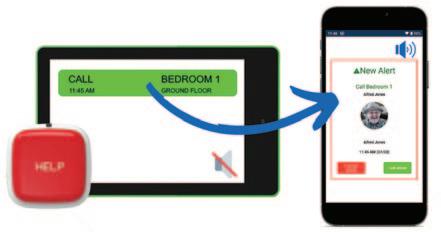
To find out more about Blaucomm NMS, visit www.blaucomm.co.uk/healthcare
See the advert on the front cover for more details.
Fall Savers®, are an experienced market leading healthcare provider of resident safety solutions for over 15 years.
FALL SAVERS ® WIRELESS MONITOR
Eliminate all cables with our new generation falls management solutions!
Upgrade your falls programme with the latest technology from Fall Savers®. The NEW Fall Savers® Wireless eliminates the cord between the monitor and sensor pad. This results in less work for nursing staff, improved safety for patients and reduced wear and tear on sensor pads. Wireless advantages include the ability to use one monitor with two sensor pads simultaneously and support for many new wireless devices.
BENEFITS INCLUDE:
Safer for patients; less work for staff

Bed and chair pads available
One monitor works with two sensor pads Integrates with most nurse call systems
A variety of options, including: Call button Pager Floor sensor mat Wireless door/window exit alerts
TREADNOUGHT ®FLOOR SENSOR PAD
The TreadNought® Floor Sensor Pad is built to last with a durable construction that far out lasts the competition. Our anti-bacterial floor sensor pad is compatible with most nurse call systems or can be used with a portable pager to sound an alert when a person steps on to the sensor pad. Caregivers typically place the sensor
pad at the bedside, in a doorway or other locations to monitor persons at risk for falls or wandering. An optional anti-slip mesh reduces the potential for slippage on hard surface floors.
FEATURES INCLUDE:
Connects directly to most nurse call systems
High Quality anti-bacterial Floor Sensor Pad
Large Size Pad: Measures (L) 91cm x (H) 61cm
Options (sold separately):
Anti-slip mesh for hard surface floors

See the advert on this page for further details or visit www.fallsavers.co.uk.
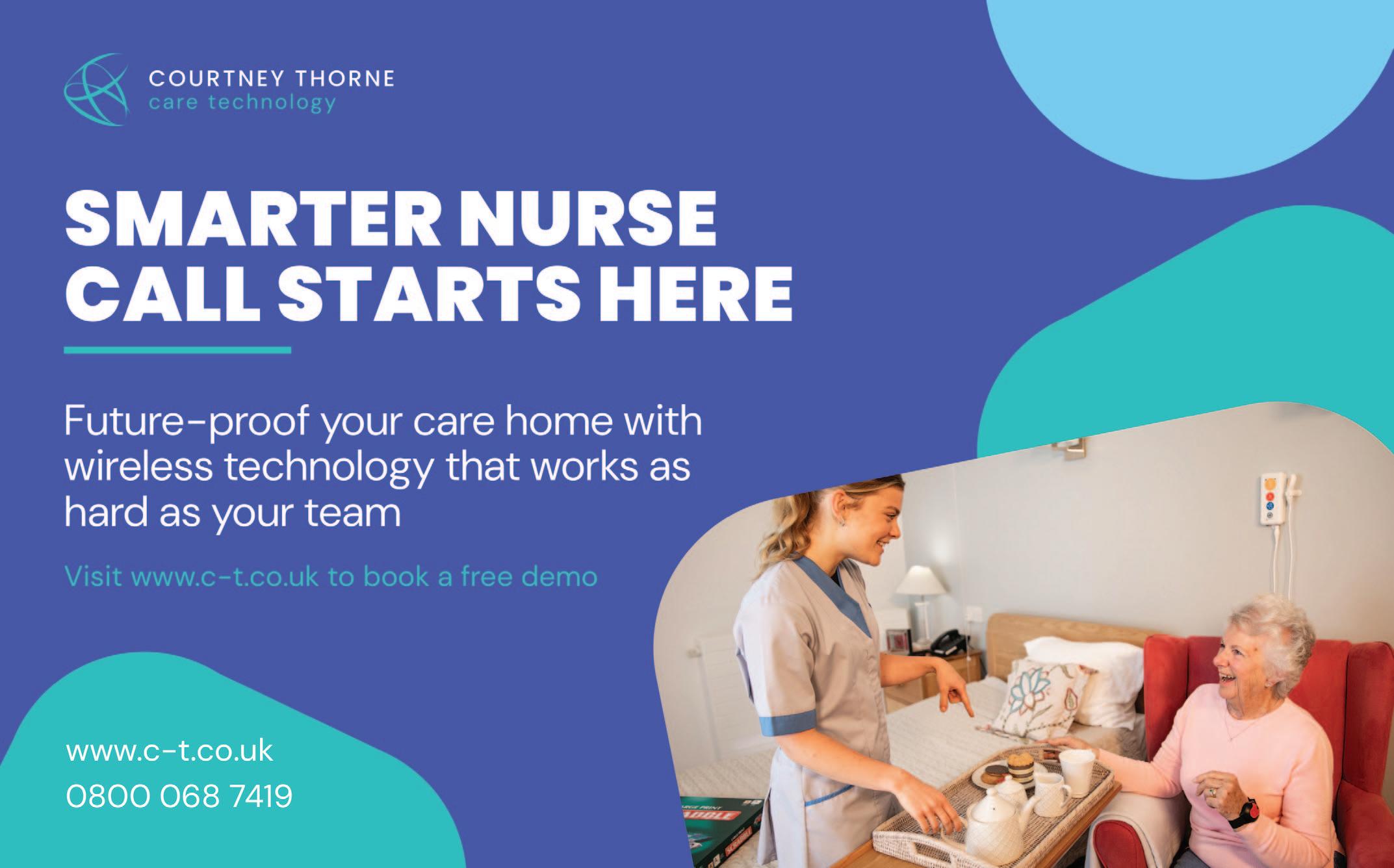
Cyber security is an increasing concern in social care, with data breaches, phishing scams, and cyber attacks putting sensitive information and essential services at risk. However, learning about cyber security can often feel overwhelming, full of jargon, and difficult to apply to everyday situations. That’s where the Digital Care Hub’s new Cyber Game comes in—an engaging, interactive way for adult social care providers to learn vital cyber security skills.
Learning doesn’t have to be dull. In social care, where training is essential but time is scarce, gamification—using game-like elements such as quizzes, rewards, and interactive challenges—makes learning more engaging and memorable. It provides a safe space to learn and make mistakes, increasing engagement, motivation, and knowledge retention. Gamification also allows for instant feedback and supports long-term behaviour change, making it an effective tool for cyber security training.
THE FIRST-EVER CYBER GAME FOR SOCIAL CARE
The Digital Care Hub has launched the first-ever Cyber Game designed specifically for adult social care providers. It offers a fun and practical way to learn about cyber security and data protection, helping care managers, care workers, and other staff members develop the skills they need to keep their organisation safe.
The Cyber Game takes players through real-world scenarios relevant
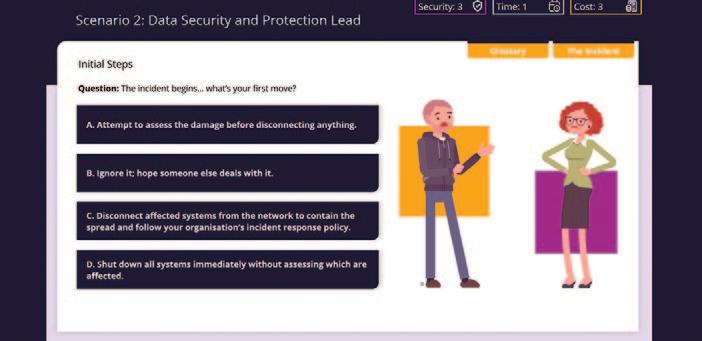
to social care settings, making it easier to recognise and respond to cyber risks in a safe environment. Whether it’s identifying a phishing email, ensuring secure data sharing, or responding to a cyber incident, players gain hands-on experience that translates directly to their work environment.
One of the biggest challenges in cyber security training is making it relatable. The Cyber Game brings cyber risks to life through realistic characters and workplace situations. Players can take on the role of a registered manager, a data protection lead, or a care worker, each facing different cyber threats.
Each scenario is based on real cyber incidents that have affected
social care providers. The goal is to manage the crisis effectively—containing the damage, notifying the right people, and implementing steps to prevent future incidents. Decisions impact security, time, and cost, requiring players to balance risk and consequences.
WHY GAMIFY CYBER SECURITY TRAINING?
Daniel O’Shaughnessy, from the Digital Care Hub, explains:
“We created the Cyber Game to make cyber security training more accessible and engaging. Gamification encourages active participation and helps staff retain information better, making learning feel rewarding and practical.”
WHAT CARE STAFF SAY
Care staff who tested the game found the scenarios helpful and realistic:
“These are good scenarios – typical and indicative of what may occur and give people an idea of what they need to be thinking about.”
Through interactive decision-making, players experience the consequences of their choices, reinforcing key lessons in a way that traditional training cannot.
TRY THE CYBER GAME TODAY!
The Cyber Game is available online, completely free to play. It’s a great way for care providers to improve their cyber security awareness in an engaging and practical way.
Play the game online at: www.digitalcarehub.co.uk/cyber-game
The delivery of safe care is the paramount responsibility of social care providers. Central to achieving this is the governance framework adopted by service providers. And at the core of this framework are policies and procedures. These enable the provider to comply – and evidence compliance –with relevant legislation and regulations, as well as facilitating best practices, supporting business needs, and assisting in recognising and managing risks.
Providers have a legal duty of care to the people they employ. Policies and procedures should provide clear guidelines to staff on how the organisation operates, as well as informing them of best practices and processes to be followed.

Policies should be reviewed annually as a minimum to ensure they are still fit for purpose and align with legal and regulatory requirements. They should be reviewed not only by
employees of the business, but also by experts in various subject matters (e.g., infection control or medicines management).
For many small- to medium-sized providers, there may not be the in-house skills, knowledge, and experience to complete such a robust annual review. Many choose instead to purchase their policies and procedures from a reputable provider like W&P Compliance & Training, who will also complete reviews and ensure their policies and procedures remain up to date. This way a provider not only ensures they remain compliant; they also benefit from best practice policies and procedures that provide a solid foundation for safe working practices and – ultimately – protect and support service users and staff. Ben Erskine – Director at W&P Compliance & Training www.wandptraining.co.uk | Tel: 01305 767104 See the advert on page 2 for further information.

Training care home staff is vital for delivering high-quality care, especially when managing complex resident needs such as dementia, frailty, and mental health challenges. However, traditional methods often fall short in engaging staff, leaving critical gaps in understanding and preparedness. Innovative approaches, such as game-based learning and peer-to-peer collaboration, are revolutionising training, particularly in addressing the ethical and legal challenges of restrictive practices.
Restrictive practices—measures that limit an individual’s freedom—are sometimes necessary to ensure safety. However, they must be applied with great care, adhering to legal frameworks and ethical guidelines to protect residents’ dignity. A groundbreaking digital training resource, co-designed by Queen’s University Belfast and Focus Games, exemplifies this innovation. The resource uses interactive, expert-driven content to help staff navigate restrictive practices responsibly and effectively.
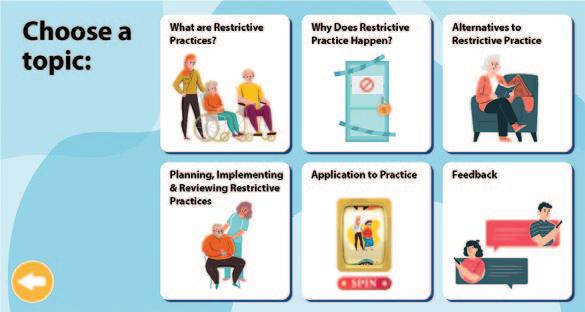
Game-based learning plays a central role, transforming topics like restrictive practices into engaging,
real-world scenarios. Simulations allow staff to explore ethical dilemmas, practice decision-making, and test alternative solutions in a safe, low-pressure environment. This approach enhances critical thinking, teamwork, and retention of essential knowledge.
Peer-to-peer learning further strengthens the training by encouraging staff to share experiences and insights, fostering collaboration and practical problem-solving. This creates a dynamic learning environment where staff feel supported and empowered to deliver compassionate care.
By integrating these modern approaches, care homes can elevate training into a meaningful experience, equipping staff to balance safety with residents’ autonomy and dignity. At Focus Games, we are proud to offer tools designed to empower care home teams through innovative training. Visit www.FocusGames.com or email info@focusgames.com to learn more about our Restrictive Practice resource and how it can enhance care home outcomes for residents and staff alike. For further information see the advert on the front of this issue
By Chris Sparling, Senior Director,

In the care industry, reputation is everything. Choosing a care facility or in-home provider is a deeply personal decision based on location, budget and individual needs. It’s also based on trust. Families rely on providers to deliver quality care, so a strong reputation is essential. In the UK, adult care homes are rated by official bodies like the Care Quality Commission (CQC) and by residents and their families. However, as the CQC undergoes reform, personal feedback and reviews have become critical in offering an unfiltered view of the resident experience.
Selecting a care facility or in-home provider is a deeply personal decision based on trust, location, budget, and individual needs. Families rely on providers to deliver quality care, so a strong reputation is essential.
EMERGING TRENDS IN THE CARE INDUSTRY
The growing reliance on authentic reviews offers facilities an opportunity to set themselves apart and offer the insights prospective patients seek. Yet, a recent research report reveals that in-home care providers average just nine reviews annually, with the top 20% receiving fourteen reviews. This indicates a gap in review engagement that providers can turn into an opportunity.
The difference between a trusted care facility and a questionable
one often comes down to how effectively a provider manages its reputation. Managing various listings and online reviews can weigh heavy on a facility with stretched resources.
ENCOURAGING AUTHENTIC REVIEWS
The true measure of reputation comes from the experiences shared by current and former residents and their families. Proactively soliciting feedback is powerful - 22% of the public report they leave reviews when asked. A steady flow of fresh feedback prevents outdated sentiment from impacting perception. In a market with such high demand for care home places, this could have serious consequences.
Reviews need to be managed and cultivated as part of continuous improvement within customer service, as they’re one of the primary indicators of quality.
BUILDING TRUST WITHIN THE COMMUNITY
It is important that reviews are managed transparently, so providers can build trust with their current and future patients. The same report found that top-performing care providers respond to over 80% of reviews, while the industry average lags at 68%. However, these numbers drop significantly for negative reviews, which is a missed opportunity.
Acknowledging both positive and negative feedback is crucial for building credibility. Doing this will reassure prospects that a facility is open to listening and proactively addressing concerns. Filtering reviews to exclude the negative ones presents an unrealistic image and will deter prospects evaluating whether a facility is the right one for them.
PROMOTING RESIDENT AND FAMILY SATISFACTION
Responding to online feedback is an extension of customer service quality, and many prospective patients seek this level of engagement. By providing thoughtful and timely responses, care providers can
at
increase customer satisfaction and strengthen their overall reputation.
Facilities that listen to residents and their families, and take proactive steps see improved satisfaction and stronger relationships with those they serve. Addressing negative reviews can even turn challenges into positive outcomes.
Industry leading providers are already leveraging technology to maximise the impact of online reviews. Many automate review responses, ensuring that every reviewer feels respected and appreciated. This approach also eases the pressure on internal resources by streamlining the feedback response process.
Moreover, facilities can use data from reviews to identify strengths and weaknesses, addressing areas of concern proactively. For those with smaller budgets, data-backed insights help allocate funds effectively, so that the focus remains on what matters most to residents and families. Whether that’s staff excellence or a provider’s welcoming environment, marketers should highlight these strengths in their promotional materials, and use customer feedback as a way to validate them.
Care providers should embody their commitment to people-centred service in their online interactions, regardless of whether feedback is positive or negative. Reputation management is a crucial part of this commitment, as it ensures that patients feel valued and heard, while offering sought-after insights to those trying to make big decisions.
With the right tools and strategies in place, care providers can harness the power of online reviews to build trust, improve satisfaction, and build a lasting reputation that resonates with both current and future residents.

In an age where data breaches and cyberattacks are increasingly common, cybersecurity is a critical priority for all organisations, including nonprofits and charities. Protecting sensitive data—such as donor records and beneficiary details—is a round-the-clock responsibility that demands both organisation and vigilance. This is where Security Operations Centre (SOC) systems come into play, offering a powerful way to strengthen your defences, even on a tight budget. WHAT IS A SOC SYSTEM?
A Security Operations Centre (SOC) is a centralised framework—often a combination of software, tools, and processes—designed to monitor, protect, and manage an organisation’s information systems and networks against cyber threats. Whether through in-house teams or external ser-
vices, a SOC uses advanced technologies to detect, analyse, respond to, and prevent cybersecurity incidents in real-time. Why Are SOC Systems Important?
The consequences of a successful cyberattack can be catastrophic, from financial losses to reputational damage, and the risks are growing each year. Cybersecurity is no longer a one-off task but a complex, ongoing effort requiring expertise, proactive monitoring, and rapid response capabilities. For nonprofits and charities, where budgets are often stretched thin, a SOC system offers an efficient solution. It provides 24/7 network monitoring, identifies vulnerabilities before they’re exploited, and helps mitigate threats swiftly, reducing the likelihood of a breach.
BENEFITS OF SOC SYSTEMS FOR NONPROFITS AND CHARITIES
1. Proactive Threat Detection and Response: Equipped with sophisticated tools, SOCs can spot potential risks early and respond immediately, minimising damage.
2. Compliance Support: By monitoring data protection practices, SOC systems help charities meet standards like GDPR or CQC requirements, avoiding costly penalties.
3. Unified Security Management: Many SOC solutions integrate with popular antivirus and network security tools, letting you oversee everything from a single platform.
4. Scalable for All Sizes: Whether your organisation is large or small, SOC systems can adapt to your needs.
SES SOC FREE SYSTEM OFFER
SES Computers, with over 20 years of success in the healthcare sector, believes it’s time to give back. We’re excited to announce a unique opportunity for UK charities and nonprofits: free access to our Security Operations Centre (SOC) services.
No
East Cheshire Hospice plays a vital role in providing palliative care services to the community of Macclesfield and beyond. Like many organisations in the healthcare sector, the hospice needed to ensure that every pound was spent wisely and that internal processes supported rather than hindered their critical mission.
Faced with an increasing volume of invoices, a complex departmental structure, and the need for tighter financial controls, East Cheshire Hospice turned to Compleat Software for a solution. The result? Greater efficiency, full visibility into spend, and a major reduction in manual processing, freeing up valuable time and resources to focus on patient care.
THE CHALLENGE
Before adopting Compleat’s solution, East Cheshire Hospice was processing approximately 3,500 invoices each year manually. Each invoice needed to be coded, approved, and uploaded to their Sage 50 finance system. With over 35 departments, each with their own purchasing requirements, the process was time-consuming, prone to human error, and lacking in real-time visibility.
empowered budget holders to make informed, responsible decisions based on live financial data.
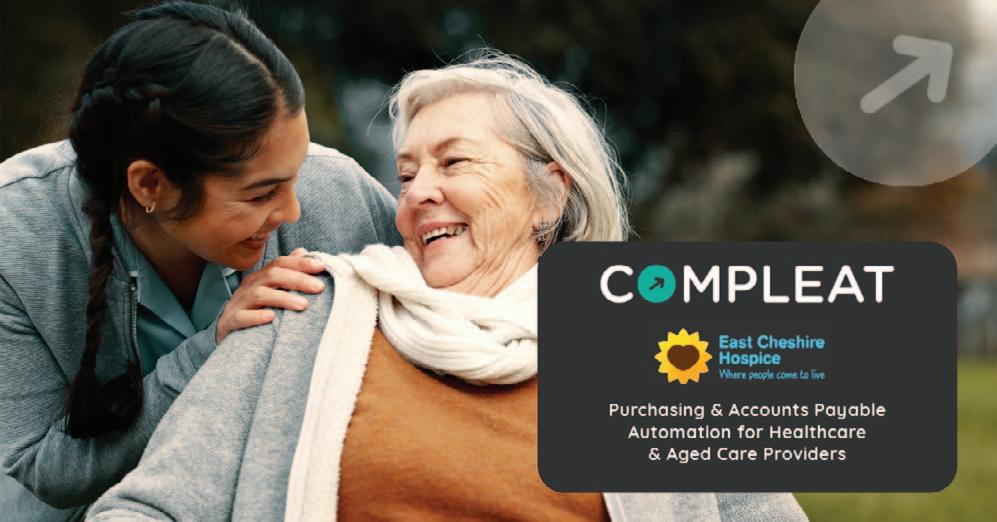
Manual AP processes made it difficult to track spending accurately, allocate costs appropriately, and ensure timely approvals. Staff often had to chase budget holders for signatures, delaying invoice processing and increasing administrative burden.
Recognising the need for a smarter, more streamlined approach, East Cheshire Hospice sought a solution that would integrate seamlessly with Sage 50, reduce manual workload, and provide better control and oversight of departmental spending.
THE SOLUTION
East Cheshire Hospice implemented iCompleat, Compleat Software’s purchase-to-pay (P2P) solution. Designed to automate AP processes while offering a simple, intuitive user experience, iCompleat ticked all the boxes.
Amazon Business was the standout feature that allowed their 45 purchasers to order supplies directly through a familiar online shopping experience, whilst maintaining compliance with internal financial controls. Orders placed via Amazon Business are automatically routed through iCompleat for approval, ensuring spend is tracked and coded correctly from the outset.
Additionally, 47 approvers across the organisation can now review and approve purchases in real-time, using any device, from any location. This level of flexibility has dramatically improved turnaround times and
From a technical perspective, the implementation was seamless. According to the Head of IT at East Cheshire Hospice:
"From an IT and budget holder perspective, iCompleat is very user-friendly and efficient to use. Raising orders and integration with Amazon Business is a great feature that I regularly use. The platform is reliable, easy to set up with Sage 50, and Compleat are always releasing new features to make it better."
The impact of AP automation has been significant for East Cheshire Hospice. By removing manual processes and digitising purchasing, they have:
Processed over 3,500 invoices annually automatically through iCompleat into Sage 50, saving hours of manual data entry.
Empowered 45 purchasers across the hospice to buy what they need quickly, without compromising compliance or budget control.
Enabled 47 approvers to review and authorise spend efficiently, with complete visibility over budgets and commitments.
Streamlined purchasing across 35+ departments, ensuring spend is correctly allocated, coded, and reported in real-time.
Instead of chasing paper trails or struggling with manual approvals, finance staff now have a clear, consolidated view of all spend across the organisation. Purchasers get the supplies they need faster, whilst budget holders can make better-informed decisions without delays.
Most importantly, the hospice can redirect the time and money saved through process improvements back into delivering outstanding patient care.
East Cheshire Hospice’s success story shows that smart, user-friendly digital solutions can make a profound difference in healthcare settings. By partnering with Compleat, they have not only improved operational efficiency but also laid a strong foundation for future growth and innovation.
In a sector where every resource counts, East Cheshire Hospice has proven that automating AP processes is not just about saving money, it is about reclaiming time, improving control, and empowering their teams to focus on providing extraordinary care.
Download Full Success Story Here

The social care sector has come a long way when it comes to digital transformation, and artificial intelligence (AI) is a big part of its future. While AI is still finding its place in many care settings, the impact it can have is huge.
Here’s a closer look at why AI is set to make waves in social care:
1. BOOSTING EFFICIENCY
AI can help handle those resource-draining tasks in seconds. Whether it’s crunching a mountain of data, summarising care notes, or suggesting next steps, it frees up your team to do what they do best.
It can also improve communication, such as helping new team members quickly access policies or answer routine questions without waiting for assistance. By handling these background tasks, AI allows organisations to redirect resources to other core priorities.
2. ENSURING PERSON-CENTRED CARE
AI can support your teams when providing persona-centred care by analysing data over time, so they can build tailored plans that align with each individual’s goals, preferences, and abilities. It can even predict future needs, flagging issues before they arise so your team can act proactively.
3. ENHANCED MONITORING
Care organisations often operate round-the-clock, and AI can offer
Pass by everyLIFE
PASS supports over 1,000 care providers every day, giving them access to market leading care management tools hand in hand with unlimited 24/7/365 support from our dedicated and friendly PASS team.

Assured by NHS Transformation Directorate, PASS provides a secure platform that allows you to plan, record and evidence the care you deliver. The only assured solution built specifically for the home care sector, it provides comprehensive real-time functionality and allows you to share progress against outcomes with customisable, exportable reports.
CARE PLANNING AND ROSTERING FROM A SINGLE PLATFORM
real-time monitoring to support this. For example, AI can highlight subtle behavioural changes, like someone sleeping poorly or becoming more withdrawn. These insights can alert your teams to potential concerns early, which means better, faster decisions can be made to support your clients.
For organisations, this level of tracking ensures care quality stays high, without adding to the workload. It’s like having an extra layer of support that’s always on duty.
4. EMPOWERING TEAMS
AI is here to help empower your care teams, not replace them. AI tools can provide instant recommendations or resources, which could help your newer employees confidently manage unexpected situations. Similarly, AI can assist with summarising care notes or giving quick access to up-to-date best practices, helping your teams provide the high-quality care they work so hard to deliver.
5. OPTIMISING COSTS
One of the big wins of AI is its ability to do more with less. By automating tasks and making resource allocation more efficient, it can help organisations manage tight budgets without compromising on care.
AI can even help reduce staff turnover by easing workload pres-
To meet the wider needs of the PASS community All-in-one PASS has recently been launched , bringing advanced rostering functionality to our established digital care planning platform. As a result advanced staff scheduling, payroll and invoicing functionality is now seamlessly linked with care planning and reporting, reducing the technical complexity, risk and overhead associated with integrating two separate systems.
As a result, PASS now provides an all-in-one suite of digital care management tools, available from a single platform, designed to: Save you time
Increase the efficiency of your teams
Improve the quality of care
Deliver better outcomes

Our commitment to the continual evolution of PASS is further illustrated by the addition of GP Connect. The first product of its type to offer this feature, PASS is still one of only a handful of digital care
sures, which means savings on recruitment and training costs too. Plus, because AI solutions are scalable, it can adapt to your organisation's needs.
THE FUTURE OF AI IN
AI in social care isn’t about replacing people with tech. It’s about giving your teams the time, insights, and tools they need to focus on the people they care for. That’s why OneAdvanced AI, the first UK hosted fully secure, private AI tool for businesses, was created. OneAdvanced AI can help care providers improve efficiency, deliver person-centred care, and empower teams, all while safeguarding your data. This marks a significant step towards a more innovative and sustainable future in social care.

Find out more at: www.oneadvanced.com/ai
management solutions to have completed this NHS Digital integration, and is the only one offering it to the home care market. PASS GP Connect provides authorised social care staff with realtime access to their client’s GP records. It makes medical information available when and where it is needed, leading to improvements in both care safety and outcomes:
Visibility of allergies, vaccinations and medications, especially useful for clients unable to reliably share their personal information Using medical information to inform care planning
Ensuring that the right medication is delivered to the right person in the timeliest manner. In one case, this allowed the administration of antibiotics on a Friday evening, aiding the service user’s swift recovery from infection
Available to all PASS users at no additional cost, PASS GP Connect is significantly more efficient than waiting for a GP response. It’s also a positive step forward on the path to the DHSC’s goal for widespread digitally enabled care and is in full alignment with their ambition for joined up care for everyone.
Get in touch: www.everylifetechnologies.com hello@everylifetechnologies.com




By Fozia Iqbal, Senior Business Immigration Solicitor at

Reports of exploitation, including unfair wages and poor working conditions, have drawn increased government attention to the treatment of overseas workers in the care sector. With a critical staff shortage, many businesses depend on international recruitment to fill vacancies, adding to concerns about worker welfare.
The Home Office has intensified its crackdown on non-compliant employers, with severe consequences for those who fail to meet legal and ethical obligations. Compliance with immigration and employment laws is no longer just an administrative requirement but an essential strategy for protecting business operations, reputations, and, most importantly, the wellbeing of workers.
To hire overseas care workers legally, care business owners must navigate a complex regulatory framework. They must obtain a sponsor licence issued by the Home Office, through which they can sponsor overseas health and care workers for a Skilled Worker visa, which is the primary route for recruitment, but this visa comes with strict sponsorship obligations. Employers must make sure that all hired workers have valid visas and are working in compliance with their visa restrictions and their sponsorship. Employers would need to implement correct right to work check policies and ensure they are meeting minimum salary requirements, can provide work that meets the contractual hours of work offered, and the employees are undertaking duties which fall strictly within the role for which they have been sponsored.
Additionally, all employers must ensure that their employees’ employment conditions align with legal requirements, for instance, providing safe working environments, adequate training, and following proper recruitment procedures. Fundamentally, overseas workers must receive their full rights and entitlements such as fair pay, breaks and leave, with no discrimination. Any deviation from these standards can place a business at significant risk.
THE GOVERNMENT’S CRACKDOWN ON NON-COMPLIANCE
The UK government is taking decisive action against care providers who fail to protect overseas staff. Increased inspections and audits are being carried out, with penalties ranging from significant fines to licence revocations and outright business closures. Employers found guilty of exploitation or modern slavery
offences face criminal prosecution, and businesses that lose their sponsor licences will lose their sponsored workers and be unable to hire overseas staff in the future.
In addition to heightened inspections, the Home Office is working closely with other regulatory bodies to share intelligence and data on non-compliant practices. This collaboration enhances the government’s ability to detect irregularities and enforce penalties swiftly, ensuring that any rogue employer faces immediate consequences. Such coordinated efforts not only deter potential offenders but also reassure compliant businesses that the sector is being rigorously monitored.
This increased enforcement underscores the necessity for care home owners to maintain high standards of employment practice. Failing to comply with legal obligations does not only jeopardise individual businesses but also tarnishes the reputation of the sector as a whole.
ETHICAL EMPLOYMENT:
Beyond legal obligations, treating overseas workers ethically is a crucial element of running a successful business. Providing fair pay, ensuring reasonable working hours, and fostering a safe and supportive environment contribute to higher job satisfaction and better staff retention. In an industry where continuity of care is essential, a stable and motivated workforce is invaluable.
Ethical employment also enhances a business’s reputation. Care businesses known for fair treatment of staff find it easier to attract both workers and clients. By proactively adopting fair employment practices, organisations safeguard their operations from legal risks and cultivate a more committed and engaged workforce.
To protect your business and your staff, you should regularly review your employment practices. By conducting internal audits, training staff on compliance obligations, and seeking professional legal guidance, you can help ensure ongoing adherence to the law. Being proactive in compliance not only mitigates legal and financial risks but also encourages a positive workplace culture.
Looking to the future, it is vital for care providers to establish a culture of continuous improvement in compliance. Regular training sessions, clear communication of legal updates, and robust internal controls can help your business stay ahead of regulatory changes. Embracing technology to monitor recruitment and employment processes further supports transparency and accountability, ultimately benefiting both your staff and the reputation of your business.
As the government continues its strict stance on non-compliance, you should take immediate action to ensure your recruitment and employment processes align with legal and ethical standards. Now is the time to assess your business’s current practices, implement necessary improvements, and secure the future of your business by treating overseas workers with the fairness and dignity they deserve.
By Katarina Morgan, Associate Solicitor
at Taylor Walton Solicitors (www.taylorwalton.co.uk)

An issue which frequently arises for care home operators is when they need to make a financial claim against the estate of a deceased resident for unpaid or outstanding fees. This can be complicated if the former resident was married but most of their assets are tied up in the marital home which their spouse still lives in. Another common situation is where there are insufficient funds left in the estate and the former resident would have qualified for Local Authority funding had they survived.
To manage these situations effectively, it is best practice to maintain good records of the contractual terms agreed, of fees due and invoices raised and what is outstanding. This helps prevent parties disputing the quantity of the bills, or where executors were unaware of what had been agreed.
It is hoped the care home operator has a good rapport with the deceased’s family so they can sensitively approach them with the outstanding invoices and ask them to be included as debts of the Estate. This helps probate practitioners and will assist with debt recovery when the Grant of probate has been obtained. Thankfully in recent months it is now a faster process following the delays which built up following the Covid pandemic. If the deceased owned a property (either under marriage or not), then there may be a right to pursue the debt against their asset. It would need to be considered if they died with a Will, whether a life interest trust was created under that Will (i.e. if people are still living in the house), and how the property was
owned and how much of it was owned by the deceased, whether there is any outstanding mortgage or equity release scheme in place. It is for this reason why good contractual terms need to be set out clearly and what happens in these circumstances.
If there are insufficient funds in the Estate, then the Estate will be insolvent. This means that the debts will be paid in a certain order:
o Secured creditors: mortgages or secured loans
o Funeral expenses: reasonable and proportionate to the size of the Estate
o Testamentary expenses: administrative costs
o Preferred and preferential debts: employee wages for example (not likely to apply)
o Unsecured creditors: care home fees, bank loans, other debts
o Interest on unsecured loans
o Deferred debts: informal loans between family members
If Local Authority funding may have been available, then the administrator of the deceased’s Estate (executor or administrator) may be able to make a retrospective claim. They will have to apply to the Integrated Care Board (ICB) which is the NHS body that assesses eligibility for NHS Continuing Healthcare funding where there is a need. That person will need to contact the ICB for guidance on how to deal with previously unassessed periods of care. It is likely that this may take a number of weeks if not months to be resolved and it would likely to be challenged given the universal squeeze on public budgets. Prevention of debts building up is always the best option, but it is not always avoidable. Ultimately having good, clear contractual terms which explain what has been agreed in terms of fees and when they can expect to be recovered and how is essential for every care home operator. Each case will of course depend on its
